

£NIL ADVANCE PAYMENT

Ford C- MAX Zetec with rear parking sensors and SYNC 3 DAB Navigation System from only £Nil* Advance Payment. To find out more, visit ford.co.uk/motability o r call 0345 60 40 019.
TOGETHER WE GO FURTHER
Official fuel consumption figures in mpg (l/100km) for the Ford C- MAX range: urban 33.6 - 65.7 (8.4 - 4.3), extra urban 54.3 - 80.7 (5.2 - 3.5), combined 44.1 - 74.3 (6.4 - 3.8). Official CO 2 emissions 149 - 99g/km.
The mpg figures quoted, sourced from official EU-regulated test results (EU Directive and Regulation 692/2008), are provided for comparability purposes and may not reflect your actual driving experience.
£Nil Advance Payment available only on Ford C-MAX 1.6 125PS Petrol Manual. SYNC 3 DAB Navigation System is subject to availability. No cash alternatives are available. This programme is subject to the standard conditions of the Motability Scheme hire agreement. Full written details and quotations available on request from a Ford Authorised participating Dealer of Motability Operations Limited. Motability Scheme vehicles are leased to customers by Motability Operations Limited. Motability Operations Limited is authorised and regulated by the Financial Conduct Authority under reference number 735390. To qualify you must be in receipt of the Higher Rate Mobility Component of Disability Living Allowance (DLA), the Enhanced Rate Mobility Component of Personal Independence Payment (PIP), the War Pensioners’ Mobility Supplement (WPMS) or the Armed Forces Independence Payment (AFIP) and applications must be made with participating dealers between 1st January to 31st March 2018. Prices are correct at time of print, are subject to availability and may change.
FEATURES
14 IT’S A MANN’S WORLD
Olly Mann discovers the joys of classical music
Entertainment
24 INTERVIEW: BRYAN CRANSTON
The Breaking Bad star opens up about his troubled past
32 “I REMEMBER”: SIR ANDREW LLOYD WEBBER
We delve into the life and loves of a West End legend
Health
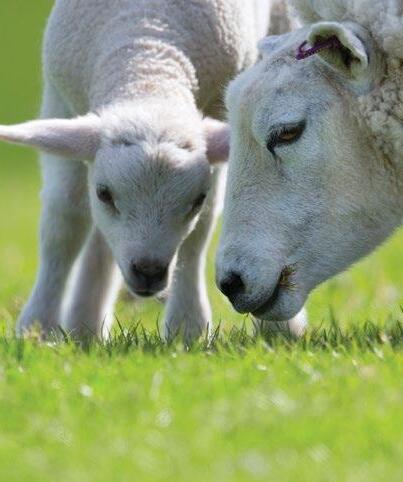
42 36 WAYS DOCTORS PROTECT THEIR HEARTS
Here’s how cardiologists and other healers beat the odds
Inspire
62 THINK LIKE A CHILD
One businessman reveals how listening to his inner child made him millions
73 SECRETS TO A SMARTER YOU
Hone your wits with our simple tips and tricks
82 BEST OF BRITISH: EASTER EVENTS
The best Easter hoppenings from around the UK
Travel & Adventure
93 A SUNSHINE STATE OF MIND
Slowing down and exploring Queensland, Australia’s holiday haven
102 WHERE THE PASTURE MEETS THE SEA
In Cornwall, old traditions give way to something new…
EDITOR’S LETTER

WITH SPRINGTIME truly upon us, here at Reader’s Digest HQ we’ve turned our minds to the subjects of renewal and revivification.
On p42 you’ll find 36 tips from top doctors and cardiologists on the everyday adjustments they make to take care of their hearts. From experimenting with meditation to getting plenty of sleep, they’re easy suggestions to incorporate into your own routine.
As well as listening to your body, we discover that it pays to listen to your inner child. On p62, Peter Woolrich meets a businessman who claims that a child-like way of thinking was the secret to making his millions.
If it’s your memory and brainpower you want to improve, we’ve made things simple. On p73 we reveal some long-established secrets that will hone your wits through the power of words, languages and mnemonics. It’s good news for our subscribers—regular reading is one of the best ways to keep your brain sharp. Enjoy the issue.
Paul Evansfacebook.com/readersdigestuk
twitter.com/readersdigestuk



Repeat Prescriptions Delivered FREE to Your Door
EDITOR-IN-CHIEF Paul Evans
SENIOR EDITORS Anna Walker, Eva Mackevic
EDITORIAL Richard Young, Jessica Summers
ART DIRECTOR Richard Cooke
ADVERTISING Jigs Pankhania, Kerry Schofield
MARKETING Sarah Hughes
Reader’s Digest UK magazine and website are produced by: SUBSTANTIVE MEDIA LTD
TRUSTED MEDIA BRANDS INC (USA)
President and Chief Executive Officer
Bonnie Kintzer
Vice President, Chief Operating Officer
International
Brian Kennedy
Editor-in-Chief, International Magazines Raimo Moysa
WE PAY...
£50 for the star letter and £30 for regular letters.
Email readersletters@readers digest.co.uk or go to readers digest.co.uk/contact-us
WE ALSO PAY...
£30 for the true stories, anecdotes, jokes in Laugh! and You Couldn’t Make It Up…, and contributions to end-ofarticle fillers and My Great Escape
Email excerpts@readersdigest.co.uk or go to readersdigest.co.uk/contact-us
SORRY!
We cannot acknowledge or return unpublished items or unsolicited article-length manuscripts. Do not send SAEs. Article-length stories, poetry and cartoons are not requested.
CUSTOMER SERVICES
Contact Customer Services for renewals, gifts, address changes, payments, account information and all other enquiries. Call 0330 333 2220* or email customer_service@readersdigest.co.uk
TALKING MAGAZINES
Reader’s Digest is also available in audio and accessible etext editions from RNIB Newsagent, for blind and partially sighted readers. Call the RNIB Helpline on 0303 123 9999 or visit rnib.org.uk/newsagent
SUBSCRIPTIONS
Visit readersdigest.co.uk/subscribe or write to: Reader’s Digest, FREEPOST: WARNERS GROUP (READ). UK: £39.99 a year. Republic of Ireland: €59.99 a year. Prices include delivery. For gift subscriptions, contact Customer Services.
RECIPES FOR AN EASTER FEAST readersdigest.co.uk

Spring-Ready
THIS EASTER, why not check out our adorable gallery of animals dressed up for the spring season? There are bashful baby bunnies in woollen hats, goats enjoying their first leaps in the sunshine and foxes taking their first sniff of the new year daffodils. Visit readersdigest.co.uk/10-baby-animals-whoare-ready-for-easter
Ace April Fools’ Day
April brings with it that long dreaded—or eagerly awaited, depending on your perspective—day of tomfoolery. If you’re in need of some April Fools’ inspiration, we’ve got you covered. From tricking your boss to cracking up with your colleagues, visit readersdigest.co.uk/april-fools for all the ideas you’ll need to be crowned the king of office pranks.


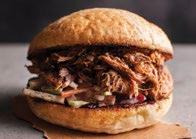


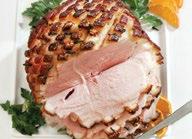
Feed the whole family with these ten Easter recipes. Visit readersdigest.co.uk/ easter-food
Can yOur diet reduCe yOur risk Of dementia and alzheimer’s?
YES
With a wealth of accessible science and 80 recipes – the expert guide to keeping your brain healthy
Out nOW

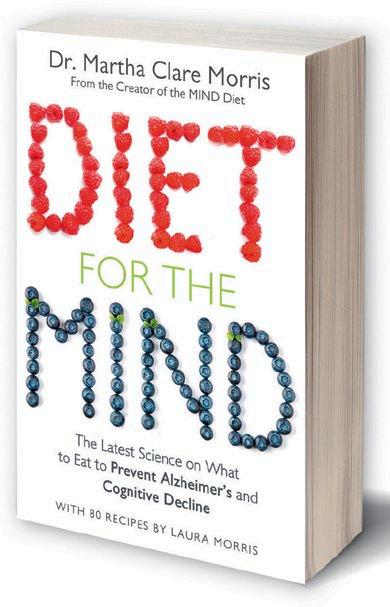

Over to You
LETTERS ON THE FEBRUARY ISSUE
We pay £50 for Letter of the Month and £30 for all others
✯ LETTER OF THE MONTH...
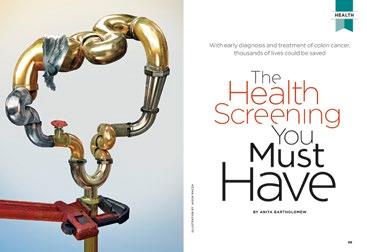
The article on screening for colon cancer was very informative. I lost my mother to this type of cancer and watching her suffer so much was heartbreaking. There are so many people who, through embarrassment or the belief that it won’t happen to them, don’t have this type of screening. We need to put aside these feelings and think of our health. If you have any of these symptoms see your doctor—your life is worth a few minutes of embarrassment. Whenever you’re offered a screening, jump at the chance.
GERALDINE MILLER, Liverpool
THE FINAL FRONTIER
Your article “Where is Everybody?” posed some fascinating questions about life elsewhere in the universe. As much of what we’ve learned about the universe has come from Earth-based observations, isn’t it possible that some advanced extraterrestrials could be observing us from the safety and comfort of their own planet?
If so, they would have seen whales that can communicate over vast distances without the need for
phone masts, bees that can keep their hives at a constant temperature without using electricity, and leaf ants that can bring home the greens without having it wrapped in oceanpolluting plastic. They would also have noticed a climate-changing primate, seemingly obsessed with war, money and celebrity.
ET may already have concluded that our planet is teeming with intelligent life—just not intelligent enough to be worth contacting.
DAVID BENNETT, StaffordshireI was almost breathless reading the article “Where is Everybody?” regarding the search for extraterrestrial life in our own galaxy and the rest of the universe. The figures and distances between our own planet and other stars were mindblowing and incomprehensible to say the least.
I would like to express our thanks to all those from the past and present who have devoted their lives to attempting to discover the many celestial secrets which are yet to be exposed.
PETER FITZPATRICK, LancashireVIKING VIBES
It was a pleasant surprise to see pictures of the Vikings parading through the streets of Shetland. The celebrations form the mainstay of Lerwick’s “Up Helly Aa” festival. It’s very carefully planned and lights up the dark winter nights experienced in the UK’s most northerly isles.
Seeing our first parade when we moved to Shetland ten years ago lives long in the memory. It was spectacular to see the town illuminated by torches, to see the colours of the costumes and feel the warmth coming from the flames on a cold January evening.
KEVIN BRIGGS, ShetlandSIGNED, SEALED, UNDELIVERED
I wasn’t surprised to read in Andy Webb’s money column that 62 per cent of us experience delivery problems, especially that 30 per cent complained about a “longer than estimated wait”. I’ve had this problem myself with a very wellknown company twice this last year, and both delays have been blamed on “items lost in transit.”
Come on, get your acts together, companies, I say. JULIE DAY, London
OPPOSITES ATTRACT?
Your “In Love and Work” article reminded me of the time my husband and I worked together. Ken bought a mobile fish and chip van and although I had a job I enjoyed, I decided to go along with the venture. Every evening we went around the estates selling our delicious food and even though we worked well together, I hated every moment.
We were complete opposites in our views about the work load, and being together in a confined space caused us to fall out big time. We never came to blows but a new assistant soon took my place, so I returned to my previous job and harmony prevailed once again!
PHILIPPA SAMPSON, Devon










SEE THE WORLD
Turn the page
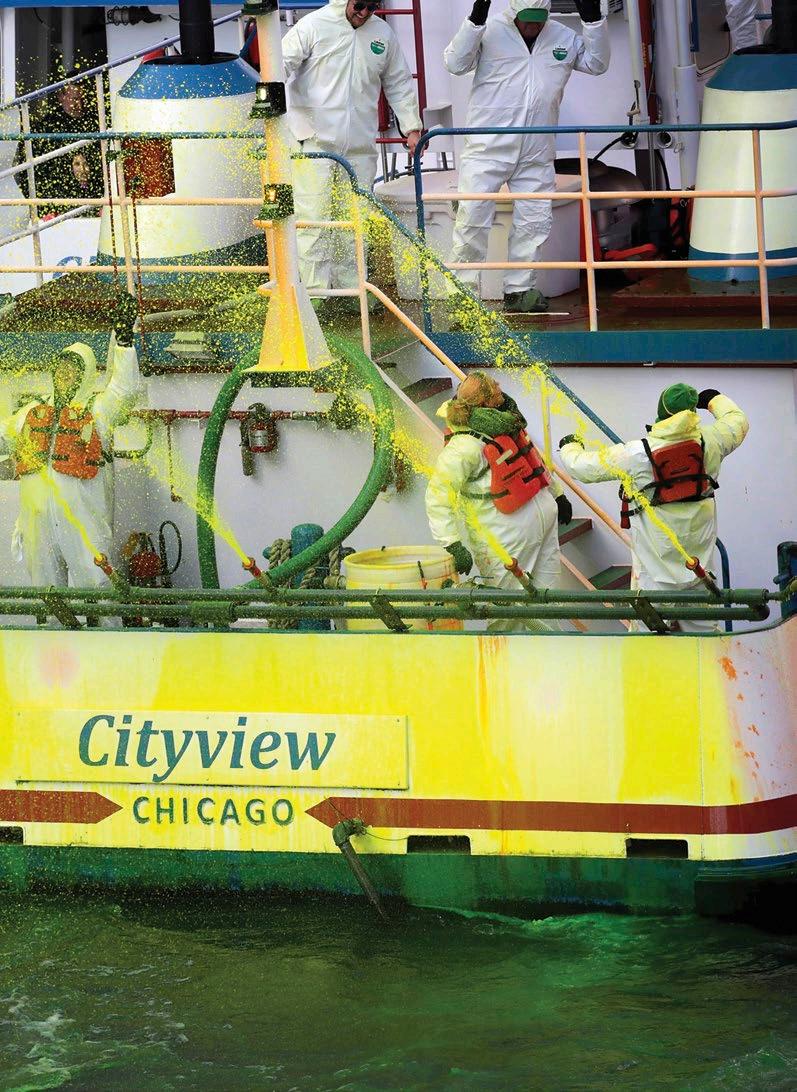


...DIFFERENTLY
Each year on the 17th of March, the Irish celebrate St. Patrick’s Day around the world. This traditional holiday was initiated to commemorate “The Apostle of Ireland,” Saint Patrick. Thanks to Chicago’s rich Irish heritage, the city even throws him a parade. But not only do the partygoers show their true colours; with the help of natural food colouring, even the Chicago River gets a full makeover. It takes about 45 minutes for the deep, rich green to fully saturate the waterways, but don’t wait too long—after about five hours the spectacular effect is washed away.
Olly Mann is surprised to discover a taste for classical music—years before he was expecting it…
Time to Face the Music

Olly Mann presents Four Thought for BBC Radio
4, and the award-winning podcasts The Modern Mann and Answer Me This!
I WOULDN’T SAY I WAS DISMISSIVE OF CLASSICAL MUSIC. It’s just that it always struck me as something I’d get around to when I’m older, like gardening, or going on a cruise. I listen to a broad range of artists: Sixties rock groups, truck-drivin’ country stars, moustachioed troubadours, sexless boybands. But, when you boil it down, they’re basically all peddling four-minute, music-and-lyrics, chorusbased pop songs. Classical music—unless you include Broadway showtunes or movie soundtracks—has never formed part of my repertoire.
This is probably because classical music was shovelled into me at school like carrots and chips. Countless teachers, stuck for ideas on wet Wednesday afternoons, filled up our music lessons by bunging on Holst’s The Planets or Prokofiev’s Peter and the Wolf for us to dissect as a listening exercise. Presumably this gave them time to open their post, but it built an unfortunate connection in my young mind between classical music and boredom and, worse, tainted the genre with the poisonous hue of “edutainment”—like the tedious ITV Schools programmes about fractions we watched in maths.
Or it could be Disney’s fault. I’m sure Fantasia was created with the best of intentions; to bring the beauty of symphonic works to children around the world via a series of captivating animated shorts, but blimey, it’s SO BORING. The dancing
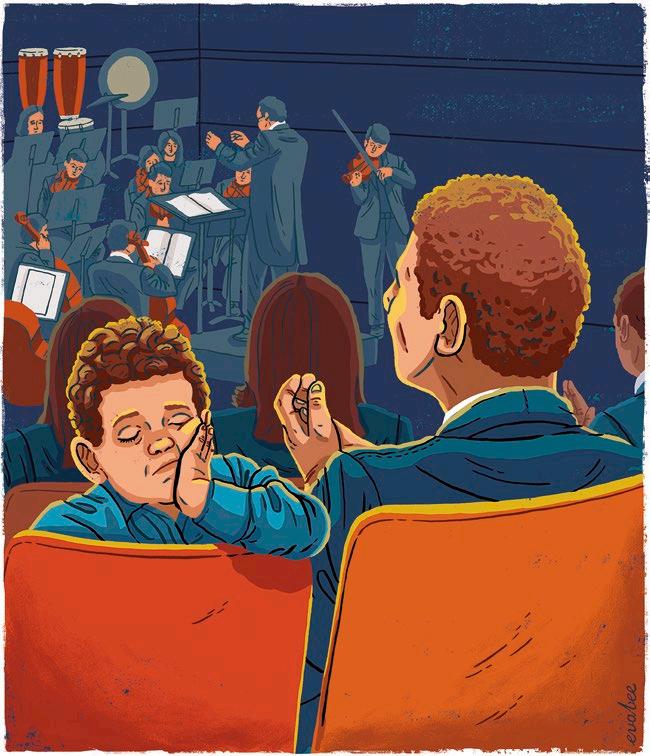
broomsticks are literally the best bit and even they’re boring because they are broomsticks.
I attended a handful of classical concerts at university, where the prevalence of music students meant
there were nightly events I could attend for a fiver. But, looking back, I don’t recall any great catharsis listening to Beethoven in the Sheldonian. Partly I was there to escape the damp in my student flat.
All I really remember is trying to get off with a flautist at an after-party. Perhaps that’s when I settled upon the notion that engagement with classical music should be paused until my dotage; that somehow the concentration required to enjoy a 30-minute movement would only be achieved once my libido had retreated sufficiently to stop me focusing on the more primal things.
For the past decade my only experience of live classical music has been at picnic concerts —the kind of events at which the Pimm’s marquee is as much of a draw as the Vivaldi, and the night ends with a rousing fireworks finale and a dash to the car park. And I was fine with that. But, out of the blue, I was recently contacted by a guy I know who works in PR, offering me tickets to see the London Philharmonic Orchestra at the Royal Festival Hall. With free drinks.
And: there were free drinks.
I was surprised by how much the performance moved me.
I only spent five minutes thinking about grocery shopping evening. This seemed a good way to sweeten the deal.)
But the concert itself was really quite fun. Obviously this was helped by the fact that we’d been given the house seats—about ten rows back in the stalls with an incredible view of everything—but I was surprised by how much the performance moved me. I only spent about five minutes thinking about grocery shopping and I definitely didn’t want to get off with the flautist.
I admit, it wasn’t really the draw of the music that pulled me in, more the glamour of the occasion and its potential appeal to my wife. (On Valentine’s Day, I’d been hosting a discussion about dating on Radio 4 while she looked after our two-yearold son. Not the most romantic
I was transfixed by the sheer scale of the 96-piece orchestra before my eyes, and the extraordinary way they all worked as one. The huge strings section, raising their bows in unison; the percussionist at the back, hovering his two drumsticks over an enormous bass drum for 20 minutes at a time, anticipating the climax. I hadn’t imagined that classical music could be an equally visual and aural entertainment—unless there are fat Italians on stage belting out arias. But it was. It was emotional, too; the solo cellist, Andreas Brantelid, interpreted Elgar’s Cello Concerto with such sensitivity that I sometimes felt like I was alongside
him in an intimate drawing room rather than a 2,900-seat concert hall.
A few conventions of the evening seemed odd to me—the lack of introduction, for a start. Unless you looked in the programme, you wouldn’t know it was Stravinsky at the beginning and Rimsky-Korsakov at the end, or anything about the context in which they were writing. Also, the business about not clapping between movements is weird. An American tourist attempted it, but
was quickly shushed by the natives. And—whilst we’re on clapping—the interminable curtain calls for the conductor. What’s that about? My hands ached from the obligatory applause. Surely applause doesn’t mean anything if you’re coerced?
But, as I left the venue that evening, I found myself thinking, I enjoyed that. I’d like to go again. Maybe not next week, but certainly next year.
Perhaps I’m just getting old.
SCENE-STEALERS
Can you guess these US TV shows from the photograph of their final scene?










At Gtech there’s nothing we like more than talking to our customers about dust and dirt, and we have learnt that it’s the one thing they definitely don’t like to touch!
The problem with cyclonic vacuum cleaners is the messy process involved in constantly having to empty them and clean the filters. Inevitably, half the dust and dirt ends up in the bin, the other half all over the floor, or worse, all over you!
That’s why we’ve reinvented the vacuum cleaner bag. Of course, being Gtech, this isn’t any vacuum cleaner bag: the Gtech Cordless Pro uses our unique triple-layer filter bag. Multiple layers keep airflow high to help maintain optimum cleaning performance as the bag fills, filters and compacts the dirt - and boy, does it take a long time to fill!







Without the complicated cyclones, screens and tubes taking up space, there’s more room for a bigger bag.
The result is the Gtech Pro holds up to 15 times more dirt than the Dyson V8!†
Imagine how much time you’ll save!
When the bag eventually fills, it seals closed and takes seconds to remove, imagine how little effort it takes.
Even better, every time you replace a bag (on average less than once a month), your Gtech Pro performs just like new! So there’s no expensive filters to maintain or replace.
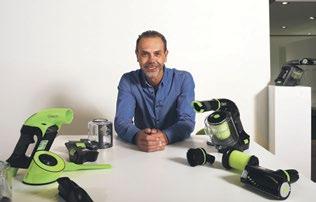






Patented† AirLOC Technology - Picks up larger debris from the floor and clean even deep crevices.






Hygienic EmptingTriple-layer filter bags trap the dust, dirt and hair from around your home, whilst the bag's tough exterior contains dust clouds when emptying.
Low Maintenance - Empty less frequently with no filters or cyclones to clean.
Lightweight - Weighs only 2.4Kg when full assembled making it easy to lift and carry up the stairs.
Storage - Store this cordless, compact vacuum with ease, whether fully assembled or as a handheld vacuum.


Value for Money - A typical household will use between 4 and 8 bags per year costing less than £10.


Films
 BY EVA MACKEVIC
BY EVA MACKEVIC
Movie of the Month
■ ANIMATION: ISLE OF DOGS Following an outbreak of supposedly incurable dog flu, Japan’s entire canine population has been exiled to nearby trash island. Suspecting something more sinister may be afoot, a savvy group of students take on the cat-loving mayor while a young boy named Atari flies to the island in search of his beloved hound, Spots. Bryan Cranston is superb as the gravelly voice of Chief, a stray who can’t help but become entangled in Atari’s plight because—as a fellow castaway astutely points out—“he’s a 12-year-old boy. Dogs love those”. With Wes Anderson’s signature heavy styling and star turns from Bill Murray, Edward Norton, Yoko Ono, Scarlett Johansson and Jeff Goldblum, Isle of Dogs is a triumph. If you’ve ever loved a dog, you will love this film.
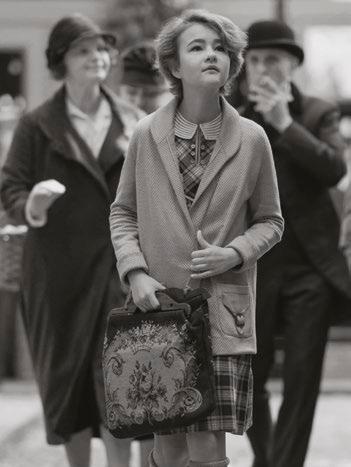
■ CRIME: ENTEBBE A gripping, if slightly wobbly dramatisation of the 1976 hijacking of an Air France flight by Palestinian radicals and the daring rescue mission that followed. Though it features solid and assured performances by Rosamund Pike and Daniel Brühl, the recurrent artsy metaphors and cinematic truisms never quite allow Entebbe to hit home.
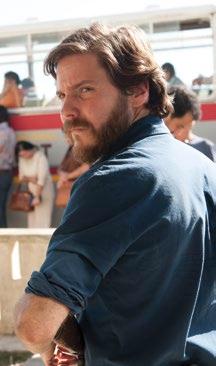
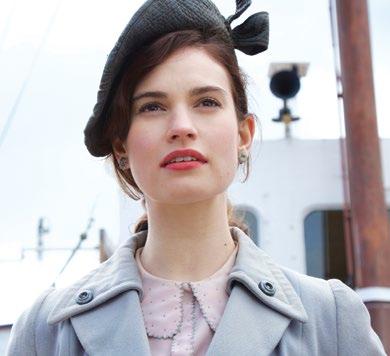
■ ROMANCE: THE GUERNSEY
LITERARY AND POTATO PEEL PIE
SOCIETY Bored by the London circuit, writer Juliette Ashton (Lily James) needs a new story to inspire her. So when she receives a letter from the mysterious Guernsey Literary and Potato Peel Pie Society detailing how the club formed because they had to hide a pig from the Nazis, she can’t resist a trip to the island. The chemistry between this character cast is magnetic. Prepare to be charmed by the island and humbled by the story of how ordinary people survived the war.
Television
BY MIKE MCCAHILL■ TALK SHOW: MY NEXT GUEST NEEDS NO INTRODUCTION WITH
DAVID LETTERMAN
What is it? Talk show titan David Letterman returns with six hour-long conversations with notable individuals. Why should I watch it? Given the sour nature of so much latter-day public discourse, it’s a pleasure to witness people who like one another shooting the breeze.
■ COMEDY: LET THE SUNSHINE IN True love is hard to find, as Juliette Binoche learns in this quirky comedydrama. No matter how well a relationship starts off, something always gets in the way; an overblown ego, emotional unavailability, his wife—you name it. As her character moves from man to man—each tryst more disappointing than the last—it starts to dawn on her that Mr Right is virtually impossible to find. This quintessentially French, free-flowing vignette is punctuated with zesty laughs and enviable kisses—pure cinema joy. Look out for a batty cameo from Gérard Depardieu, too.


Best episode? The Obama chat is a strong open: a master questioner meets a disciple of diplomacy to pick over the past decade and where we’re headed.
Music
BY EVA MACKEVICSuede 25th Anniversary Silver Edition by Suede
Britpop fans, rejoice! Suede’s 25th-anniversary edition of their iconic debut album is jampacked with previously unreleased B-sides, demos and monitor mixes, as well as their very first BBC radio session.
Album of the Month

From the moment the album crashes into life with the riveting “So Young” to the slow descent into nihilistic lulls of “The Next Life”, Suede joyously gallivants between post-punk and dream pop, occasionally dipping into classic rock on reckless whims. With its capricious, jangly guitars, Brett Anderson’s unbridled vocal acrobatics and a raging, sexually charged energy, Suede became an album that defined a generation.
LIKE THIS? YOU MAY ALSO LIKE...

Time Stays We Go by The Veils
The Veils count such directors as David Lynch and Paolo Sorrentino among their fans and it’s easy to see why; whether it’s frontman Finn Andrews’ soultearing vocals, spooky keyboards or uncanny drum patterns, they sure know how to create an atmosphere.
On Your Radar: Denise Schofield, personal trainer
WATCHING: Girlfriends (ITV) It always reminds me of me and my two best friends. We’d probably cover for each other in a dilemma too!
READING: Top Sante magazine I also like Prima, Runner’s World and Woman’s Own magazines, which my mum used to always get.
ONLINE: Amazon It’s probably the website I visit most because I always seem to need something. We don’t have any good shops in Newquay!
LISTENING: Heart FM

I love most music, but especially oldschool rock and Motown. I also enjoy listening to Radio 1 in my spare time.
Fancy appearing in this section? Send your current cultural favourites, along with short descriptions, to readersletters@readersdigest.co.uk
Fancy appearing in this section? Send your current cultural favourites, along with short descriptions, to readersletters@readersdigest.co.uk
Financial Advice Today, For A More Secure Tomorrow
The “Financial Lives” survey by the Financial Conduct Authority (FCA) makes for fascinating, if somewhat scary, reading. An in-depth investigation into the financial security of people across different age groups in the UK indicates the extent to which many of us are unprepared for the future, and are often in the dark when it comes to taking financial advice.
Work to a plan
Among a series of eye-opening statistics, the survey reveals that 31 per cent of UK adults have no private pension provision and will therefore be forced to rely on the state once they reach retirement age. At a time of widespread political uncertainty and instability, this should be of concern to us all, whether we are thinking about our own future or that of a loved one.
A bigger picture
The data gathered in the survey is based on almost 13,000 online and face-toface interviews, and reveals an accurate portrait of the state of Britons’ finances. The findings are used by the FCA to inform us of its consumer protection activities.
“Financial Lives” particularly focuses on age, examining the extent to which people’s financial situations and attitudes develop as they get older. It therefore
provides a very useful means of assessing the current pensions landscape and discovering where many people stand in relation to making provisions for the future.
Worryingly, it reveals that 50 per cent of consumers (25.6 million people) can be considered financially vulnerable; this number rockets to 69 per cent for those aged 75 and over, and massive 77 per cent for the over-85s.
These numbers demonstrate that financial vulnerability is clearly not an issue that only affects people struggling to make ends meet—it is something that can be seen across the income scale. And, in many cases it can be related not just to a direct lack of money, but to a lack of knowledge about how money should be best handled and invested. Vulnerability and insecurity are often the result of poor decisions and mistakes made at crucial points in the course of people’s financial lives.

The benefits of taking professional financial advice speak for themselves: 50 per cent of people in the 55-64 age group say they would be willing to pay for financial advice*
Knowledge is power
One of the major contributing factors to hardship in later life—and the most easily avoidable—is many people’s poor understanding of their finances. An astonishing 46 per cent of UK adults claim to have little knowledge of financial matters, while two million people with defined contribution pensions say they have a little or no grasp of how their pension works.*
Revealingly, when it comes to taking financial advice, many people don’t even
know where to start. Among the 55-64 age group, almost three in ten (28 per cent) of people say they don’t know where to look for a financial advisor.
But it’s never too late to start. The benefits of taking professional financial advice speak for themselves: 50 per cent of people in the 55-64 age group say they would be willing to pay for financial advice; among those who have actually taken financial advice in the past year, that number shoots up to 80 per cent.
Seeking advice today about getting your pension in order can save unnecessary financial hardship tomorrow. Visit readersdigestpensions.co.uk now to begin your journey towards a more informed financial future and arrange a consultation with one of our advisors. n
*Source: The “Financial Lives” survey by the Financial Conduct Authority (FCA)

Bryan Life of The
MalcolmintheMiddlemade him a household name, but it was his role in the gritty BreakingBadthat made the critics take notice. At 62, James Mottram discovers, it seems that Bryan Cranston is only just getting started…

BRYAN CRANSTON IS HAVING THE TIME OF HIS LIFE. While most actors might see their career tail off as they get older, it’s been the reverse for Bryan, who turned 62 in March. Sitcom Malcolm in the Middle and cult show Breaking Bad—for which he won four Emmy awards as the nefarious drug-dealer Walter White—have turned him into a star. “I feel like my feet are on fire,” he says. “I feel like someone has given me this opportunity and I’ve got to keep going and going. Until they tell me to stop, I’m going to keep trying new things.”
We meet in the rather fancy Hotel de Rome in Berlin, with Bryan dressed casually in a crisp white shirt and dark slacks. Clean-shaven, his hair neatly combed, he comes equipped with a booming voice and a broad smile. His looks, he says, are the reason he’s managed to avoid stereotyping since Breaking Bad finished; he received an Oscar nod for his portrayal of a blacklisted screenwriter in Trumbo and has appeared on the London stage—he’s currently treading the boards in Network.
“I don’t have a distinctive shape,” he says. “I’m not short and bald. I’m not exceedingly tall. I’m average height, average weight…” Before you roll your eyes, know this is no “woe is me” tirade from a prima donna performer. “For an actor—what I want to do— it’s perfect,” he beams. “I don’t want to be a personality actor. I want to hide in a character. I love it when
people say to me, ‘I didn’t even know that that was you.’ ”
That’s more than likely to happen with his latest project, animated Wes Anderson flick Isle of Dogs. Bryan voices Chief, a stray dog who—along with all Japan’s other mutts—has been shipped out to an island off the coast after all canines are outlawed. An inveterate dog lover, he’s even been on TV to campaign for rescue pups. “Dogs are the best,” he grins. “They’re loyal. All they want is love and to play and to be walked, and they’re so faithful.”
With the likes of Bill Murray, Jeff Goldblum and Scarlett Johansson also voicing some of the characters, the story isn’t just for kids; it smuggles in some heavyweight issues like “xenophobia, greed, fear-mongering, immigration, segregation”, he says. Voicing the emotionally turbulent Chief was the ideal gig. “I have a habit of playing damaged

‘
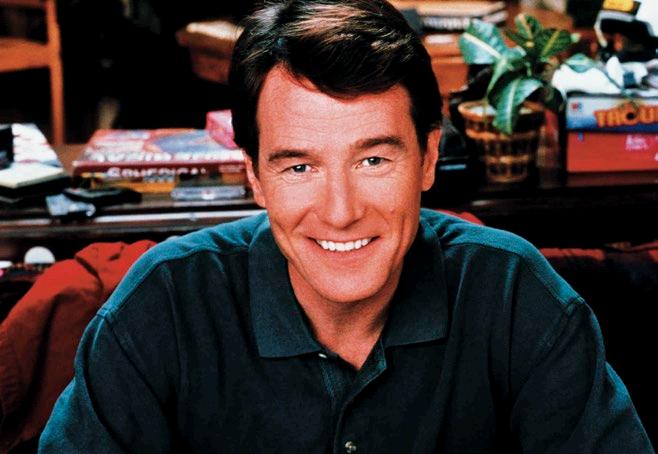
Bryan played the role of long-suffering father Hal in Malcolm in the Middle from 2000-2006
I HAVE A HABIT OF PLAYING DAMAGED CHARACTERS. I’M VERY ATTRACTED TO DAMAGED CHARACTERS. I RELATE TO THEM BECAUSE I AM ONE
characters. I’m very attracted to damaged characters. I relate to damaged characters.”
How so?
“Because I am one,” he replies, without missing a beat.
“I came from a busted-up home that was filled with alcoholism and
physical abuse,” he admits. “It turned me into an introvert, very shy, very unsure of myself, very insecure about what to do.” The second of three children, Bryan was raised in Los Angeles in dire circumstances. His mother, Peggy, a radio actress, became an alcoholic, while his father Joe went from job to job before he left when Bryan was just 11.
“My dad was gone. I didn’t see him for ten years and even when I did see him again there was a lot of damage. So I had anger issues and resentment and insecurities and things like that. So part of the reason I love to act so much is that it creates an opportunity for me to live through that vicariously and have a cathartic
Bryan met wife Robin when she played his character’s hostage in Airwolf. Their daughter Taylor is also an actress

and therapeutic experience in my work.” It also explains why he wrote the candid autobiography, A Life In Parts, in 2016.
Even when he reunited with his father—after he and his brother tracked him down—it remained a strained relationship.
“I knew we were never going to have a truly open relationship. And yet on his death bed, we found a scribbled note in shaky handwriting that said the greatest day in his life was when his children forgave him. Wow! He never told us that. That was his life, that was the way he chose to
IF YOU’RE AN ADVENTUROUS PERSON, WHEN SOMETHING THAT APPEARS NEGATIVE HAPPENS, REMEMBER IT. THAT’S GOING TO BE A GOOD STORY
live. I don’t want to be that way. I don’t want to have to write a note to my daughter. I want to tell her now how much I love her. That’s what I’ve learned.”
Fatherhood is clearly a top priority now. Bryan has been married to his second wife Robin since 1989, after they met on the TV show Airwolf, and their daughter Taylor, 25, is now a blossoming actress in her own right. He positively glows when talking about her and the wisdom they share. Like dealing with life’s ups and downs. “If you’re an adventurous person—and I teach my daughter this—when something that appears negative at the time happens, remember it. That’s going to be a good story.”
Open and honest, Bryan is the sort

of raconteur you could spend hours with. He has an infectious enthusiasm for his work but comes armed with forthright beliefs. “I think it’s good to be able to voice your opinion. If it stirs the pot, it stirs the pot. There’s a lot to be stirred right now in America.” He’s a regular on Twitter. The day we meet, he’s just tweeted about the horrifying school shooting in Florida. “These events are no longer a tragedy, they’re commonplace,” he wrote. “The tragedy is the impotence and cowardice of Congress.”
Away from his soapbox, he’s busy


producing TV shows like Sneaky Pete and the recent Channel 4 drama Philip K. Dick’s Electric Dreams. But it’s not about accumulating wealth. “I’m not motivated by money. I have no idea what I made on this movie,” he says, referring to Isle of Dogs. “I have agents who are very concerned about it! And I don’t say that to be smug. I’ve been poor, really poor: kicked out of the house, living out of a suitcase, no home.”
This came after his father left, the bank foreclosed on the family home and Bryan and his two siblings were looked after by their grandparents.
I’ M NOT MOTIVATED BY MONEY. I’VE BEEN POOR, REALLY POOR: KICKED OUT OF THE HOUSE, LIVING OUT OF A SUITCASE, NO HOME
Even in early adulthood, he struggled in low-paid jobs as a waiter, truck loader and security guard. It was only after he started acting in commercials that he became solvent. “I didn’t become wealthy because I wanted to. I became wealthy because of lots and lots of luck, and focusing on what I love to do. But if I didn’t become wealthy I’d still be very happy.”
Recently, he’s been dividing his time between Los Angeles and London, where he’s been performing at the National Theatre for the past three months as the iconic TV anchorman Howard Beale in a stage adaptation of the Oscar-winning movie Network. It’s been an exciting run that’s required him to “guard” his reserves of energy. “I love doing it,” he says. “I don’t realise I’m tired until hours afterwards.”
With this much effervescence, it’s difficult to imagine Bryan ever winding down.
Isle of Dogs is in cinemas across the UK from April 20.















WITHOUT GIFTS IN WILLS, WE’LL ONLY EVER BE HALFWAY TO BEATING THE WORLD’S BIGGEST KILLERS
Half our pioneering work is nanced by gifts in Wills. As the UK’s largest independent funder of research into heart and circulatory disease, your contribution is vital.
By leaving a gift in your Will, you’ll help save even more lives from these diseases that are the world’s biggest killers.
For more information about leaving a gift in your Will, visit bhf.org.uk/wills, or call 0800 277 0004
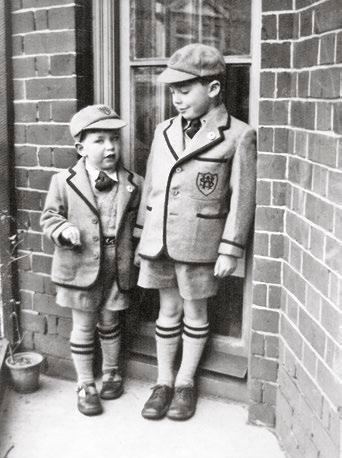
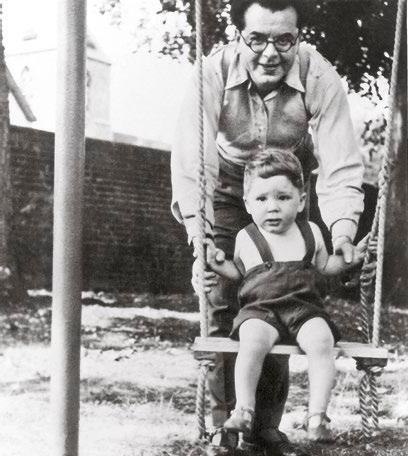
Being pushed by his father on a swing and posing in school uniform with brother Julian
“I REMEMBER” Andrew Lloyd Webber
Sir Andrew Lloyd Webber, 70, is the legendary composer of some of the most successful musicals in history and has reigned over the West End for nearly five decades


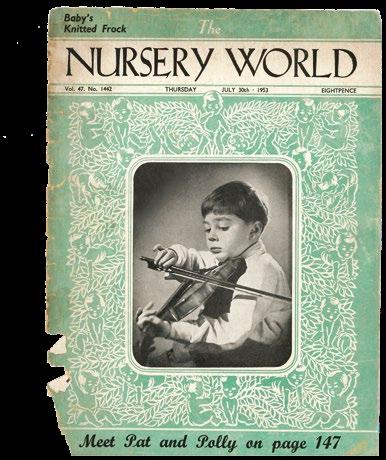
…WE LIVED IN A RENTED FLAT. When my parents met, Dad had close to zero income. He, Mum, my dear Granny Molly and Mimi, my mother’s pet monkey, shacked up under one roof in a rented flat in London’s South Kensington.
…MUM’S MONKEY
DISLIKED ME. When Mum got pregnant, her pet monkey Mimi became horrendously distressed and violently attacked my mother’s stomach with bloodcurdling cries.
…MY FATHER WAS A MILD MAN. My paternal grandfather was a keen amateur musician. As a child, Dad got music scholarships all over the shop. At an unprecedentedly youthful age he won a gong to the Royal College of Music. But for all his talent Dad wouldn’t say boo to a goose. He was content in his academic roles such as Professor of Composition at the Royal College of Music. Mum found his lack of ambition infuriating.
…TAKING OUR CAT FOR WALKS
I owe Cats not only to Mummy’s bedtime reading of T S Eliot’s Old Possum’s Book of Practical Cats, but also to my cat, Perseus—a wonderful
square-faced, seal-pointed Siamese boy. The family really shouldn’t have had an animal like that in a flat.
Such was Perseus’s deafening meowing that when I was around seven I asked if I could take him on a lead to Thurloe Square, the only bit of local greenery I knew. I became a regular spectacle walking Perseus like a dog.
…MY FIRST TIME ON A MAGAZINE COVER. Mum was an ace children’s piano teacher and her lessons gave me a head start in the basics of music. When I was about four, Mum hired a photographer and thrust a violin and a bow upon my person. Mum’s idea was that I would emerge on the international concert stage as some Yehudi Menuhin-style violin-toting child prodigy. Her hopes didn’t last long.
…FAMILY OUTINGS TO
movies Gigi and South Pacific — which completely pulverised me. I remember the afternoon I saw it as vividly as the film’s legendary colour filters.
I wrote tons of dreadful musicals. Bored relatives and friends would gather for the latest offering with my brother and me on vocals, and me alternating as pianist and sceneshifter. It was a complete world where I was truly happy.
…DAD PLAYING ME
I owe Cats to my childhood cat Perseus—a wonderful square-faced, seal pointed Siamese boy
SOME ENCHANTED EVENING. Before we went to the movie of South Pacific, Dad played me the tenor Mario Lanza’s recording of “Some Enchanted Evening.” Three times he played it, tears streaming from his eyes. When the record finally stopped, he looked me straight in the face. “Andrew”, he said, “if you ever write anything half as good as this I shall be very, very proud of you.”
PANTOS AND MUSICALS. We had an annual family Christmas outing to the London Palladium pantomime. The big names, big sets and contemporary pop songs captivated me. The Christmas holidays in 1958 brought me face-to-face with musicals for the first time. Over four weeks, I saw My Fair Lady, West Side Story plus the
…THE DAY MY SCHOOLBOY LIFE CHANGED. I attended the junior department of Westminster School. At the end of term concert I was slated to play some boring piano piece by Haydn, but I instead announced; “I’m going to play some tunes I have written that describe every master in the school.”
By the end boys were shouting, “Lloydy, Lloydy!” I was no longer the little school swot, I was Andrew.
…MEETING MY FUTURE
COLLABORATOR. When I was 17, I received a letter from a 22-year-old Tim Rice saying “Your agent told me you were looking for a ‘with it’ writer of lyrics for your songs.” He came to our flat and brought a demo of a song he’d written. It was catchy, with Tim singing in a laidback, folksy way accompanying himself on guitar. I diffidently broached that my real love was musicals. To my surprise, Tim said he’d been brought up on his parents’ cast albums and he actually liked theatre songs. I really liked Tim. He had a laconic turn of phrase and a quick wit.
…MEETING MY FIRST WIFE. I met Sarah Hugill on 21 January 1970 at a friend’s birthday party. Sarah was just a slip of a 16-year-old schoolgirl. She offered to be my secretary. Falling in love didn’t take long. Sarah and I had long presumed we’d get hitched as soon as she legally could. I had the cash to buy a smart BMW so, as an unofficial engagement present, I gave her my old Mini which she promptly drove into the back of a lorry.
By the time we got to the hotel, I knew that there was no alternative. I was in love and I proposed
…THE BIGGEST DECISION OF MY LIFE.
Tim and I started writing together for The Likes of Us, a musical based on the story of Dr Barnardo. Then Tim started a job at EMI. He could easily have a hit on his own. I agonised about leaving Oxford. Instead, I went to the Royal College of Music and, within a few years, Tim and I had produced Joseph and the Amazing Technicolour Dreamcoat, Jesus Christ Superstar and Evita.
…1971 WAS A RATHER EVENTFUL YEAR. I got married; Superstar opened on Broadway and I met my hero, Richard Rodgers, in his Manhattan apartment, which I remember being rammed with Impressionist paintings.
…BECOMING A FATHER. 1976 brought a moment of real joy. Sarah was pregnant. As she was diabetic, she had to be in hospital weeks before her due date. When our gorgeous healthy baby girl was born the following March I was delighted. She was named Imogen after Sarah’s grandmother. Her middle name is Annie after the musical.
…FALLING FOR SARAH BRIGHTMAN. When Sarah auditioned for Cats in 1981, it was how she looked and danced that
grabbed me. So when I saw the children’s opera Nightingale the next year I was poleaxed that she also had a captivating soprano voice. After the show, I aimed for her dressing room. She and Mike Moran, a keyboard player and producer/songwriter, were going back into town. Sarah suggested I join them. It was a split second decision that changed my life. When I’d started working on Starlight Express, our relationship was sealed during a brief trip to northern Italy. We were driving to Portofino and the rain dictated an extremely long lunch. By the time we got to the hotel, I knew there was no alternative. I was in love and I proposed.
…SEEING DAD PLAY FOR THE LAST
TIME. In 1982 Mum and Dad came to New York to keep my mind off the opening night of Cats. I hate opening nights. Sarah and I took Dad to Steinway’s HQ where he toyed with a full-sized concert grand piano. Then Dad played the great Rachmaninov D flat Paganini variation. Here was this most reserved of men playing with a passion I’d never heard before in a New York public showroom. I didn’t know it at the time but I would never hear him play again.
…BUYING THE PALACE THEATRE IN LONDON.
Buying such an important building as the Palace in London’s Cambridge Circus was a huge respite from domestic drama. It

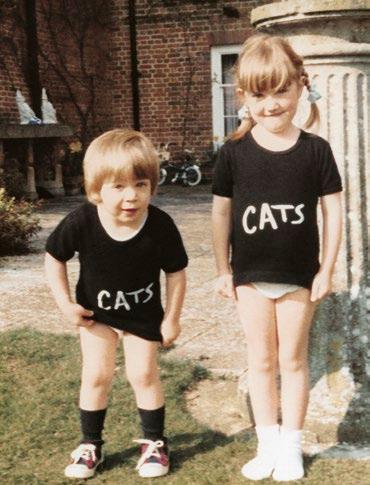
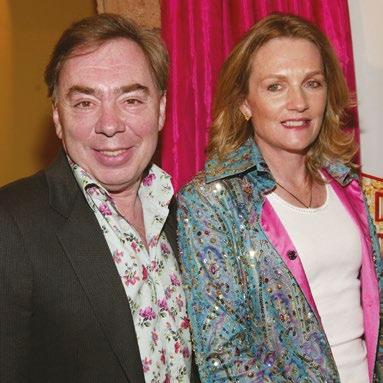
was the first time a West End theatre had been owned by a working theatre artist. The first thing I did was remove the vindaloo wallpaper. Underneath was solid Siena marble.
…MAKING A MUSICAL FOR HER MAJESTY.
In 1986 I got a call from Buckingham Palace and met with HRH Prince Edward. He wondered if I could compose something to celebrate the Queen’s 60th birthday and also his father’s 65th. I invited Tim to co-write and we agreed on a short musical featuring cricket and horse-racing. It played one night only in the Chapel Royal, Windsor Castle. The Queen and Duke of Edinburgh made polite noises.
…CRYING AT MY OWN MUSIC.
Phantom of the Opera opened in London’s West End in 1986. I vividly remember the song “The Point of No Return” being rammed with sexual tension and how the audience
gasped when Sarah ripped off Michael Crawford’s mask. However cloying it sounds, I was crying during the last scene and, when Sarah kissed the pathetic Phantom to the orchestra playing “Angel of Music”, I was as wiped out as the audience.
Never had I had more at stake. It wasn’t just that Phantom meant so much to me as a composer. Casting Sarah had put my professional integrity on the line. The director Harold Prince ran up the aisle and clasped my hand, saying, “It’s the best musical I have even seen.”
…MEETING MY WIFE MADELEINE.
I met my wonderful wife Madeleine Gurdon in 1989 through mutual friends when my marriage to Sarah had become rocky. Madeleine was a professional equestrian when I met her. She supported her horse-riding career by founding a successful country clothing business and has a mind like a razor.
I have been blessed with an extremely happy 27-years-andcounting marriage and Madeleine has given me three more great children, Alastair, Billy and Bella.
…BEING IN A DARK PLACE.
Madeleine has stood by me like a rock through some grisly career moments and four missing years thanks to health problems. In 2014 I was in a pretty dark place and it’s no secret that most people assumed
that I wouldn’t compose again. Then I decided to give up alcohol, sold my wine cellar and went back to my roots with School of Rock, based on the Jack Black movie. I produced it myself as well as composing the score and it’s my first Broadway show to go into profit since Phantom of the Opera.
…HOW LUCKY I AM. Since my 70th birthday, I’ve been looking back at how lucky I’ve been. You’re very lucky if you know what you want to
do in life. I’m doubly lucky that I not only have made a living out of my passion but a hugely rewarding one. I hope through the Andrew Lloyd Webber Foundation and the restoration of my theatres that I’m able to give something back to the profession that has always been so good to me.
As told to Amanda Riley
Andrew Lloyd-Webber’s first memoir, Unmasked, will be published on March 6 (Harper Collins, hardback at £20.00).
DOG’S BEST FRIEND
When Jordan Kahana found two abandoned pups on his travels, he decided to take them along:






Out of the blue
When a rare and unanticipated illness struck Andrew Britton on his honeymoon, his life was changed forever. In the first part of his story, we discover how heart problems can affect anyone, at any time of life
Unexpected things have a habit of happening… unexpectedly. Andrew Britton was a healthy, athletic 32-year-old newlywed in November 2012. A project manager for an international hotel chain and a keen sportsman, he was looking forward to embarking on the next chapter in life with his new bride Lauren, when disaster struck on their honeymoon in the Maldives.
He contracted a virus. “At first, I just thought it was a hangover after the wedding or some dodgy plane food!” he jokes.
It went on to attack his heart, resulting in a life-threatening heart rhythm. This necessitated defibrillation and a warning from local doctors that he could die if he wasn’t transported via emergency jet to a hospital in Bangkok within 24 hours.
Lauren recalls: “It all happened
This content is sponsored by
completely out of the blue. It was absolutely terrifying. One moment we were enjoying our honeymoon and looking forward to our future together, the next, we were being told Andrew might not make it.”
On arrival in Bangkok, Andrew was placed on life support for two weeks. When he was well enough to fly back to the UK, he was referred to Harefield Hospital in North London, where consultant Dr Nick Banner diagnosed him with myocarditis.
“Myocarditis is an inflammatory condition that can damage the heart muscle,” says Dr Banner. “Once the heart muscle becomes weakened and the heart enlarges, the result is heart failure. Unfortunately, this is what happened in Andrew’s case.”
After being fitted with a defibrillator, Andrew was discharged from hospital. But a few weeks later he collapsed and was
readmitted to Harefield, where he was told that his only hope was a heart transplant.
“It never even crossed my mind – I’d never even been ill before,” says Andrew “And then someone saying ‘you need a heart transplant’; it was just completely dumbfounding.”

One moment we were looking forward to our future together, the next, we were being told Andrew might not make it
Andrew and Lauren found that their lives had to be put on hold; they had planned to start a family before his illness struck, but now their future together hung in the balance. They were unable to secure a mortgage, and Andrew’s previously active life became taken up with hospital visits.
Lauren says: “It was an incredibly worrying time – we were supposed to be enjoying our time together as newlyweds, but instead, we were living apart, with Andrew not able to leave hospital. I visited him every day after work and we ate dinner together.”
Andrew was placed on an organ transplant waiting list. And all he and Lauren could do was hope. n
Read the second part of Andrew’s story on page 50
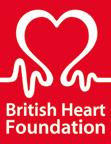
Heart disease kills more people than all cancers combined. Here’s how cardiologists and other healers beat the odds in their own lives
Things
Their Hearts to Protect Doctors Do 36
BY CHARLOTTE HILTON ANDERSEN1 They eat eggs.
“The science clearly shows that a diet without cholesterol doesn’t necessarily lower a person’s cholesterol levels. In fact, when the amount of cholesterol in a food is high, it’s often acting as an antioxidant. Eggs are full of satiating protein and essential fats.”
CAROLYN DEAN, MD, ND, author of Atrial Fibrillation: Remineralise Your Heart

2 They get eight hours of sleep.
“Poor sleep is linked to higher blood pressure, a risk factor for heart disease. I try to get to bed by 10pm, I don’t watch television right before bed, and I keep my room dark. I also never drink caffeine after 10am, and I avoid alcohol on work nights.”
JENNIFER HAYTHE, MD, cardiologist and assistant professor of medicine at Columbia University Medical Centre
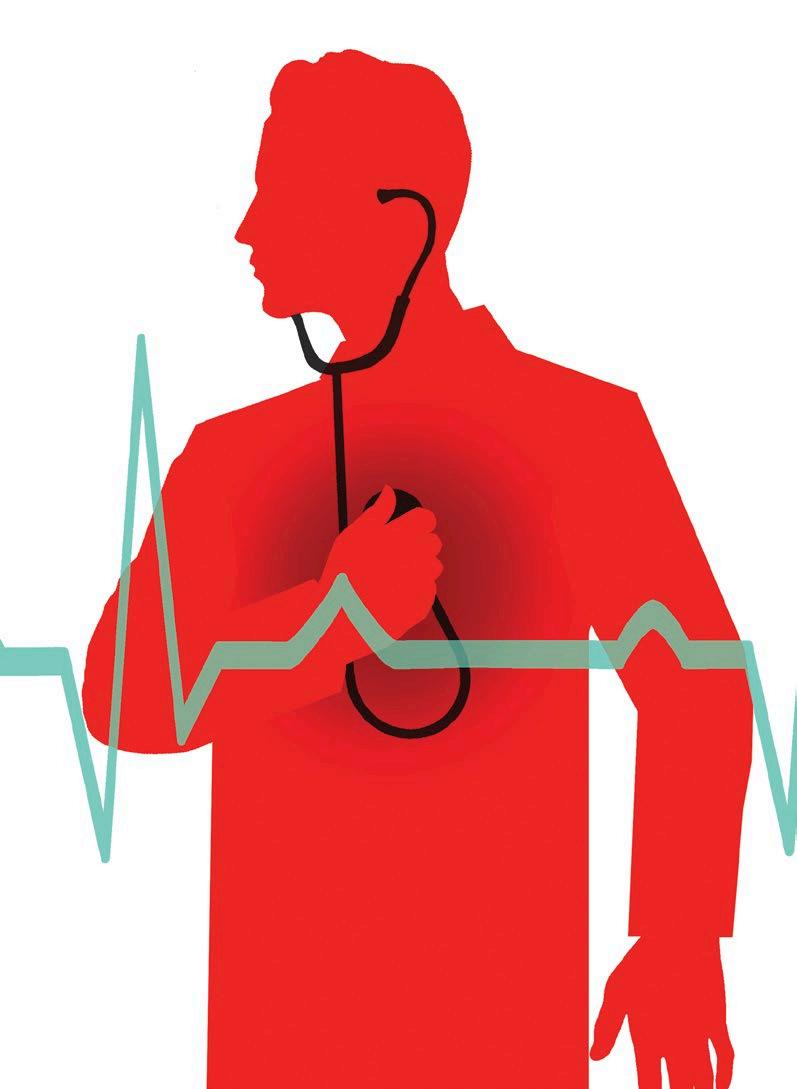 BY MARK ALLEN MILLER
BY MARK ALLEN MILLER
3 They take the stairs. “Modern conveniences such as lifts and escalators dramatically reduce the amount of exercise we get on a daily basis. To counteract this, I take the stairs at every opportunity.”
RICHARD WRIGHT, MD, cardiologist and chairman of the Pacific Heart Institute at Providence Saint John’s Health Centre

4 They meditate.
“Stress can cause catecholamine release—also known as the fight-orflight response—and that can lead to heart failure and heart attacks. I’ve found comfort in 20 minutes of meditation daily.”
ARCHANA SAXENA, MD, cardiologist at NYU Lutheran Medical Centre
5They do CrossFit. “Exercise blunts the cortisol spike; that’s the rush of stress hormones that have been linked to increased risk of a heart attack or a stroke.”
ADAM SPLAVER, MD, cardiologist and co-founder of NanoHealth Associates
6They’re always finding something to laugh about.
“Seeing the humour in everyday situations helps me to maintain
a healthy perspective. The act of laughing dilates the arteries and keeps blood pressure down.”
SUZANNE STEINBAUM, MD, cardiologist and spokesperson for the American Heart Association’s Go Red for Women movement
7They eat berries.
“Berries contain natural antioxidants, such as vitamins C and E, and anthocyanins, the pigments that give berries their colour, both of which help the heart. I eat fresh or frozen berries regularly.”
NITIN KUMAR, MD, gastroenterologist and expert in cardiometabolic risk at the Bariatric EndoscopyInstitute
8They respect the power of blood pressure.
“In 2015, we did a study that found that lowering systolic blood pressure
(the top number) to 120 mm Hg reduced the rates of death due to cardiovascular disease, heart failure, stroke, and heart attack by 25 per cent. It’s important to keep it in check by eating a healthy diet, being physically active and maintaining a healthy weight.”
CORA E. LEWIS, MD, epidemiologist and professor at the University of Alabama at Birmingham School of Medicine
9
They take care of their teeth. “Good oral hygiene can lead to less systemic inflammation. While more research is needed to determine whether or not this decreases rates of heart attacks, having a healthy mouth is important to overall wellness.”
JULIE CLARY, MD, cardiologist at Indiana University of Health
10
They get the flu vaccine every year. “Getting a flu vaccination is an especially idea good for people with heart disease and heart failure. The vaccine has recently been shown to offer protection against new-onset atrial fibrillation (irregular heart rhythm).”
JASON GUICHARD, MD, cardiologist in Birmingham, Alabama
11They eat lots of protein. “Since the heart is a muscle, it needs daily lean proteins. I eat grass-fed meat and wild-caught fish along with heart-healthy olive oil, nuts, and vegetables. And I make a point to avoid meat that contains antibiotics or hormones.”
AL SEARS, MD, anti-ageing specialist and author of 15 books on health and wellness
12They try to schedule exercise.
“I often hear my patients say that they don’t have any free time to exercise or say they had no idea that they had gained weight. This is why I schedule my exercise sessions just as I would schedule a business meeting or any other event.”
STEVEN TABAK, MD, FACC, medical director for quality and physician outreach at Cedars-Sinai Heart Institute

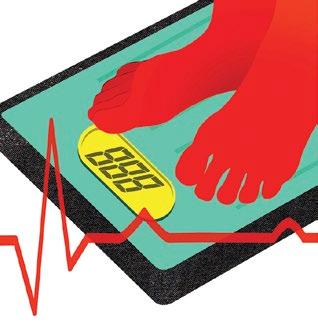
13 They watch their weight.
“About ten years ago, I found myself 40 pounds overweight. I also hadn’t been to a doctor for many years at that time. I made an appointment but not until I went on a diet, joined a gym, and over a year lost weight.” A 2016 study found that being overweight could take one to three years off of your life, while being obese may take as many as eight—and the effect is three times worse for men than for women.
MARK GREENBERG, MD, director of the White Plains Hospital Catheterization Lab and medical director of interventional cardiology at Montefiore Health System
14
They choose their cooking oils carefully.
“There’s been lots of research into how oils affect our heart health. I avoid products with palm oil and look instead for those with canola oil. Coconut, avocado and almond oils are also good choices.”
JONATHAN ELION, MD, FACC, cardiologist and associate professor of medicine at Brown University
15
They’re on alert for high blood sugar.
“In adults with diabetes, the most common causes of death are heart disease and strokes, according to the National Institutes of Health. I avoid junk food, particularly soda, and other foods that lead to high blood sugar and insulin resistance, the precursors to diabetes.”
RICHARD WRIGHT, MD
16They do intense aerobics. “Frequent, intense, prolonged cardiovascular exercise lowers blood pressure, increases good cholesterol (HDL), reduces bad cholesterol (LDL) and triglycerides, and stabilises blood sugar. I try to do a 45-minute session nearly every day.”
PAUL B. LANGEVIN, MD, associate professor in the department of anesthesiology and perioperative medicine at Drexel University College of Medicine
17They skip hot dogs.
“According to a Harvard University analysis, there’s strong evidence for association between
18
They spend time outdoors.
“Recently I realised I’d been indoors too long, so I prescribed myself a hike! This nature hack relieves stress and allows me to get vitamin D from the sunshine.”
MONYA DE, MD, MPH, INTERNAL MEDICINE PHYSICIAN IN LOS ANGELESthe consumption of processed red meats and an increased risk of cardiovascular disease.”
MICHAEL FENSTER, MD, interventional cardiologist, chef, and author of The Fallacy of the Calorie: Why the Modern Western Diet Is Killing Us
19
They eat a Mediterranean diet.
“Instead of grabbing crisps when I get home hungry, I slice up half an avocado and drizzle on olive oil. Delicious and filling, this quick snack is part of a Mediterranean diet, which has been proven to be healthier for your heart.”
GLENN RICH, MD, an internist specialising in endocrinology, obesity, and weight management in Trumbull, Connecticut
20
They make time for their loved ones.
“Heart disease has been associated with job strain and psychological distress at any point in life—things that friends and family can help with.”
JASON GUICHARD, MD

21
They ask for a heart scan.
“A coronary calcium CAT scan enabled me to determine whether I was developing early heart disease. This test is simple, widely available, and relatively cheap. It can find signs of heart disease before you even feel the symptoms.”
GLENN RICH, MD
22
They take a vitamin K2 supplement.
“Recent studies indicate that vitamin K2 is critical to heart health. It works by shuttling calcium into your bones instead of letting the calcium clog your arteries. Vitamin K2 may reverse coronary calcification, the disease that causes blockage of your arteries.”
ADAM SPLAVER, MD
23
They get tested for sleep disorders.
“Sleep apnea, one of the most common sleep disorders, causes you to take long pauses in breathing

during sleep. This can starve your organs of oxygen and wreak havoc on your heart health.”
ADAM SPLAVER, MD
25
They drink alcohol in moderation.
“Moderate drinking can offer protection from heart disease. But if you don’t drink at all, keep it that way. If you drink more than one or two drinks in a single occasion, it can increase your risk of a stroke.”
SAMUEL MALLOY, MD
26They get plenty of vitamin D.
“Studies have shown that having low vitamin D levels is a significant predictor of cardiac death, heart attack, and stroke. Low vitamin D is also associated with high blood pressure and blood sugar, which are
24They drink lots of water.
“Drinking five or more glasses of water a day can lower the risk of heart disease death, as dehydration leads to increased hematocrit (the ratio of red blood cells to blood volume) and increased blood viscosity or thickness, both of which have been associated with cardiovascular events.”
JASON GUICHARD, MD
risk factors for heart disease. Have your doctor check your vitamin D level and supplement up to normal with high doses if needed.”
NITIN KUMAR, MD
27They take probiotics.
“Probiotics such as Lactobacillus acidophilus and Bifidobacterium lactis have been shown to significantly decrease bad cholesterol and inflammatory markers that may eventually lead to heart disease.”
NICOLE VAN GRONINGEN, MD, internal medicine physician at UCSF Medical Center
28They know the benefits of a vegetarian diet.
“Last year, our cardiology group started a specialised programme for cardiac patients. The outcomes were dramatic so we doctors decided to
follow it ourselves. One part involved eating a vegetarian diet for three months. I was surprised at how much better I felt for it.”
JOSEPH A. CRAFT III, MD, FACC, cardiologist at the Heart Health Center in St. Louis
29They mix magnesium powder into their water.
“If sufficient magnesium is present in the body, cholesterol will not be produced in excess. So I supplement with magnesium citrate powder mixed with water.”
CAROLYN DEAN, MD, ND
30They practice gratitude. “One study showed that volunteers who focused on feelings of appreciation had increased heart-rate variability, associated with decreased death from cardiac disease. Another study found that patients who kept gratitude journals had lower levels of inflammatory biomarkers that could lead to cardiovascular disease.”
NICOLE VAN GRONINGEN, MD
31They take a herbal sleep aid.
“Small doses of melatonin and 5-HTP supplements have been very effective in helping me get to sleep.”
WESTIN CHILDS, DO, internist in Gilbert, Arizona
32They eat a “no-white” diet.
“I make an effort to stay away from
white sugar, white flour, white bread and white rice.”
ADAM SPLAVER, MD
33They practice yoga.
“I reduce stress through yoga; it helps me unwind, find balance, and escape for a short time every day.”
JENNIFER HAYTHE, MD
34They recommend aspirin, but only for some people.
“If you’re healthy, there is no preventive benefit in taking aspirin. But for people who have already experienced a heart event or those with diseased arteries, a low-dose aspirin a day is very helpful at preventing a future heart attack.”
RICHARD WRIGHT, MD
35
They recommend having lots of sex.
“Sex is like interval exercise, which is very good for the heart. One easy and fun way to help your heart is to have more sex!”
RICHARD WRIGHT, MD
36
They eat dark chocolate. A 2016 study found that a daily dose of dark chocolate helps prevent diabetes. “It may improve arterial elasticity and help lower blood pressure. Keep an eye out for at least 75 per cent cocoa, and then savour a square or two.”
CYNTHIA GEYER, MD, medical director of Canyon Ranch in Lenox, Massachusetts
Back to life
In the second part of Andrew Britton’s story, we find out how his new lease on life was made possible by an organ donor, British Heart Foundation research, and the gifts in Wills left to the charity by people like you
“E
ventually the right heart came along,” says Andrew Britton. “I woke up not long afterwards –and it was ‘welcome to a new life.’”
After a sudden and unexpected illness struck on honeymoon in the Maldives (see page 40), Andrew had spent months on a waiting list for a heart transplant. Finally, following a hugely difficult time for him and his new wife Lauren, a suitable donor was found in September 2013.
Research supported by British Heart Foundation (BHF) funding led to the UK’s first heart transplant in 1968. In the 1980s, pioneering research by the BHF with Professors Sir Magdi Yacoub and Sir Terence English helped to dramatically improve success rates for heart transplants. Today, nearly 200 heart transplants are performed in the UK every year. And about seven out of ten people who underwent
This content is sponsored by
the surgery five years ago are still alive, with many of them living a good quality of life.
Like them, a heart transplant literally gave Andrew a second chance at life. “I didn’t want to just survive,” he says. “I wanted to go out and thrive again.”
He was able to return to a happy, healthy life thanks to his heart donor, the work of the NHS and previous research. And, since his operation, not only has Andrew thrived – his and Lauren’s dreams of starting a family have come true, and they now have a son and a daughter, Frank and Nancy.
“I’m more relaxed about things now, and chilled out – less focused on things which aren’t important,” Andrew says. “Time is the most important thing now, and doing what I enjoy.”
A significant part of BHF’s work today
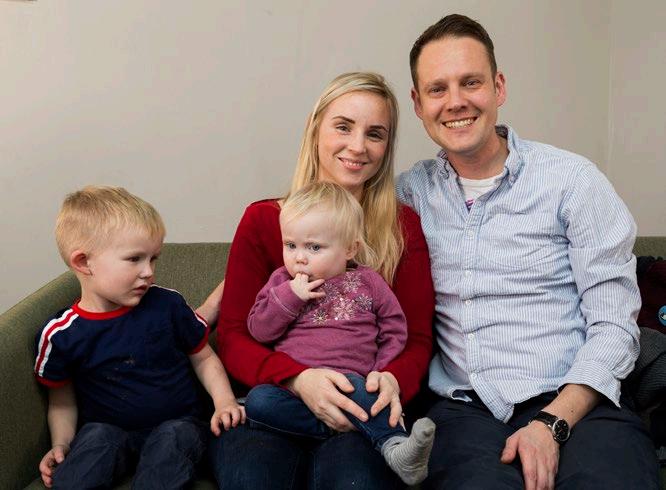
remains focused on increasing the number of successful heart transplants—see page 50 for details of our current research into combating organ rejection.
“Without all the research – and the ongoing research – there’s no way that my transplant would have occurred, or be as successful as the outcome that we have now,” says Andrew.
Lauren has even written a book about the couple’s story; Strength In Strangers by Lauren Britton is available on Amazon.
What does Andrew have to say to those
who saved his life – from the donor and their family, BHF and NHS professionals, and those who have donated or left money in their wills to fund BHF research?
“Thank you.” n
LIFE SAVING LEGACIES
Gifts in Wills fund half of BHF’s life saving research. Without them we wouldn’t be able to help people like Andrew or make the next big breakthroughs. To find out more about leaving a gift in your Will to the BHF visit bhf.org.uk/wills or call 0800 277 0004.

You’reAllergic To What?
BY SUSANNAH HICKLING

Susannah is twice winner of the Guild of Health Writers
Best Consumer Magazine Health Feature
FORGET POLLEN; it’s possible to have an allergy to all sorts of everyday, inconvenient things.
THE SUN. Admittedly, this isn’t such an issue in this country compared to those with warmer climes. And it’s indeed a rare allergy. Those affected react to ultraviolet light and come out in hives. It’s even possible for UV from fluorescent bulbs to trigger it. People who are allergic to the sun need to cover up from head to toe. Much more common, though, is polymorphous light eruption, or good old-fashioned heat rash. It’s not dangerous, just a pain.
LATEX. Products containing latex include rubber gloves, rubber bands, balloons and condoms. Symptoms vary from mild itching and hives to hay fever symptoms and wheezing to full-blown anaphylactic shock with dizziness, difficulty breathing, a drop in blood pressure, swelling around the throat and possible collapse. You will need to wear synthetic rubber or PVC gloves and avoid all latex products.
SEMEN. If you think a latex allergy might be bad for your sex life, then imagine what life is like for people who have a reaction to semen. It’s rarer than a latex allergy, but for some people who have unprotected sex, semen can cause a mild

allergic reaction such as irritation, redness and swelling or even life-threatening anaphylaxis. The allergic reaction is usually caused by a protein in semen. Using a condom during intercourse will fix the issue.
JEWELLERY. It’s well known that wearing cheap bling can give you a green rash but, in fact, any metal alloy—even when you’re wearing expensive jewellery—can cause oxidisation which leads to contact allergy. Nickel is a common culprit. And it’s not just women who suffer. Nickel in men’s belt buckles and even the change in their trouser pockets can have the same effect. Platinum and stainless steel are less likely to cause an allergic reaction, though.
WATER. Can you really be allergic to life-sustaining H2O? Well, kind of, is the answer. Aquagenic urticaria is a case of acute hives provoked by exposure to water, though it’s probably caused by bacterial proteins on the skin getting wet. A different condition, cold-induced urticaria, is a reaction to the temperature of the water. This can be very dangerous—diving into icecold water, for example, can cause the blood vessels in the skin to become porous and leak. Fluid escapes into surrounding tissue and blood pressure falls. This can lead to loss of consciousness and drowning.
Did you know?
• Brits have one of the highest rates of allergy in the world, with around 44 per cent of us affected.
• The most common causes of allergies are tree and grass pollen, house dust mites, moulds, foods, pets, insects such as bees and wasps, and medicines.
• Allergies aren’t confined to spring and summer months. The time of year you suffer depends on the allergen. It’s even possible to be allergic to Christmas trees!
• A food intolerance isn’t the same as a food allergy. An intolerance is usually a digestive problem, whereas a food allergy is the immune system battling what it considers to be an invader.
• People who have a latex allergy are often also allergic to kiwi fruits, bananas, chestnuts and avocados. Why? Because they’re from the same plant family.

APRIL IS THE CRUELLEST MONTH…
Or so said gloomy poet T S Eliot in his long poem, The Wasteland. It seems he wasn’t wrong. SAD (Seasonal Affective Disorder)— otherwise known as the “winter blues”—is a well known condition. But, surprisingly, some people feel more depressed in spring and summer than at other times of the year. The days getting warmer and longer, and the fact that spring flowers and blossom represent new beginnings for some people, just make the spring blues worse for others. This phenomenon is sometimes called “reverse SAD”.

HOW DO YOU RECOGNISE IT?
WHAT CAUSES REVERSE SAD?
Because it’s not well understood or often spotted, it’s hard to pin down the reasons for feeling down when everyone else seems to be full of the joys of springtime. With winter SAD, less sunlight is thought to disrupt the body’s internal clock and bring on depression. Reverse SAD, on the other hand, might be caused by too much sunlight. You might also be tempted to stay up later, throwing out your body clock.
Like traditional SAD, spring depression comes back at the same time every year, so that’s a major clue. Do you love the cold and feel much more energised at that time of year, while spring makes you feel much less positive? Again, this could be reverse SAD. And it sometimes runs in families, so look around at your nearest and dearest and note how they feel about the advent of warmer, brighter days.
CAN YOU SHAKE OFF THE SPRING BLUES?
Exercise can work wonders. A study found that ten weeks of standard exercise was 20 per cent more effective than medication. And get plenty of sleep. Try to get up at the same time every day, even if you haven’t slept well. But if your depression shows no sign of lifting, see your doctor.
5 GOOD REASONS TO GET OUT IN THE GARDEN
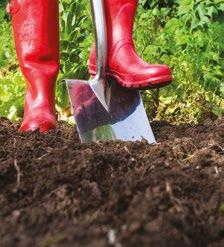
1. BUILD BONE STRENGTH. US researchers found that gardening was strongly associated with a reduced risk of osteoporosis.
2. ENHANCE YOUR DIET. By growing your own fresh veg.
3. IMPROVE YOUR BLOOD PRESSURE. Cultivating fresh herbs to use in your cooking instead of salt could lower your risk of a stroke or heart attack.
4. RELIEVE STRESS AND DEPRESSION. Being out in a green space is known to help heal the blues.
5. BUILD UPPER BODY STRENGTH. Weeding builds arm, shoulder and upper back strength.
GET IN GEAR
You may have heard rumours that cycling causes impotence and makes men need to pee more often. But guys who cycle can be reassured. A large US study has found that pedalling doesn’t affect their ability to get an erection, nor does it cause urinary problems. In fact, the cardio vascular benefits far outweigh any risk from an uncompromising saddle. So, with the weather improving, it’s time to get your bike out. But first make sure it’s safe to ride.
• Check the wheels are secure and the tyres inflated above the recommended minimum pressure. This should be indicated on the side of the tyre.
• Pull the brake levers, each in turn, to ensure they grab the wheel properly.
• If your bike has suspension or hydraulic disc brakes, check for oil that’s pooling or leaking.
• Clean your chain with a dry rag and apply chain oil evenly across the chain, wiping away the excess.
• See a bike doctor once a year. Most cycle shops will service your bike and identify anything that needs to be repaired or improved.
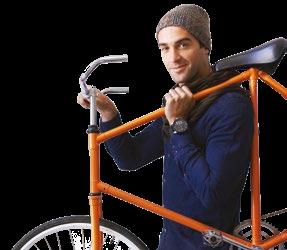
In a Silent Way
BY MAX PEMBERTON
Max is a hospital doctor, author and newspaper columnist
IF WE’RE ALL LEADING LIVES OF QUIET
DESPERATION, there are some of us who are far quieter about it than others. In fact, some of us are never heard. Since becoming a doctor I’ve seen many sad things, and it took a while to learn not to let them prey on my mind. But the things that stay with me aren’t always the things one would expect. Sometimes, the real pathos is in seeing people live their day-to-day lives, rather than the dramatic things like seeing people die. It’s the silent inconsequential things that I’ve found the most poignant.
A FEW YEARS AGO I’d been working a week of nights. I’d just finished my last shift and as I walked out into the early morning sun, I decided to stop for something to eat. Shopkeepers were busy opening their shutters and drivers sped along in their cars. While my day was just ending, most people’s was just beginning. My head was muggy from being awake all night, and as I strolled down towards the nearest bakery, it took some time before I realised someone was calling my name. I looked up. It was Mrs Walden. I’d seen her in my outpatient clinic the week before. She was in her late 30s and had been in and out of hospital most of her adult life, due to her mental illness. She lived alone in a council flat; she was isolated and depressed. She had nothing to make her happy except her son, Henry. Henry was put into care when he was two because she couldn’t offer him a stable home. It
was for the best. She hadn’t seen him for six years but “there’s not a day that goes past that I don’t think of him,” she had proudly told me when I saw her in the clinic. The courts had recently agreed that she could begin some supervised contact. He’d called her a few weeks ago, and she was hoping to see him for a few hours at Christmas.
“WHERE ARE YOU OFF TO then?”
I asked. She looked at me with an air of concern.
“It’s Christmas soon,” she replied. Sleep deprivation does funny things to you, and there was a moment of genuine panic that came across me. Oh no, I haven’t written a single Christmas card, I thought, before coming to my senses.
“Er, it’s only September,” I reminded her.
“I know, but I want to get the best present for Henry, and they always sell out of the thing that kids want, so I thought I should get it early.” She was waiting for the bus to take her to an out-of-town shopping centre where, she explained, there was a toy super-store. She pulled out a photo of her son to show me.
“It’s still very early, it won’t be open yet,” I suggested.
“I want to be the first person there. Get the best for him,” she explained. This means so much to her. She’s so anxious to please him. The truth is,
it’s ridiculous—here she is, a good three hours before any shop is open, getting ready to buy a Christmas present three months early for an eight-year-old son she hasn’t seen for six years. I have this gnawing image of her son opening a present on Christmas day, from a mother he has no memory of—a moment so insignificant for him, but of such importance to her. This is all she has to hold on to. I look at the people milling about, starting their day, oblivious. Mental illness ravages through people’s lives, destroying it piece by piece and yet Mrs Walden is still, desperately, holding on to the idea of a relationship with her son. She puts the photo back in her bag, waves goodbye and quietly she boards the bus.
MEDICAL CONDITIONS—EXPLAINED
Lung Cancer
WHAT IS IT?
This is one of the most common, and most serious, types of cancer. Every year around 45,000 people are diagnosed with it. There are often no signs in the early stages, but symptoms can include a persistent cough, unexplained tiredness and weight loss, coughing up blood and shortness of breath. There are two main types: non-small cell lung cancer, which is the most common, or large cell carcimona. The other main type is small cell carcinoma which is rarer and faster-growing.
WHAT CAUSES IT?
Although people who have never smoked can still develop lung cancer, smoking accounts for about 85 per cent of all cases. Lung cancer can also be caused by exposure to toxic chemicals or materials.
HOW’S IT TREATED?
This depends on the type of lung cancer. Surgery is sometimes an option to remove the tumour if caught early. Radiotherapy is also sometimes given to destroy the cancer. If the

cancer is large or has spread, then chemotherapy is given. Overall, one in three people with lung cancer live for at least a year after diagnosis.
WHAT CAN THE PATIENT DO?
The most important thing is prevention. Stopping smoking is the single biggest thing you can do to reduce the risk. Even if you’ve been smoking for a long time, as soon as you stop, your risk starts reducing. Early detection is also vital as this improves survival rates. It’s therefore important that people with any symptoms, such as a persistent cough or weight loss, are checked out by a doctor as soon as possible.
The most comprehensive formula for heart health
The most comprehensive formula for heart health. Ideal for those looking for maximum nutritional care, Cardioace has been developed on the basis of extensive world-wide research over the last 40 years.
Vitabiotics
Cardioace Max has been scientifically developed to safeguard your diet to help support all round health with specific nutrients to support heart health. The formula includes vitamin B12 and folic acid which contributes to normal red blood cell formation and thiamin (vitamin B1), which contributes to normal function of the heart. Cardioace Max provides all the benefits of Cardioace Original, along with additional advanced
ingredients including 0.8g of plant sterols (per daily intake of two capsules) which contribute to the maintenance of normal blood cholesterol levels. A beneficial effect is obtained with a daily intake of at least 0.8g of plant sterols. It also contains a premium Red Krill Oil capsule, which is a superior source of easily absorbed omega-3 fatty acids. n

 Cardioace Max RRP £29.85 for 84 Capsles, available from Boots, Superdrug, supermarkets, pharmacies, health food stores and online at www.Cardioace.com
Cardioace Max RRP £29.85 for 84 Capsles, available from Boots, Superdrug, supermarkets, pharmacies, health food stores and online at www.Cardioace.com
Dealing with rejection
A recent break-through discovery by a team of British Heart Foundation (BHF) researchers could radically improve the success rates of heart transplant procedures. Work like this would not be possible without gifts in Wills left to the BHF. These gifts fund half their pioneering research
Over the past few years, hundreds of heart transplants have taken place in the UK, saving hundreds of lives (see, for example, Andrew Britton’s story on pages 40 and 50).
Advances in medicine have dramatically increased the success rates of transplant operations since their early days in the late 1960s, but one of the major challenges facing researchers remains transplant rejection. This occurs when the immune system recognises a new heart as a foreign object and responds by attacking it, just as it would an infection.
The number of people on the waiting list for a new heart in the UK has risen by 162 per cent since 2008 and around half the people accepted onto the heart transplant waiting list receive a transplant within three years. In 2016/17, 40 people
This content is sponsored by
died while on the heart transplant list in the UK.
A team at Queen Mary University of London, led by BHF Professor of Cardiovascular Immunology Federica Marelli-Berg, is working to combat organ transplant rejection by researching the role of the immune system.
Because the body rejects a transplanted organ as foreign, people need to take immunosuppressant drugs. These stop rejection but can also shut down other aspects of the immune system, increasing the risk of complications such as infection or cancer. Prof Marelli-Berg believes the answer is to develop drugs which selectively switch off the immune response only in the heart, or that activate the anti-inflammatory arm of the immune system.
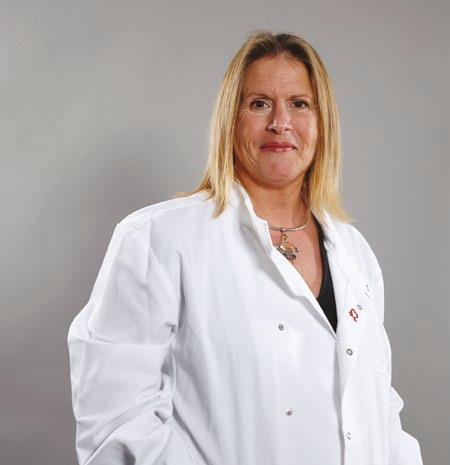
The research conducted by Prof MarelliBerg and her team focuses on T-cells, a type of white blood cell involved in activating the immune system and transplant rejection.
The team want to find a way to prevent T-cells from going to the heart, to stop rejection.
In a recent break-through they identified a specific molecular pathway which allows T-cells to just to go to the heart. This discovery could pave the way for drugs that could block this pathway, preventing rejection without affecting the rest of the immune system, which would reduce the risk of complications from immunosuppressants.
Additionally, they found that antiinflammatory T-cells, called regulatory
T-cells, which are a natural subset of white blood cells, can be induced to migrate to the transplant and reduce rejection. This was achieved by administering a ‘shelved’ drug previously developed for type 2 diabetes.
It is vital that this research continues. With your help Prof Marelli-Berg and her team may find a way of stopping transplant rejection altogether.
Gifts in Wills fund half of BHF’s life saving work. Leave a gift in your Will and be part of the next big discovery. n
LIFE SAVING LEGACIES
To find out more about leaving a gift in your Will to the BHF visit bhf.org.uk/wills or call 0800 277 0004.

THE ONLY PERSON WHOSE OPINION REALLY MATTERED WAS THE BABY’S
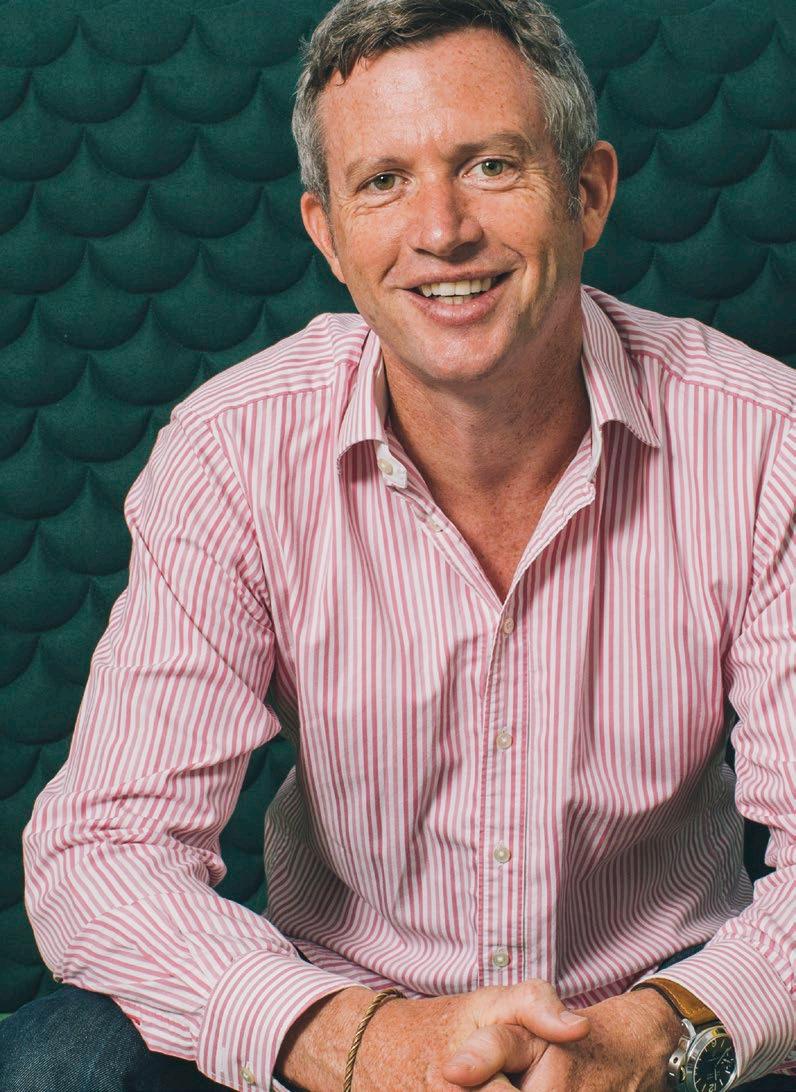

Think like a
Could listening to your inner child be the secret to making millions?
One father and businessman certainly thinks so…
BY PETER WOOLRICH
PAUL LINDLEY HAS ALWAYS had a childish side to him, but never in his wildest dreams did he think it’d make him a multi-millionaire. Already a director of the children’s cable channel Nickelodeon with two youngsters of his own, his rise to the very top of the business world began in a tent in British Columbia.
The Lindley family was on a camping holiday in Canada when Ella, his baby daughter, refused to eat any of the food Paul spooned out of the glass jars he’d bought in the supermarket. Although at his wits’ end, the 37-year-old accountant didn’t blame her. If it tastes anything like it looks it must be so boring, he thought. And is it really as nutritious as we’re led to believe? An idea began to germinate in both his business and parenting brain.
In 2003 consumers were becoming increasingly aware of the need to eat more healthily and it was generally assumed that feeding our babies sterilised, pureed banana out
of small bottles was good for them. Baby food had been presented in the same way since the 1940s because it was thought that mums liked being able to see the product—even though they all looked the same— and for decades none of the major brands saw the need to do anything differently. But Paul did.
“Basically, Ella had just had enough of the same old, same old and the only way I could get her to eat was to make a game out of it, making it more enjoyable both for me and her,” he says. “I’ve always had a childlike mind, asking why all the time, and it occurred to me that if the whole eating experience—as well as the food—could be more fun, engaging, and healthier too, children would be more likely to put the food in their mouths.”
TODDLERS EXCEL AT FREE THINKING WHILE AS ADULTS WE FEEL EMBARRASSED

IT SEEMED TO PAUL that the problem needed to be approached from a different angle: that of the end user. “The only person whose opinion really mattered was the baby’s. Babies were the ones eating the stuff so we had to think of a way of making meals more of an adventure by stimulating their senses. The question was how,” the now 50-year-old— who, as you’d
expect, appears much younger in his faded T-shirt and personalised Converse trainers—adds.
The idea went round Paul’s head for three months and not long afterwards he handed in his notice, having formulated a business model. People said he was mad to quit a wel-paid job to sell baby food, but he was determined to press on. He’d already realised that children could hold onto the squeezable pouches and feed themselves, but further research showed that the food didn’t need to be heated to the same high temperature; thus retaining more colour, taste, texture and vitamins. With the right recipe, it could be pasteurised, not sterilised.
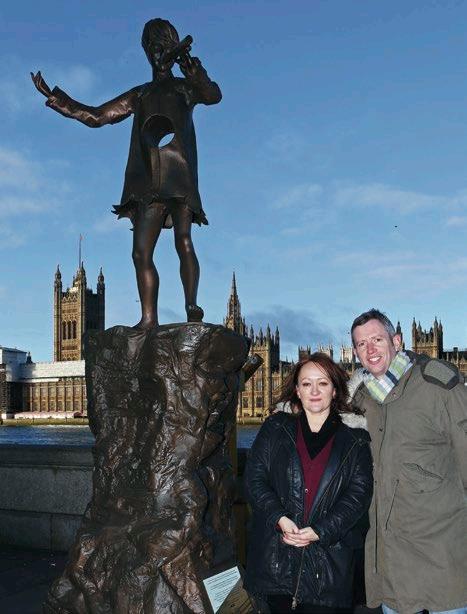
thinking, which he applied in more ways than one.
Paul’s real brainwave however, apart from his food being organic, was to look at the product in the same way as his young daughter and, later on, his son, Paddy. “They liked bright colours and cartoons so that’s what I wanted to put on the packaging. Branding experts told me that greens and browns would convey the key natural message. Vibrant colours, they insisted, would strike the wrong note.” Despite the negative feedback, Lindley stuck to his toddler’s way of
WITH JUST £25,000 and no previous retail or start-up experience he gave himself two years before the money ran out. Paul knew his pitch to the notoriously tough supermarkets and manufacturers would have to be innovative so he took inspiration from when a child, without any inhibition, belts out a song in a school play.
“Toddlers excel at free thinking, being self-assured and imaginative while as adults we feel embarrassed about what people might think.
We become self-conscious and consequently our resilience to follow our instincts diminishes.” After 23 months, having sent more than 500 emails and spent hours on the phone, he hadn’t made a single penny. People, he discovered, are reluctant to change.
Lindley’s childlike way of thinking is backed up by science. As we get older, the prefrontal parts of our brain—used in planning, focusing and fast decision-making—exert more control, which has the drawback of making our thought processes less divergent; in turn making it harder to think differently or learn new things. In other words, baby brains are more flexible than adult ones partly because they have a high level of the chemical which allows the brain to change connections more easily.
department of the human species while adults are production and marketing,” she says. “The noisiness, unpredictability and variability that we see in young children—which we tend to think of as something we need to get under control—is actually what helps us to see things in an alternative way.” So should we all throw temper tantrums to get our way in the office? “No, the challenge for entrepreneurs hoping to tap into this younger side of themselves—the less inhibited side— while continuing to run an efficient business is to be able to pulse back and forth between the two modes of thinking,” argues Gopnik.
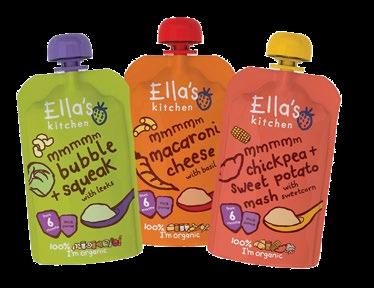
Alison Gopnik, a professor of psychology and philosophy at the University of California, Berkeley, has conducted studies that show four-year-olds perform better than older children and adults at solving a variety of problems.
“Thanks to their free-flowing creativity and playfulness, toddlers are the research and development
SIR KEN ROBINSON, 67, an Emeritus professor at Warwick University and government adviser on education, believes our creativity is stymied even before we reach adulthood and that schools should tell children that sometimes it’s OK not to conform. With 50 million viewers, his TED talk “Do Schools Kill Creativity?” is the second mostwatched of all time. “We don’t grow into creativity, we grow out of it. Or rather, we get educated out of it.”
With one month to go before his capital ran out, Paul Lindley
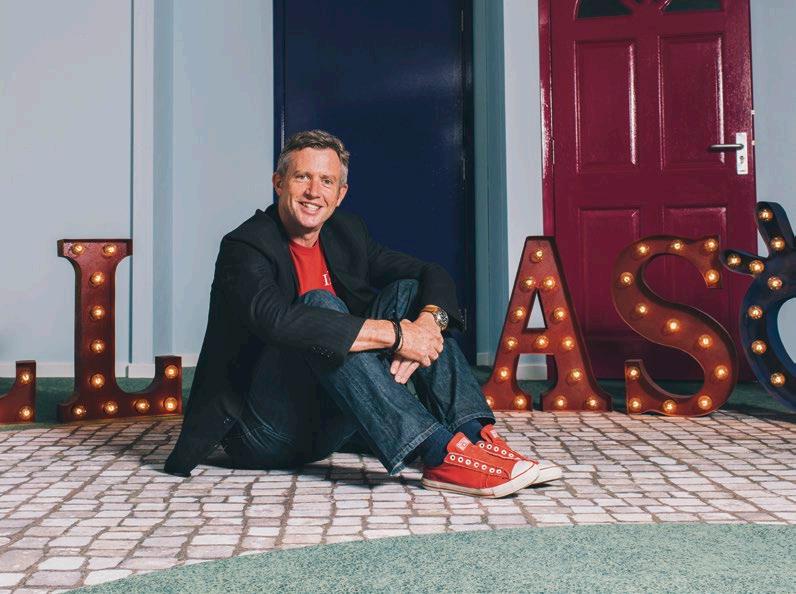
continued getting nowhere with food manufacturers and retailers. He had very few cards left to play and tentatively picked up the phone to one of the biggest names in the business, the buyer at Sainsbury’s.
“In order to keep going I had to tap into the best resource I had, the enthusiasm and tenacity of a child. I kept thinking what does a toddler do when it falls over? Gets up and try again, hundreds of times if necessary, so that’s what I did.”
Alison Atkin at Sainsbury’s immediately responded to Paul’s way of thinking. She found his orange, purple, yellow and red packaging
Having sold the company in 2014, Paul’s business card now reads, “Ella’s dad”
refreshing and loved his unorthodox combinations of sweet potato, pumpkin, apple and blueberries. More importantly, so did the baby and toddler market.
Within a year of launching Ella’s Kitchen from the comfort of his home near Henley-on-Thames in 2006, he was on the shelves of every major supermarket; and after 18 months, while still a one-man band, had £1m turnover. Today, the company has a presence in more than 40 countries with a £77m turnover and four years ago Paul sold it to the American brand Hain Celestial for £83m, though he
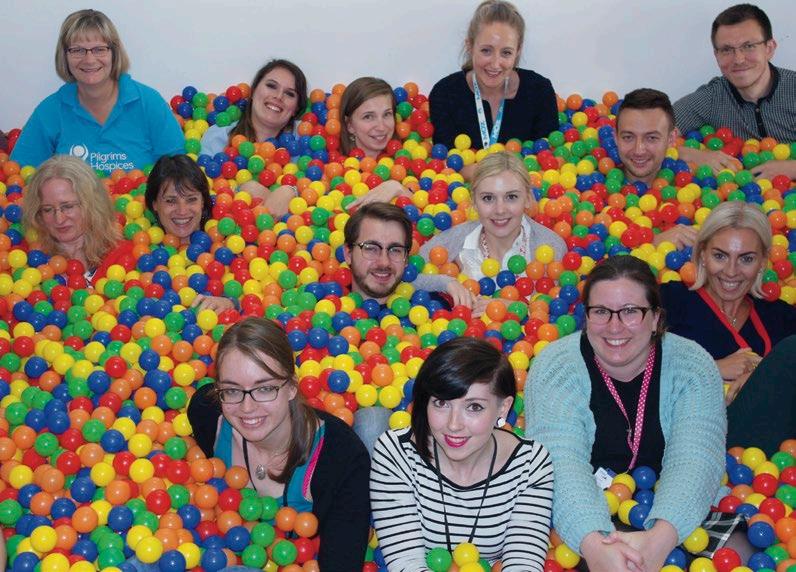

remains chairman. His business card lists his job title as “Ella’s dad.”
SINCE SELLING, PAUL’S been busy working on a number of programmes
Digital agency Sleeping Giant Media replaced the traditional meeting room with a ball pool
encouraging ethical business practices as well as writing a book called Little Wins, The Huge Power of Thinking Like a Toddler. In it he urges us, in the same way we had to grow up as children, to grow down.
“Growing down is about changing the way you think to become more open, curious and creative. It’s about changing the way you explore your surroundings and relate to the people around you. Try going a different way to work or look at the trees differently. Take yourself on a journey similar to the one you undertook as a toddler
when you first learned to smile, walk, talk and play.”
Lindley won’t hire someone unless they can demonstrate that they’re capable of thinking and acting like a child, a concept supported by Sir Richard Branson. When asked to give an example in his own company of a less creative department showing such ability, Paul laughs and cites how payroll have written “from our piggy bank to yours” on staff wage slips.
Darya Zabelina, a cognitive neuroscientist at the University of Colorado, Boulder, says: “Our creativity is boosted by anything that allows time for play and wonder.” She’s co-authored a study in which undergraduates who were told to imagine they were seven-year-olds responded far more inventively to the Torrance Test of creative thinking, than those who remained in their adult mindset. “When we’re having fun our mind isn’t locked onto something specific, allowing our brain to see different things and make new associations.”
Some businesses prize innovative thought and invest in seemingly frivolous equipment like giant slides and ping pong tables. At digital marketing agency Sleeping Giant Media in Kent, there’s a Lego wall, a games room and instead of meeting in a boardroom, staff and clients are encouraged to plunge into a neck-high pit of colourful plastic balls.
“Everyone has that inner child within them but sometimes it’s drilled out of us, particularly in traditional workplace environments,” says Luke Quilter, the company’s chief executive and co-founder. “We embrace that here and try to remember what it’s like to have fun.
By having fun, everyone becomes more creative.”
In eight years Quilter and his business partner Anthony Klokkou have taken their agency from his parents’ dining table to a company with 40 staff and an annual turnover of £1.6m.
Bosses beware. Children, it seems, have the midas touch.
COSMIC COCKTAILS
According to recent research from the Max Plank Institute, the Milky Way tastes like raspberries and smells like rum. They found that ethyl formate, a key chemical component for both raspberries and rum, can be readily found at the centre of our galaxy. Why not just soak the berries in the rum and call it a party?
SOURCE: THEGUARDIAN.COM
Celia Imrie, 65, is an Olivier Award-winning film, TV and theatre actress, and the author of several best-selling novels
If I Ruled the World Celia Imrie


Free samples would be available from our televisions. When the adverts come on I often think, I’d like to try that but I don’t necessarily want to buy the whole thing in case I don’t like it. So it would be helpful to have a button on our remote controls that we press when we like the look of something and a sample would pop out of our TVs.
Landfills would become a thing of the past. I don’t know what the solution is but the thought of all that rubbish sitting in landfills worries me dreadfully. We’ve got to find a way to reduce our waste. Supermarkets must get rid of all that horrendous plastic packaging. We should bring street markets back to our town centres and take our produce home in paper bags. We’ve made a lot of progress reducing plastic bag use but we can do more. I’d also like to change our attitude to what we now consider disposable items like washing machines

or even cars—why buy a new one when you can get your old one fixed?
I’d ban dummies. I mean those pacifiers that you see babies sucking. When I spot a gorgeous baby with a great big dummy I can’t believe it’s good for them to be so reliant on them for comfort. There’s nothing wrong with a bit of a cry. I also think any child over the age of five should get out of their buggy and walk.
There’d be no texting and earphones allowed on the streets. I’m afraid when I see someone paying absolutely no attention to what’s going on around them I’m inclined to bang into them and give them a fright. Why can’t we be in the moment and aware of our surroundings?
Chocolate bars would appear through the post on the first day of the month. This would happen by magic to cheer us all up. For me it would be dark mint or salted chocolate. I’d also ensure that every person over the age of 60 received a bottle of champagne on their birthday and had someone to share it with that very morning. There’s nothing like a frivolous glass of champagne to make you feel happy.
I’d enable people to give themselves a back massage. I know you can sit in those funny moving chairs but I find them rather creepy
and those electric back massagers are a bit stressful, which negates the point. So it would be much better if we were easily able to get to the sore parts of our necks and small of our backs with our own hands. How? I have no idea, but it would be blissful if we could.
Social media wouldn’t exist. I fear it’s making people lonely. We get sucked into our computers and phones and waste time doing distracting things. Personally, I think it’s rather grim to have someone unqualified criticising something that I’ve spent time working really hard on, like writing a book. I understand I’ve put myself out there to be judged but it’s cowardly to hide behind social media.
We’d be well read and well travelled. My darling mother used to say that was a good approach to life and I still have so many places to see and books to read. We must grab every second and dare to do things because we don’t know what’s around the corner. Without being dramatic I’m running out of time so I’m determined to go on exploring the world.
As told to Caroline Hutton
Celia’s novel, Sail Away, is out now (£12.99, Bloomsbury) and you can see her starring in Finding Your Feet and Monster Family















WITHOUT GIFTS IN WILLS, WE’LL ONLY EVER BE HALFWAY TO BEATING THE WORLD’S BIGGEST KILLERS
Half our pioneering work is nanced by gifts in Wills. As the UK’s largest independent funder of research into heart and circulatory disease, your contribution is vital.
By leaving a gift in your Will, you’ll help save even more lives from these diseases that are the world’s biggest killers.
For more information about leaving a gift in your Will, visit bhf.org.uk/wills, or call 0800 277 0004
Want to be bright as a button and quick as a whip? Hone your wits by harnessing the power of words, languages and mnemonics.
Secrets Smarter You to a
BY ANDREA AU LEVITT AND BRANDON SPECKTOR
How To Improve Your Memory
IN AN AGE when your refrigerator can help you manage your shopping list and your phone can answer almost any question, there’s less pressure on our memories. Which makes the feats of memory champions—who can recall hundreds of names and faces, random strings of numbers or words, or the order of multiple decks of cards—seem more superhuman than ever.
But here’s a nifty little secret about folks with phenomenal recall. In
Memory Championship) with those of 23 regular people of the same age, gender, and IQ, the scientists found only one difference: In the memory champs’ brains, the regions associated with visual and spatial learning and the regions associated with memory lit up in a specific pattern. In the regular people’s brains, these same regions were activated differently.
Why is that important? Because we learn by seeing, and the more we see, the better we remember. These super memorisers have perfected a method to convert items they want to remember (numbers, faces, cards, even abstract shapes) into pictures they “see” in their minds. It’s a process that’s called “building a memory palace”.
MEMORY CHAMPIONS’ BRAIN STRUCTURES ARE ESSENTIALLY THE SAME AS THE REST OF OURS
a study recently published in the journal Neuron, researchers found that super memorisers don’t have unusually large cerebral regions that allow them to absorb and retain prodigious amounts of information. Their brain structures are essentially the same as the rest of ours.
Comparing brain scans of 23 memory champions (who had placed in the top 50 at the World
Here’s how it works: First, you transform your target items into an image—anything you’ll remember. For instance, to remember card sequences, Ed Cooke (recognised as a Grandmaster of Memory by the World Memory Sports Council) told American author Tim Ferriss that he assigns each card a celebrity, an action, and an object; each three-card combination then forms a unique image with the celeb from the first card, the action from the second, and the object from the third.
So “jack of spades, six of spades, ace of diamonds” becomes the Dalai Lama wearing Lady Gaga’s meat dress and holding Michael Jordan’s basketball. Cooke’s system is built on



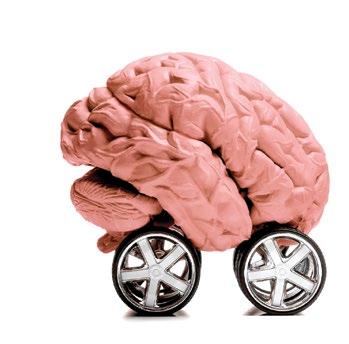
the idea that your memory hangs on to unusual cues better than mundane ones.
Then, mentally place that picture somewhere familiar to you: in your house or at some point along your commute, for instance. Finally, make up a story about the items, which will help connect them in the correct order.
Here are a few of our favourite tricks that can help you to remember things in your everyday life.
To Remember: New words Technique: Change routine
In a classic study conducted at the University of Michigan in the 1970s, a group of students studied a list of words in two separate sessions. Some studied in a small cluttered room and some in a space with two windows and a one-way mirror. One group of studiers spent both sessions in the same room, while the other split the sessions between the two
environments. During a test given in a completely different room, the students who studied in multiple places recalled 53 per cent more than those who studied in just one room.
Subsequent studies showed that varying other aspects of your environment (the time of day, the music in the background, whether you sit or stand, etc.) can also help recall. The theory is that your brain links the words (or whatever you are learning) to the context around you, and the more contextual cues you associate with the words, the more your brain has to draw upon when it’s trying to remember them.
To Remember: Your PIN
Technique: Count it out
You could use your birthday, of course, or your phone number, but identity thieves have a way of ferreting those numbers out. Instead, try this tip from Dominic O’Brien, an eight-time World Memory Champion. Write a four-word sentence, then count the number of letters in each word. For instance, “This is my PIN” = 4223.
To Remember: Facts & figures
Technique: Give yourself time
Mum was right, cramming isn’t the best way to memorise things. To learn and recall statistics (or pretty much any kind of factual information), reviewing the material periodically over a longer span
of time is far more effective than repeating it in a shorter one.
This technique dates as far back as 1885, when psychologist Hermann Ebbinghaus discovered that he could learn a list of nonsense words if he repeated them 68 times in one day and seven more times before being tested the next day. But he could learn the same number of words equally
students were separated into two groups. One group read a book in English while simultaneously listening to an English audio version; the other just read silently. Each week, all the students took a quiz. Those who both read and listened outscored the reading-only group on all eight quizzes.
To Remember: Faces
Technique: Focus on noses
REMEMBERING AND RECOGNISING FACES MAY BE A SPECIAL SKILL LINKED TO PERSONALITY
While some super memorisers specialise in associating names with faces, the memory-palace technique doesn’t work as well if the image of the face is cropped, normalised for color, or changed in any other way.
well by repeating them a total of 38 times over the course of three days.
More recent research has demonstrated optimal intervals for study sessions. If your exam is in a week, study today and then again in a day or two. If it’s a month away, study today and then wait a week before your second session. Three months off? Wait three weeks to restudy. The further away your exam, the longer the interval between your first two study sessions. (A final review the day before the test is also a good idea.)
To Remember: A new language
Technique: Read and listen
In a study conducted at the University of Puerto Rico, 137 Spanish-speaking
Remembering faces and recognising them in different contexts may be a special skill linked to personality. Extroverts are better at recognising faces than introverts, for example. Rather than focusing on eyes, as most people do, focus on the centre or to the left of a person’s nose. This allows you to take in their whole face.
To Remember: A grocery list
Technique: Engage your body
How often have you written your list—and then forgotten where you put it? In this variation on the memory palace, picture the items on your list with different parts of your body. For instance, imagine balancing a package of cheese on your head, an egg on your nose, and a bottle of milk on your shoulder.
Why Reading Matters
HERE’S A SIMPLE
QUESTION—answer it honestly, because your response could boost the amount of pleasure in your daily life, delay dementia, and even help you live longer. How many hours did you spend reading last week?
This question has arrived in thousands of American homes every other year since 1992 as part of the University of Michigan’s Health and Retirement Study (HRS). A minor item on a massive survey of 20,000 retirees, it had been long ignored in the analysis of elder brain health.
If you’re reading this, it’s safe to assume you don’t need to be sold on the merits of the written word. You may already be familiar with recent findings that suggest children who read books with their parents several times a week score higher on intelligence tests, and land better jobs

But in 2016, when researchers at the Yale School of Public Health dug into 12 years of HRS data about the reading habits and health of more than 3,600 men and women over the age of 50, a hopeful pattern emerged. People who read books— fiction or nonfiction, poetry or prose—for as little as 30 minutes a day over several years were living an average of two years longer than people who didn’t read anything at all.
Odder still, book readers who reported more than three hours of weekly reading were 23 per cent less likely to die between 2001 and 2012 than their peers who read only newspapers or magazines.



But recent research argues that reading may be just as important in adulthood.
When practised over a lifetime, reading and language-acquisition skills can support healthy brain functioning in big ways.
To understand why and what each of us can do to get the most out of our words, start by asking the same question the Yale team did. What is it about reading books that boosts our brain power whereas reading newspapers doesn’t?


For one, the researchers posit, chapter books encourage “deep reading.”
Unlike, say, skimming a page of headlines, reading a book (of any genre) forces your brain to think critically and make connections from one chapter to another, and to the outside world. When you make connections, so does your brain, physically forging new pathways between regions in all four lobes and both hemispheres. Over time, these neural networks can promote quicker thinking and may provide a greater defense against the worst effects of cognitive decay.
Secondly, reading books, especially fiction, has been shown to increase empathy and emotional intelligence.
One 2013 study found that participants who read just the first part or chapter of a story showed a noticeable increase
These findings may sound trivial, but they’re not. Developing social tools such as empathy and emotional intelligence can lead to more (and more positive) human interaction, which in turn can lower stress
PEOPLE WHO SPOKE TWO OR MORE LANGUAGES DEVELOPED DEMENTIA AN AVERAGE OF 4.5 YEARS LATER THAN MONOLINGUAL PATIENTS in empathy one week later, while news readers showed a decrease.
This could explain why, after death, many seemingly healthy elders turn out to harbour advanced signs of Alzheimer’s disease in their brains despite showing few signs in life. Researchers suspect it’s their cognitive reserve, that may allow some seniors to seamlessly compensate for hidden brain damage.
levels—both of which are proven to help you live longer and healthier.
That’s not to say that magazines, newspapers, and online articles are without merit. Reading anything that fills your mind and exposes you to new words, phrases, and facts seems to carry mental benefits. New research indicates that a large vocabulary may lead to a more resilient mind by fueling what scientists call cognitive reserve.
One way to think about this reserve is as your brain’s ability to adapt to damage. Cognitive reserve helps your brain cells find new mental pathways around areas damaged by stroke, dementia and other forms of decay.
So how does one build up cognitive reserve? That’s more good news for word lovers. Vocabulary is notoriously resistant to ageing, and having a rich one, according to researchers from Spain’s University of Santiago de Compostela, can significantly delay the manifestation of mental decline. When the team analysed vocabulary test scores of more than 300 volunteers aged 50 and older, they found that participants with the lowest scores were between three and four times more at risk of cognitive decay than participants with the highest scores.
Learning foreign words also offers important cognitive nutrients. In fact, research shows that learning something new, such as how to play an instrument or speak a second language, is one of the best things you can do for your brain at any age. Remember that powerful network of brain connections we get from reading? Successfully learning a second language grows that network; polyglots have been shown to be stronger at multitasking, at memorising, and better at focusing
on important information than monolingual speakers.
A 2013 study in Neurology discovered that patients who spoke two or more languages developed dementia an average of 4.5 years later than monolingual patients. And while a brain that learns a second language earlier in life will likely see more cognitive advantages than a late-life learner, it’s never too late. You don’t need to end up a fluent speaker, either. “Just having the basics of those linguistic connections can delay dementia,” Dr. Thomas Bak of the University of Edinburgh told the Atlantic.
Of course, learning a new language is no quick feat. Luckily, the payoff
from just a single lesson can provide instant gratification.
Researchers from Germany and Spain had 36 participants read two sentences containing the same foreign word: “Every Sunday the grandmother went to the jedin” and “The man was buried in the jedin.” When asked what jedin means, the folks who correctly guessed “graveyard” showed reactions in the same pleasure-sensing parts of the brain you’d expect from food, sex, gambling, and other satisfying stimuli. Though when it comes to words, overindulgence is encouraged.
Because it pays to increase your word power—today, tomorrow, and for the rest of your life.
CHEESY CANINES
These delightful dogs couldn’t feel happier:







PAY ATTENTION TO YOUR PENSION RETIREMENT AND PENSIONS ADVICE
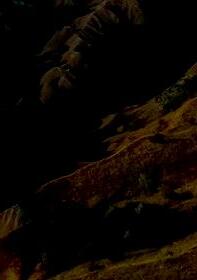
Flying Colours Wealth is proud to be partnering with Reader’s Digest to help give you the advice and guidance you need to plan successfully for a stress-free and fulfilled retirement.
You may be:

• Worried about the size of your pension
• Looking for ways to maximise your returns

• Confused about the options available
Whatever your worries, we’ll help you find the best solution.
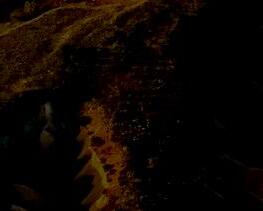
readersdigest.co.uk/pensions

BEST OF British
EASTER Events
From cute animals and egg hunts to wacky races and a beer festival, these Easter treats are sure to put a spring in your step

Country Tastic APRIL 5, WORCESTERSHIRE
Nothing says Easter like a trip to a farm to spend time with some adorable baby animals.
At the Three Counties Showground in Malvern this April, youngsters and oldies alike will gather to learn all about the importance of sheep, with fascinating spinning wheel demonstrations, the chance to meet and chat to sheep farmers and a live "Lamb Cam" showing all the action of lambing season as it happens.
Visitors can also watch amazing displays of pig agility in the livestock ring, tuck into cooking workshops and jump on board for some thrilling tractor and trailer rides.
Says head of show, Diana Walton, “Country Tastic is a lovely way to introduce youngsters to the wonders of the farming world. We always have so many excited little faces, as the children get to meet lots of cute and cuddly animals as well as alpacas and ponies.
“We’re hoping they’ll be able to see a few lambs being born on the day too via our Lamb Cam from Hall Hill Farm.”
■ Visit countrytastic.co.uk for more information
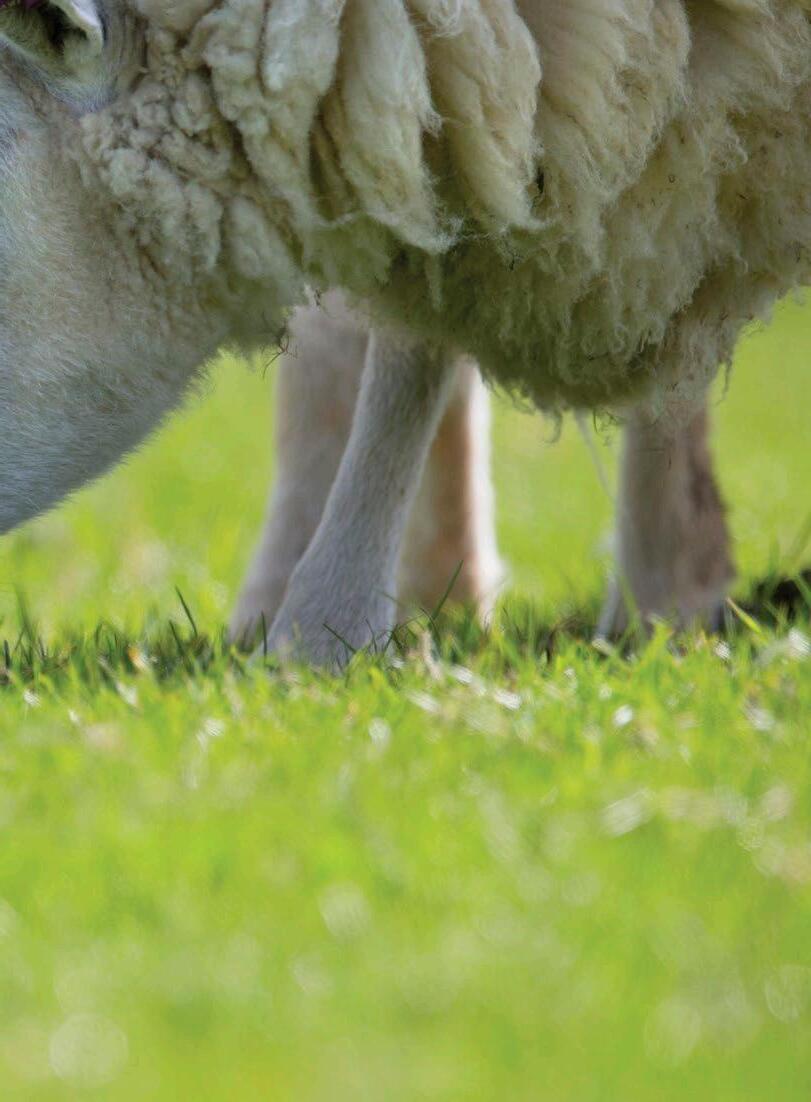
Oxford and Cambridge Goat Race
MARCH 24, LONDON
While the rest of London clamors around the Thames to take in the annual Oxford vs Cambridge Boat Race, a considerably cuter affair is well underway over at Hackney’s Spitalfields City Farm.
Two goats, one representing Oxford and one representing Cambridge (we kid you not), go head-to-head in a race to decide the winner, spurred on by a tasty bucket of food at the finish line.
2018 marks an impressive ten years of the race and the farm expects to welcome more than 1,000 guests to cheer on their four-legged, two-horned friends. As well as the main event, guests can expect musicians, food, cocktails and entertainment in what must surely be the country’s foremost goat-themed mini-festival.
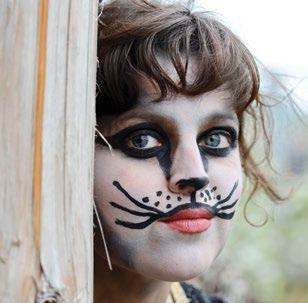
Proceeds from the event go towards the continued running of the city farm and last year’s race raised a whopping £18,000.
■ Visit spitalfieldscityfarm.org/events for more information

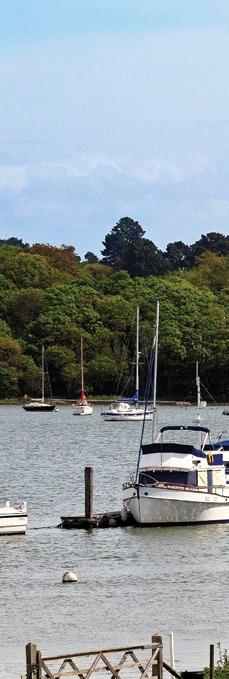
Canoeing in the New Forest, Throughout Easter OVER EASTER, HAMPSHIRE
This is an egg hunt with a serious twist—the participants embark on their search from the comfort of a Canadian-style canoe.
Paddling along the New Forest’s idyllic Beaulieu River on a magical two-hour guided tour, visitors can take in the sights before leaving their boats behind to begin the Easter search in earnest.
Says marketing coordinator Matthew Kitcher, “Easter is the perfect time of year to visit the New Forest. With spring in full force, the

forest takes on a new colour palette with fresh greens and trumpeting yellow daffodils. It’s also the best time of year to come and see the New Forest ponies, which can be found wandering around with their newborn foals.”
■ Visit newforestactivities.co.uk for more information
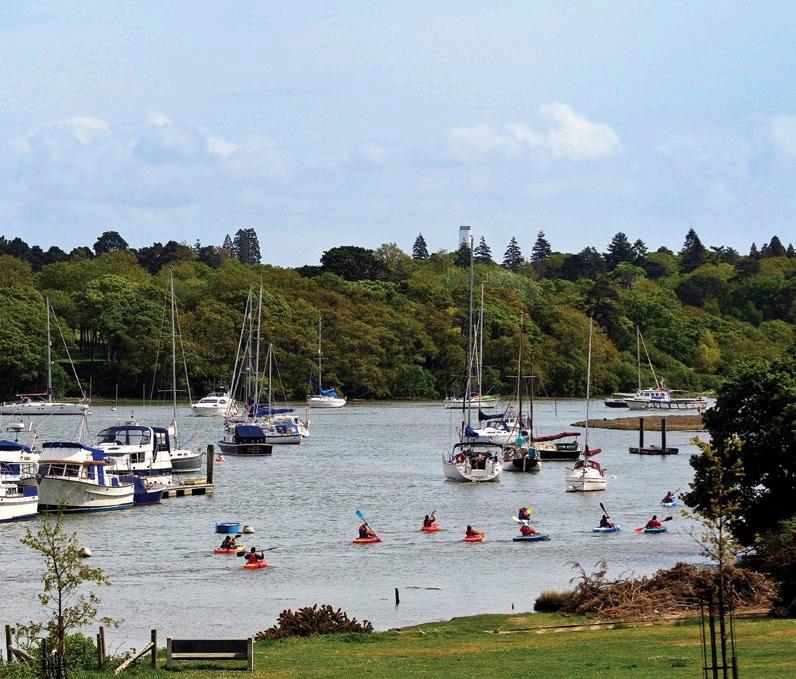


Dreamland
MARCH 30 – APRIL 15, MARGATE
Dreamland Margate's huge festival feel means you won't be short of Easter activities to entertain the whole family.
From a 50ft inflatable children's theatre installation intriguingly dubbed "The Whale", to story time with Peter Rabbit himself and live action from the British Juggling Competition, the question won't be what to do, but what to do first.
Says senior creative producer Rebecca Ellis, "With a spectacular programme of music, culture and a range of exciting new rides, we think there's something for every generation to enjoy. We’re passionate about delivering an accessible festival experience, whilst also adding a touch of the unexpected to appeal to all generations throughout the year."
Don't forget to allow time to sample the delicious array of street food and soak up the exciting atmosphere of the vintage fairground.
■ Visit dreamland.co.uk for more information

Design Your Own Egg OVER EASTER, YORK
If your Easter is all about the chocolate, then what better way to spend the bank holiday than creating an egg even Fabergé would envy?
At the York Cocoa House, chocolatiers are leading mouthwatering egg-making workshops, perfect for any chocoholic craving something extra special.
“Come and join us in our chocolate workshop to create your

very own Easter egg,” says events manager Sebastian Bales. “You will hand paint your own personal design into your egg mould before choosing your favourite chocolate to craft your egg from. You will then be beautifully packaging your creations to take home and show off or share!”
■ Visit yorkcocoahouse.co.uk for more information
Mountain Escapes
Easter Hunt
APRIL 1, GWYNEDD
Take in the dramatic views across North Wales’s magnificent Moelwynion mountain range on a gentle two-mile walk as the kids rush about searching for an elusive golden egg, collecting smaller chocolate treasures on their way.
Says organiser Ian Cooper, “Our event is an Easter egg hunt with a twist. Step back in time and visit the old mining world of Rhosydd. Set in the heart of the Snowdonia
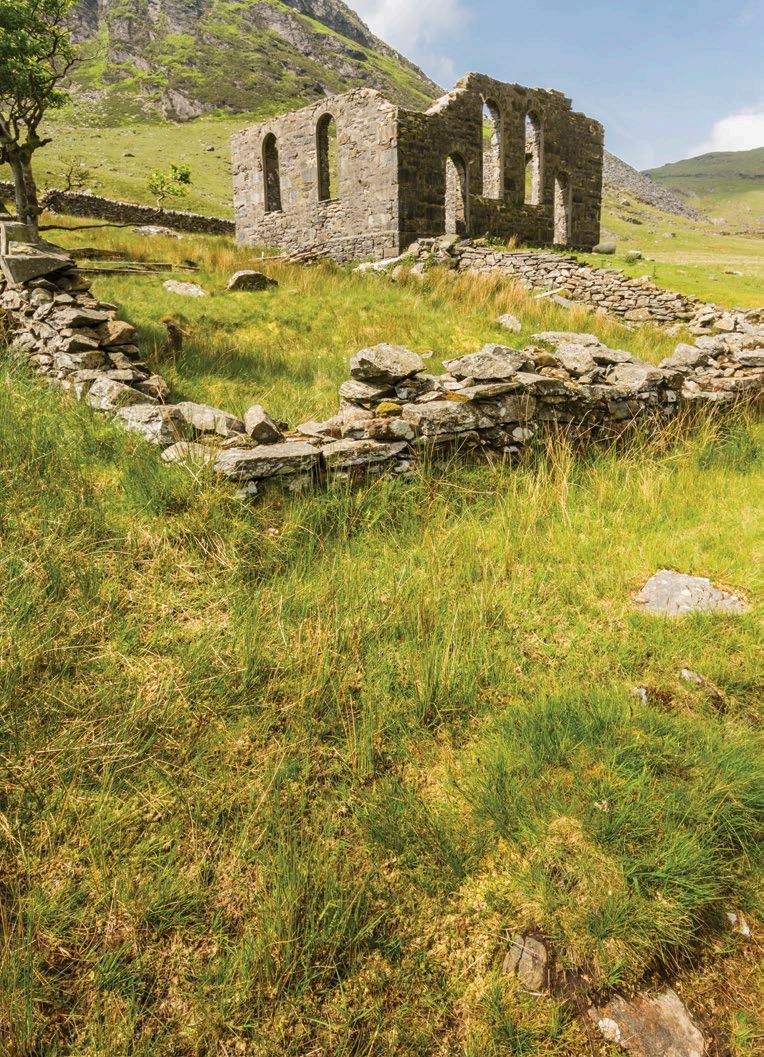
mountains 150 years ago, it used to be a hive of activity with people living and working in dangerous conditions for very little pay. It’s a great way to get kids outdoors for a fun adventure while learning about the past.”
Be sure to wrap up warm with enough pockets to smuggle home your chocolate haul.
■ Visit cliftoncathedral.org for more information

Beer Festival
MARCH 29 - APRIL 1, WIRRAL
If the only hops you want to encounter this Easter come from beer, not bunnies, the Wirral Easter Beer Festival at Port Sunlight’s Hulme Hall is the place for you.
With over 100 real ales, 50 ciders and 100 craft, US and continental beers, there’s something to satiate every taste. Expect music and festivities every day except Friday afternoon—that’s the dedicated quiet session for those who only want to focus on the pints.

Says festival organiser Ben Garner, “The festival offers a range of over 300 beers including real
ales, lagers, keg beers and ciders sourced from around the world. We keep a local feel to the event with our very own Flagship beers alongside other popular regional breweries. It’s usually a packed event with over 3,000 people attending, with local bands providing entertainment across the weekend and food available from local providers.”
■ Visit theshipandmitre.com/ festivals for more information
Do you have big plans for the Easter weekend? Email us and let us know at readersletters@readersdigest.co.uk
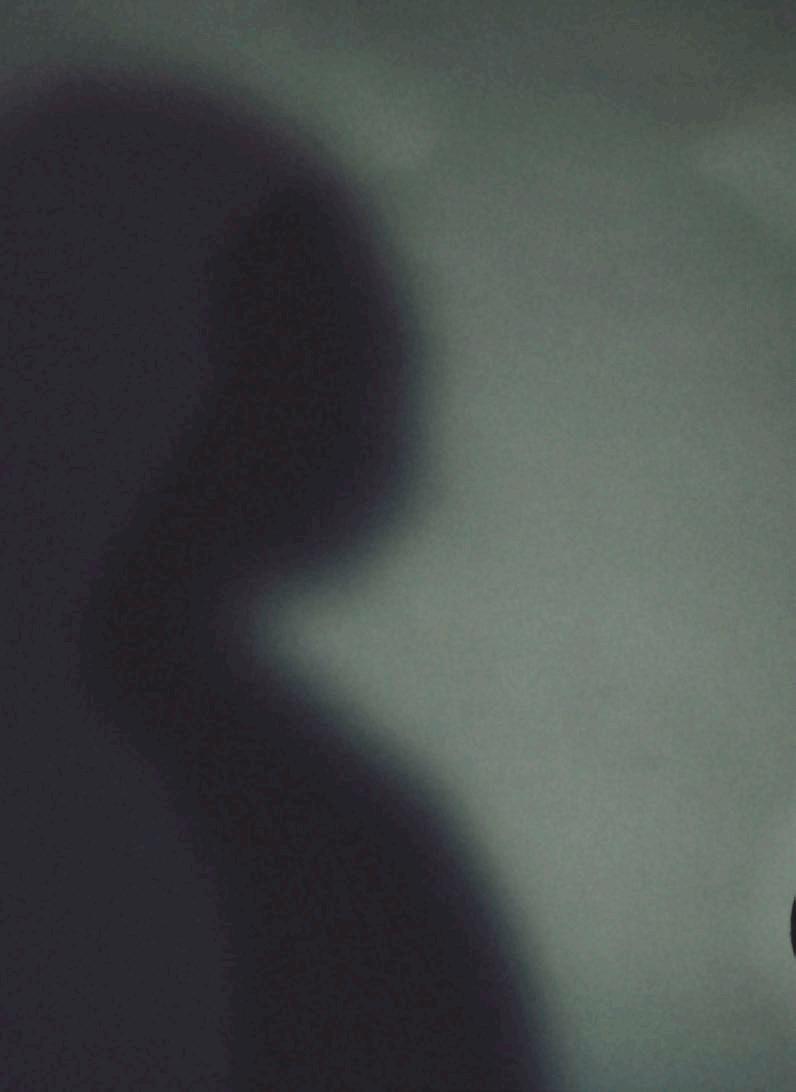
SARAH M c GUINNESS
The Emmy-nominated British producer, director, composer and screenwriter steps into her musical alter-ego in the form of her new album
Seductive, strong and sassy... charismatic UK singer/songwriter Sarah McGuinness is a woman on a musical mission to thrill. With glamour as her weapon and the lyrical pen as her sword, this steely woman of mystery pulls on the mantle of her melodic alter-ego and steps into the limelight with her debut album ‘Unbroken’.
By day she’s Sarah Townsend, the internationally renowned movie director, producer and screenwriter, whose most notable works include Emmy-nominated documentary ‘Believe’ (the lyrically-told inside story of Eddie Izzard); and the multi award-winning ’Noma: Forgiving Apartheid’, the tale of Noma Dumezweni, the acclaimed actress who shot to fame with her portrayal of Hermione in the smash hit play Harry Potter and the Cursed Child.
By night the music takes over and out struts her alter-ego, Sarah McGuinness, leaping into action like The Avengers’ Emma Peel. Immersing herself in the glamour and intrigue of the 1950s & 60s silver-screen. Flipping inside out, and confidently revealing an unseen inner core, Sarah plucks at snapshots of her
real life and delivers them melodically with all the strength and glamour of a 50s movie goddess.
Steered by English producer Ed Buller (Suede, Pulp, The Raincoats and The Courteeners), the album ‘Unbroken’ is an epic masterpiece which lifts spirits whilst provoking thought. Dramatic and compelling, ‘Unbroken’ is a reminiscent jaunt back to the heady days when women fused glamour with concealed strength.
For a long time, Sarah McGuinness had a lot to say, but it’s taken until now for her to refine how she said it. ‘Unbroken’ is for the women of the world (and the men with ears to listen). Strutting back to the time of the silver-screen, when steely women were seen as glamour-kittens, with intriguing stories to tell and more drama in their lives than we seem to have today; Sarah McGuinness reminds women of what they can really achieve.
Fuse Marianne Faithfull, Sandie Shaw and Dusty Springfield with the spirit of Lulu and a dash of silver-screen mystery, serve shaken (not stirred) and embrace with the wisdom of a modern girl—then you’ll enjoy

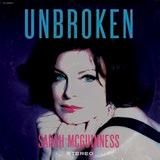
The debut album ‘Unbroken’ from Sarah McGuinness is out now:
https://fanlink.to/SMUnbroken
FOR MORE INFORMATION
sarahmcguinness.com
facebook.com/sarahmcguinnessmusic
twitter.com/SarahMcGuinness





UNIQUE THRU-FLOOR SYSTEM







Designed to make your life easier when stairs start to become too much, a Stiltz domestic lift will easily fit into any home. Often chosen as an alternative to cumbersome and unattractive stairlifts, a Stiltz Lift will transport 2 people comfortably so you can transform your life without moving home. A Stiltz lift is packed with sensors to keep everyone safe, it also plugs straight into a domestic socket, runs very quietly and uses less energy than a toaster!
• Quick and easy to install
• Advanced safety features
• Small footprint
• Battery back up
• Flexible positioning options
• Wheelchair model available
• 12 month ‘no quibble’ guarantee
• Cost-effective and affordable
• Fast-track delivery available
• Install in a day*


Ilookedatmovingcostsandworkedout thataStiltzLiftwouldbecheaper.Thelift hasalreadymadethingsmucheasier. It’s been the best decision. Ms. Turner, Hereford “ “
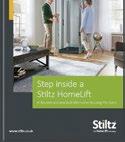




A SUNSHINE
Of Mind STATE
Slowing down and exploring Queensland, Australia’s holiday haven
BY EVA MACKEVIC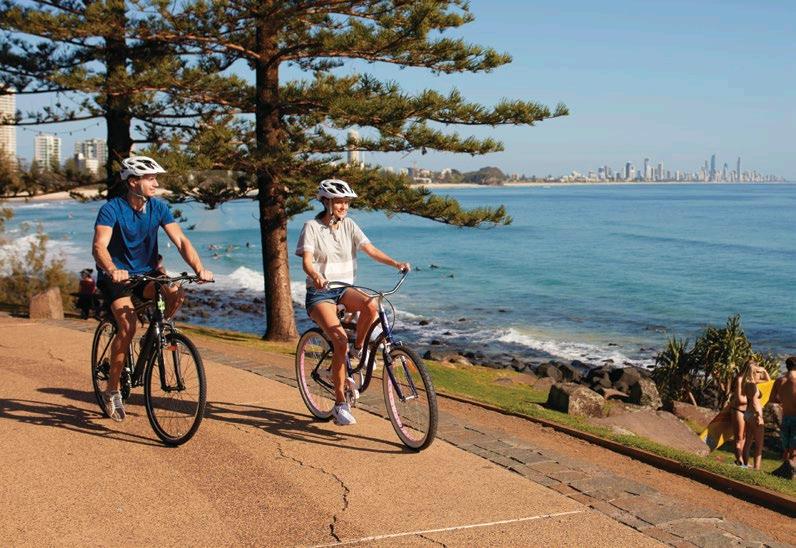
“In Brisbane, even if you go out on your own, you’re never alone for very long. Someone will come up to you within 15 minutes and invite you to join their group.” I’m chatting with Lauren over a beer in the laidback Botanical Bar and Kitchen on James Street. She’s a Canadian expat who moved to Brisbane two years ago— and the living proof of what she just said: I met her just moments ago, when I stopped by the bar on my evening stroll back to the hotel.
It’s my first night in Brisbane on my very first trip to Australia and I can’t help but buzz with excitement; the sultry day has turned into a
delightfully balmy evening—the kind that’s perfect for exploring this bustling city.
As I soon find out, the friendliness of the locals permeates Brisbane’s entire city culture. Wherever you go, you’re met with an chirpy “G’day, mate”, genuine interest in who you are and an anecdote or two that’ll almost certainly lead to an interesting conversation and, who knows, maybe even a new friend.
The next morning, we feast on a breakfast of crushed avocado on sourdough and delicious coffee— Aussie specialities that started a craze back in the UK—at the cosy





EVEN IF YOU GO OUT ON YOUR OWN, YOU WON’T BE ALONE FOR VERY LONG— SOMEONE WILL INVITE YOU TO JOIN THEM
café Gauge in South Brisbane. It’s only 8am on a Saturday morning but the café’s already full of visitors, filling the room with relaxed chatter over the hissing and whistling of the coffee machines. We’re getting ready
for our first stop, Lone Pine—the world’s first and largest koala sanctuary, and home to 100 species of Australian animals.
Amused by brush-turkeys and geckos roaming back and forth as if they’re pigeons, we make our way to the koalas. The bristly little marsupials aren’t really interested in the tourists snapping pictures, captivated by their cuteness. They lounge around in the sun, chewing on eucalyptus leaves without a care in the world.
The kangaroos, freely hopping around the grounds, turn out to be much more sociable creatures. I approach one of them with a

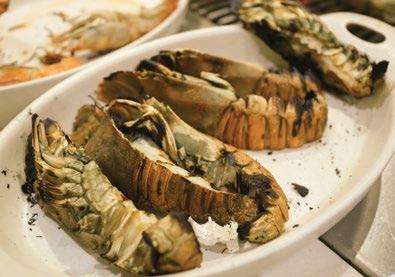
handful of snacks, expecting it to be shy, but instead it grasps my wrist with both arms and quickly, but politely, inhales the food. A child standing next to me looks like this is the best thing they’ve seen in their whole life, so I hand them my sachet of snacks and go off in search of the emus and dingoes.
IF YOU WANT TO EXPLORE the city properly, there’s no better way than travelling by bike. We meet our guide, Leith—a bubbly young Brisbanian who swapped his career as an engineer for leading bicycle tours—at the South Bank’s Wheel of Brisbane (the Aussie equivalent of

FLOATING ABOVE GROUND ON STILTS, QUEENSLANDERS LOOK LIKE SOMETHING OUT OF A WES ANDERSON FILM
the London Eye).
After ensuring our seats are properly adjusted, helmets fastened and layers of sunscreen applied, we set off along the snaky Brisbane river. As we tour the inner city, we
The “Queenslander” is a classic piece of Australian architecture; (bottom left) Moreton Bay Bugs

cross over the majestic Story Bridge, pass the Kangaroo Point Cliffs, heaving with early-morning rock climbers, and roll through the City Botanic Gardens in the freshening shade of grand, ancient trees.
As we cruise down to the quieter, charming suburb of New Farm, we pass numerous “Queenslanders”— the city’s iconic colourful timber houses built in the 1920s. Floating above ground on stilts, with their incredibly high ceilings and extensive, plant-covered verandas, they look like something out of a Wes Anderson film.
Later that day, we head to Mt Coot-tha, the highest peak in
Brisbane, for lunch at the Summit Restaurant, where we enjoy an elaborate three-course meal while admiring the spectacular panoramic views of the city. I sample the famous local delicacy I’ve been hearing about: grilled Moreton Bay Bugs. I’m sceptical when a plate of bizarre, insect-like crustaceans arrives in front of me, but the taste more than makes up for their peculiar appearance; sweet and fresh in flavour, creamy and tender in texture, they’re nothing short of the finest lobster meat.
Lunch is followed by a trip to the Queensland Gallery of Modern Art (GoMA)—a beautifully designed, airy space with a heavy focus on Aboriginal culture and Asian contemporary art. After a day of intense sightseeing, I take my time wandering through the gallery, admiring the arresting ceremonial headdresses and thought-provoking photographs, noting down the names of unheard-of artists to look up when I get home.
THE GOLD COAST
A popular destination with surfers and sightseers alike, the Gold Coast is a laidback holiday destination, boasting beautiful long beaches, where you can dig your feet in the squishy warm sand or take a swim in the clean, bluish-green ocean.
Between April 4–15, the city will host the 2018 Commonwealth
Games, welcoming athletes from 70 Commonwealth nations. The excitement of the locals is palpable: countdown clocks are scattered across the coastline alongside art installations, karaoke stations and music acts, and the first question anyone asks is: “Will you be staying for the Games?”
It’s easy to see why. As we visit a few of the venues where the sports will be held, I quietly begin to scheme ways of extending my stay here, swept up in the excitement. From the glistening swimming pool of the Optus Aquatic Centre to the sheer grandeur of the Carrara Stadium where the opening and closing ceremonies will take place, everyone is doing their best to make sure that the Gold Coast is the perfect host.
IT’S OUR NEXT STOP, however, that I’ve been anticipating the most: the Jellurgal Aboriginal Cultural Centre. As I know little about Aboriginal culture or its current state in Australia, I’m eager to learn about it straight from the source. Run by the local Aboriginal community, the centre strives to preserve and share their traditions. We’re welcomed by a group of charismatic Yugambeh people who tell us about their culture, as well as the issues Aboriginal people face in Australia today.
“Our parents and grandparents



weren’t allowed to speak the language, dance or dress up, because they would get punished. So now we’re celebrating our culture and making sure that our children know who they are. It’s important for people around the world to know their identity—a lot of social issues stem from not knowing who you are,” explains Luther, our guide. They then perform a series of
OUR PARENTS WEREN’T ALLOWED TO SPEAK THE LANGUAGE OR DANCE
BECAUSE THEY WOULD GET PUNISHED
ceremonial dances and songs, wearing traditional body paint and costumes. Every dance, they tell us, is related to a particular ritual such as hunting birds or fishing. The trance-like sounds of the didgeridoo, rhythmic stomping and mesmerising moves transport us to a whole different world, steeped in ancient mystery.
As we say our goodbyes, Luther puts some white ochre—traditional clay earth pigment—on our hands to “bring us blessings and ask their ancestors’ spirits to look after us as we travel through their country.” It’s a moving moment and we leave the centre in high spirits.
For our final day we head off to Tamborine Mountain in the hinterland. We drive up the steep, twisty mountain road, feeling the air turn crisper and cooler as we climb. We pass more beautiful Queenslanders, tucked away in remote corners of the mountain,

many of them on steeplysloped terrain.
When we finally reach our destination, Tamborine National Park, the entrance doesn’t look like much; a sign pointing to a dark, narrow gap in the trees. But once we step inside, we find ourselves in the middle of a real rainforest. The hot, humid air fills our lungs as we make our way down the narrow path with lorikeets and eastern whipbirds chirping high above our heads.
Our guide, Graham, points out peculiar trees (like the dangerous gympie gympie tree with tiny stinging hairs that feel “like hot acid”), the burrows of poisonous trapdoor spiders and the spellbinding glow worms. But the real treat is waiting for us right at the end of the bushwalk as we reach a breath-taking waterfall drowning out the noisy lorikeets and our own chatter. We freeze and stand there in silence with nothing but the soothing sound of rushing water around us, oblivious to the speeding world outside.
TRAVEL TIPS
BRISBANE
Sage Hotel James Street, snhotels. com/sage/james-street-brisbane; from AUD$189 for a standard Queen room
Summit Restaurant, brisbanelookout. com/summit-restaurant-and-bar; AUD$42.50 for a three-course sunset dinner
Lone Pine Koala Sanctuary, koala.net; AUD$36 for an adult
Brisbane by Bicycle, brisbanebybicycle.com.au; guided tours from AUD$69
The Queensland Art Gallery | Gallery of Modern Art (QAGOMA); qagoma. qld.gov.au
GOLD COAST
Gold Coast Commonwealth Games, gc2018.com
QT Gold Coast, qtgoldcoast.com.au; from AUD$265 /night
Jellurgal Aboriginal Cultural Centre, Tours and Information Hub, jellurgal. com.au; AUD$20 for a Jellurgal Walkabout admission
Southern Cross 4WD Tours Gold Coast, sc4wd.com.au; AUD$88 for a half day Tamborine Tour
TO LEARN MORE ABOUT QUEENSLAND AND HOLIDAYING IN AUSTRALIA, VISIT QUEENSLAND.COM & AUSTRALIA.COM
GERANIUM BREEDER’S MIX
Supplied as mature bare roots guaranteed to flower this year

A RARE OPPORTUNITY TO BUY EXCLUSIVE GERANIUM TO FLOWER THIS YEAR
World renowned Geranium breeder Marco Van Noort has agreed for us to offer you a unique collection of fully hardy Geraniums which will weave a tapestry of colour. Marjory Fish created a garden at East Lambrook Manor and used to say “when in doubt plant a Geranium”. We agree, as they are incredibly floriferous, one of the easiest plants to grow, attractive to bees yet unpalatable to rabbits and slugs. Create undulating pillows of colour for groundcover or plant individually. Unfussy on soil conditions in sun or part shade. Height and spread of individual plants will range from 1590cm (6-36"). Your order will be confirmed and your fully mature bare roots will be delivered with our no quibble guarantee within 14 days.
World renowned Geranium breeder Marco Van Noort has agreed for us to offer you a unique collection of fully hardy Geraniums which will weave a tapestry of colour. Marjory Fish created a garden at East Lambrook Manor and used to say “when in doubt plant a Geranium”. We agree, as they are incredibly floriferous, one of the easiest plants to grow, attractive to bees yet unpalatable rabbits and slugs. Create undulating pillows of colour for groundcover or plant individually. Unfussy on soil conditions in sun or part shade. Height and spread of individual plants will range from 1590cm (6-36"). Your order will be confirmed and your fully mature bare roots will be delivered with our no quibble guarantee within 14 days. BUY 6
A RARE OPPORTUNITY TO BUY EXCLUSIVE GERANIUM TO FLOWER THIS YEAR
Where the Meets Pasture Sea
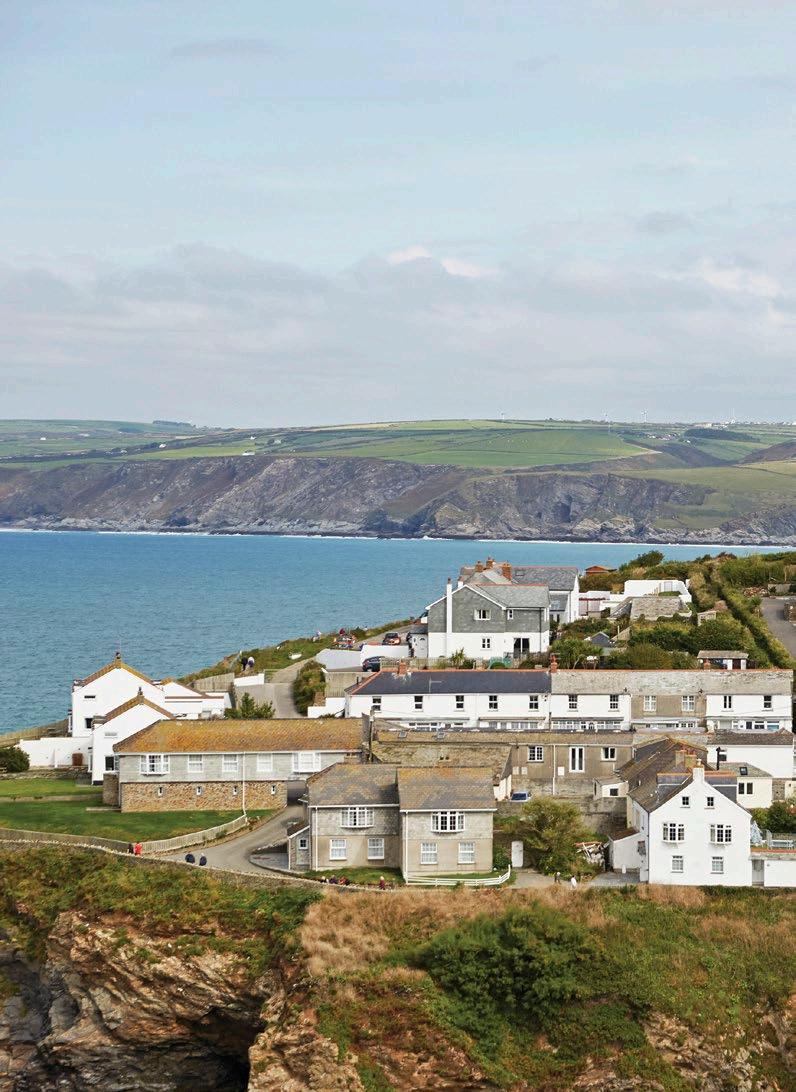
The picturesque fishing village of Port Isaac dates to the 14th century.
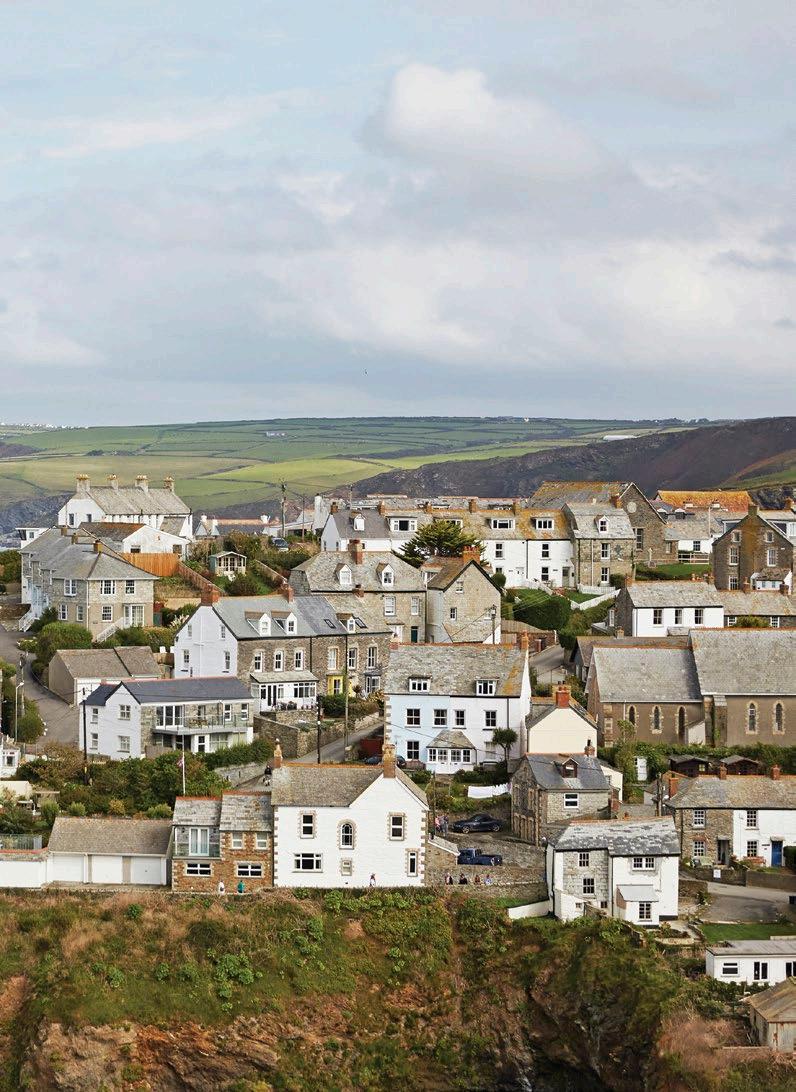
In Cornwall, old traditions give way to something new as chefs, farmers and fishermen transform their pastoral corner into a culinary EdenBY JEFF CHU
ON AN AUGUST DAY, Tom Adams and April Bloomfield splashed through a stream and then crossed a field behind Coombeshead Farm, their 18th-century Cornish farmhouse. The two chefs—he in London and she in New York—had turned their property, located near Lewannick, into an inn and restaurant. They were expecting dinner guests that evening, and the afternoon’s mission was to forage ingredients—wild sorrel, blackberries—for the meal.
We passed wild watercress, common hogweed (whose seeds taste of citrus) and pineapple weed, which offered an instant olfactory trip to the tropics. The sorrel we gathered would go with pig’s-head rillettes. The blackberries were destined to accompany some traditional Cornish cream. “Such abundance,” April said.
We skirted a streamside forest. Suddenly, the two unleashed a litany of expletives. The object of their awe was in a tree: a Chicken of the Woods mushroom about the size of a human head. Within hours, it would be transformed into the best version of itself, bearing the wood-fired oven’s char, the fragrance of thyme and garlic, and the glow of Cornish butter. It was an expression of Cornwall itself—unexpected, unfussy and gorgeous.
Tom and April aren’t the only
outsiders to realise the fertile promise of Cornwall. Some of our country’s most inventive young chefs and entrepreneurs are settling here and finding inspiration in the region’s traditions.
Together with Cornish farmers and fishermen, they are sparking a profound, renewed confidence in the bounty of this land. What’s old is new again—and it tastes phenomenal.
BEFORE ARRIVING at Coombeshead Farm, my husband, Tristan, and I spent three days hiking 25 miles of Cornwall’s South West Coast Path, from Boscastle to Padstow. The path traverses slope after seaside slope, some so steep that we ascended and descended by earthen staircase. Gulls squawked but kept their distance, much as the locals did.
Everywhere we went, they were welcoming but reserved, embodying the ambivalence that the Cornish have about outsiders. Legend has it that when Saint Piran, one of Cornwall’s patron saints, arrived, having floated on a millstone across the Irish Sea, his first converts weren’t people—they were a badger, a fox and a boar.
It’s easy to see why outsiders still come to this fat finger of land, which points from our southwestern-most corner across the Atlantic. Though Cornwall contains some of England’s poorest neighbourhoods, it’s rich in
PHOTOS BY SIMON WATSON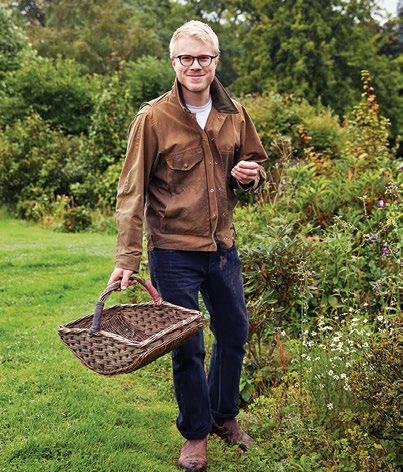
heritage and beauty. Every hill on our hike brought new vistas, every bend a different field—this one framed by an ancient stone wall, that one filled with golden rapeseed blossoms.
Just as abundant: the stories, stretching back centuries. In Trethevy, we sat for a few silent minutes in a medieval chapel dedicated to Saint Piran. In Tintagel, we clambered amid the cliff-top remnants of what legend has dubbed King Arthur’s Castle. In several places, we marveled at gravitydefying seaside towers, souvenirs of Cornwall’s quarrying days.
For sustenance as we walked, we bought savoury pasties in each town. Once, the miners took these thick pastries, filled with beef, potatoes, and onions, down into the tin and copper mines as a practical, all-inone meal. Discarded remnants of
Chef Adams forages ingredients; St. Enodoc, Trebetherick, was once almost completely buried in sand

crusts were reputedly scavenged by knockers, elf-like creatures believed to inhabit the mines.
A few miles past Trebarwith Strand, we passed a flock of sheep grazing in a cliff-top pasture. I confessed to my husband I was thinking about mutton stew and lamb chops. He chided me. “What are you thinking about?” I asked him. He smiled sheepishly and replied: “Sweaters. And sheepskincovered seating.”
WE ENDED OUR HIKE in Padstow, a foodie destination, which owes its culinary stardom to celebrity chef Rick Stein, who opened his first seafood restaurant in Cornwall in 1975. One evening, we dined at his casual restaurant Stein’s Fish & Chips. The lemon sole in a perfectly crisp batter was heavenly—the fact that we
had to pay one pound for tartar sauce, less so.
The establishment is one of ten Padstow businesses owned by Stein, including four restaurants, a café, delicatessen, bar, patisserie, fishery and gift shop. Stein’s success has downsides, as does Cornwall’s emergence as a gastronomic destination. The complaints? Crowds in Padstow, whose population swells from about 2,500 to 5,500 during peak season. Commercialisation, too: Stein’s empire can feel corporate and over-branded.
The upsides of success? Hundreds of jobs, as well as a magnetism that attracts tourists and culinary talent. Nathan Outlaw, who originally came to cook in one of Stein’s restaurants, now has five of his own—two in Port Isaac, one in Rock, and two outside of Cornwall—and they have four Michelin stars among them. When I asked what rejuvenates him, he thought for a moment. “Callum, one of my fishermen, who does all the crabs and lobsters,” he said. “From the restaurant, I can watch him get his pots, day in and day out, rough weather—whatever. That’s an inspiration.”
Another recent non-native entrepreneur is Tarquin Leadbetter, proprietor of the six-year-old Southwestern Distillery. Raised in Devon, he spent several years in London before settling here. “I wanted to quit my desk job, go surfing
in the morning, and make gin in the afternoon,” he said.
Tarquin now lives that dream on Constantine Bay Beach, a crescent of golden sand. Though his gin and pastis have quickly accumulated prizes, including the title of Best Gin at the 2017 World Spirit Competition, nothing else happens fast at the distillery. Everything is made in small batches, mostly in hand-hammered copper pot stills. For his gin, Tarquin used to grow violets in his garden, and for his pastis, forage for wild gorse flowers, which lent the spirit a hint of coconut.
Cornish patience can be misinterpreted by people elsewhere in Britain. But conservation of Cornwall’s natural balance is a key metric of success, claims Saul Astrinsky, a native Cornishman who owns the Wild Harbour Fish Co. His six-year-old company, which he runs with his wife, Abi, sells seafood to some of London’s top restaurants.
All of his fish are caught by rod, handline, or inshore trawls and pots— the most sustainable methods—and he pays his small-boat suppliers premium prices. “There are lads who pick winkles off the rocks for us, and we’re now doing mussels, lobsters, crabs,” he told me, “We’ve got to be careful not to ruin this.”
His landlubbing counterpart might be master butcher Philip Warren, whose butchery has been offering meat from Bodmin Moor since 1880.
Though often stereotyped as bleak and moody, the moor is a vibrant ecosystem of granite and peat, hill and marsh.
The cattle that Philip’s suppliers raise are accustomed to the bitter grasses growing in the moor’s acidic soil. “The cattle are tending the moor, and the moor is tending the cattle,” Philip said. “If you didn’t have the cattle, in five years, the moor would be overgrown.”
Philip and his farming neighbours have found new life by marketing their unique, naturally organic meat to chefs from Cornwall to London. Business has tripled during the past decade, and he now has a long waiting list. He lauds consumers’ shifting preference for grass-fed beef, which is typically richer in flavour. “We live in an imperfect world of farming. And we’re really quite happy about it.”
Really, the entrepreneurship is just a new version of an old story: neighbour caring for neighbour. “All we want,” Warren said, “is for people to keep making a living in this ageold way.”
FARMING “IS HAND-to-mouth living” for most Cornish families, Mark Hellyar told me. His family raises lambs and grows barley on 162 acres outside Padstow. The dairy farms that once dotted the region are mostly gone, including his family’s. The costs were too high, revenues too low.
Today, part of the family land is a
A
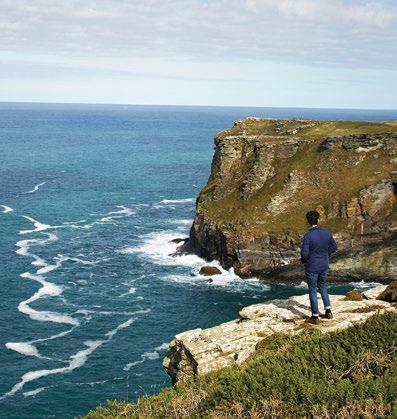
caravan park. Over eight weeks each summer, they reap four times as much revenue from trailer fees as they do annually from barley and lamb.
Mark also owns vineyards in France and fantasises about planting some grape vines here. He jokingly speculates that the product, like Cornwall’s people, would be robust “and maybe a little salty.”
One reason he’s been able to dream: European Union subsidies. By holding at least 4.8 hectares, one becomes eligible for yearly subsidies of, in Hellyar’s case, £15,000 per year. Thanks to Brexit—when a strong majority of Cornish voters backed leaving the EU—“that’s all in doubt now,” Mark said.
Farming’s decline has also meant opportunity for enterprising businesspeople like Tom and April. Coombeshead Farm is welcoming, understated, unpretentious. The five bedrooms are simple but comfortable.
WHERE THE PASTURE MEETS THE SEA
House manager Lottie Mew, Tom’s girlfriend, makes the soap with homegrown lavender. The point of it all, noted April, is rest. “Everything today is so transient, so fast,” she said. “Let’s slow down a minute.”
Guests are welcome to watch as Tom and his team cook. One afternoon, he sent me to the garden to harvest lettuce for that evening’s salads; the next morning, I went to collect eggs for breakfast. “There’s a charm in something unrefined,” he said. “We want to create a place that not only fills the stomach but also makes guests feel at home.”
Tom and April imagine
TRAVEL TIPS
n LODGING Avalon Hotel, Tintagel, doubles from £94, theavalonhotel.co. uk; Coombeshead Farm B&B, Lewannick, doubles from £174, and prix fixe dinner for £65 per person Thursday-Sunday, coombesheadfarm. co.uk
n DINING Golden Lion Inn, Port Isaac, harbourside, main courses £8-18, thegoldenlionportisaac.co.uk; The Mariners Public House, Rock, overseen by chef Nathan Outlaw, main courses £15-25; themarinersrock. com; Paul Ainsworth at Number 6, Padstow, modern Cornish cooking, main courses £32-45, paul-ainsworth. co.uk; Stein’s Fish & Chips, Padstow, entrées around £11, rickstein.com
Coombeshead might become more than an inn. April grew up in Birmingham and fell in love with agriculture during countryside sojourns in her teens. She’s already drafting plans for turning outbuildings into educational facilities for working-class youths, like she once was.
IT’S UNSURPRISING that April wants others to experience the Cornish countryside. One morning, I rose with the sun, put on wellies, and walked to a nearby field where a stand of trees stood silhouetted against the pink and orange sky. The grass was wet with dew. As I neared the house, the hens clucked their chirpy greetings.
Tom was alone in the kitchen making granola when I came in, and we chatted about inspiration. “Here we are at the faraway end of the country, and there are so many interesting people doing interesting things. A lot of them don’t even realise how good it is,” he said.
He still commutes to London for two days a week and spends five at Coombeshead—a brutal schedule made possible only by the fresh creative air that reinvigorates him in Cornwall. “It’s this mix of people coming in, learning, and doing something new, and people doing things their family has done for generations. Yet it all feels like it’s just the beginning.”
Spectacular Sun Holidays for Solo Travellers
Set off on your own and travel with a group of like-minded companions on a range of exclusive sun holidays designed specifically for single and solo travellers.

Do you crave a relaxing holiday in the sun but your partner doesn’t like to travel?
Do your friends plan busy weekends away when all you fancy is relaxing by a pool, enjoying siestas and lazy dinners overlooking the sea?
Or perhaps you are single, divorced or widowed and want to meet like-minded new friends?
If you’ve answered yes to any of the above, then now is the time to spread your wings, break out of your comfort zone and consider travelling solo. Come and join us on our solo sun holidays, handpicked specifically with the Reader’s Digest audience in mind and suitable for both the experienced and first-time single and solo traveller. You’ll always have space to yourself and always have time to either join in the fun or chill out on your own.
HISARONU, TURKEY
7 FROMNIGHTS£745
This all-inclusive holiday—exclusive to solo travellers—is near the popular and lively streets of Hisaronu and just a 10-minute bus ride to the beautiful Blue Lagoon. Make it as jam-packed or as chilled-out as you choose. Relax by the pool or fill your days with Turkish baths, relaxing boat cruises and gentle walks. Departures are throughout May to October 2018.
MENORCA, SPAIN
7 FROMNIGHTS£865
If relaxed picnics, siestas on the beach and chilled-out harbourfront dinners are your cup of tea, then come and relax, unwind and enjoy the local cuisine on our summer holiday on the gorgeous Balearic island of Menorca, known for its endless sun-bleached beaches and rocky, turquoise-hued bays. Departures in May and October 2018.
To find out more, head to readersdigestsolostravel.co.uk or phone 0844 826 8515 for more information or to book your holiday. Phone this number to claim the extra £50 off your holiday using code RD18.

Cathy has danced in Rio, been microlighting in South Africa and hiked the mountains of Oman
WE WANT TO HEAR FROM YOU!
Tell us about your favourite holiday (send a photo too) and if we include it on this page we’ll pay you £30. Go to readersdigest. co.uk/ contact-us
Copenhagen is known for its many coloured houses
My Great Escape: Danish Delights
Jun Ong from London explores captivating Copenhagen
I VISITED COPENHAGEN for the first time last Easter. As a student, I’m perpetually strapped for cash, so I assumed I could only afford to inhale the air—but luckily everything about Copenhagen is breathtaking.

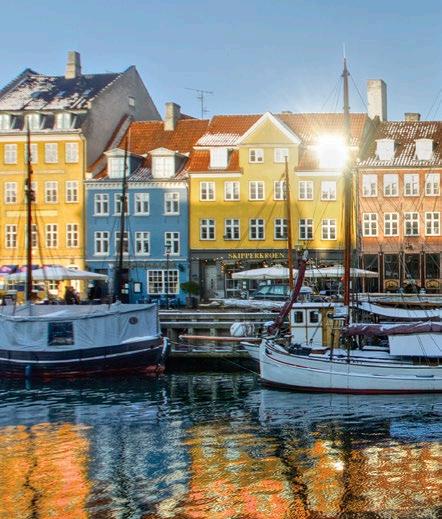
I was staying in an Airbnb, and rented a bike so I could cover more ground. One of the first places I visited was the Rundetaarn, or “round tower”, built in the 17th century as an astronomical observatory. It has an equestrian staircase (a wide set of stairs big enough for horses to use) that went on and on. As I was going up, I stopped to visit the tower’s library hall. At the top, there’s a glass platform that gives a view 80ft straight down, as well as a bell loft. Luckily, the views over Copenhagen from the top were well worth the climb.
After coming down, I hiked up to the Kastellet Fortress to see the famous Little Mermaid statue. Taking a photo with her was almost impossible with all the tourists crowding around—but sitting there and hearing the lapping waves of the deep blue Baltic Sea, waiting for the sun to set, was an unforgettable and calming experience.

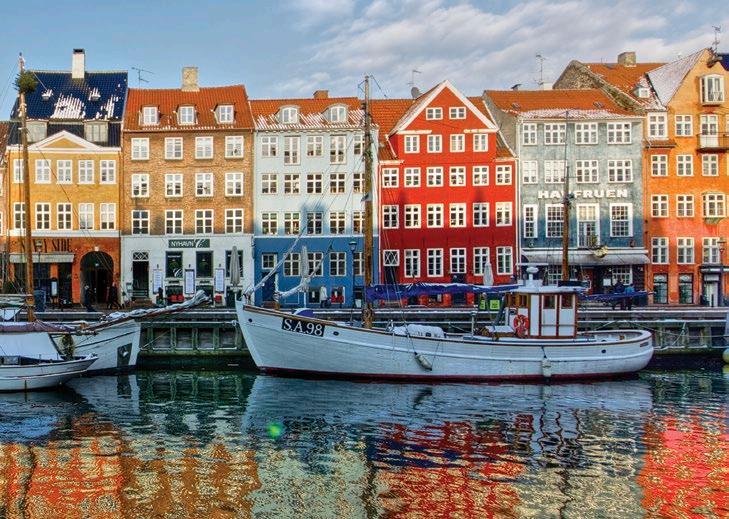
The next day, I visited the Glyptotek art museum, exploring the grand exhibits. I looked into the marble eyes of many Roman gods, and walked down dimly lit staircases to see mummies from Egypt.
Before I reluctantly boarded the train back to the airport, I told myself that I must visit again—to experience the thrills of Tivoli Gardens, try more of the street food (I loved the ristet hotdog, served with ketchup, mayonnaise and pickled cucumber) and everything else from this amazing city.
■ DISCOVER DENMARK’S CAPITAL
Flights to Copenhagen start from £32.18pp one way with easyJet, (easyjet.com).



TENNESSEE’S
CAPITAL
HAS GAINED WORLDWIDE recognition as the home of country music. This musical heritage is everywhere: visitors can walk down Honky Tonk Highway; enjoy a show at the Grand Ole Opry theatre; or visit the Country Music Hall of Fame and Museum. Culture buffs can also visit the Tennessee State Museum. Return flights start from £749pp with British Airways (ba.com). For more information visit visitmusiccity.com. Nashville Postcard

Things To Do This Month
LISBON IN TWO MINUTES
■ RELAX: PRAÇA DO COMÉRCIO Flanked by yolk-yellow Portuguese buildings, the Praça do Comércio is Lisbon’s most majestic square. Pull up a chair at one of the many cafés and watch daily life go past.
■ EAT: PASTEL DE NATA The historical neighbourhood of Belem is the birthplace of pastel de nata, the flaky egg custard tarts. Visit the rabbit warren-like, blue-andyellow bakery Pastéis de Belém for the best.
■ ESCAPE: SINTRA This surfy, mountainous resort town is a perfect Lisbon escape. A visit to the Moorish Sintra National Palace should be high on the agenda—as well as time to relax on its beaches.
TRAVEL APP OF THE MONTH

Luckytrip, Free, Android, iOS. This app generates onthe-spot itineraries that include flights, accommodation and activities in 300 cities across the world. Sorted.
SHORT/LONG HAUL: FOODIE HOLIDAYS
SHORT: The Black Forest Germany isn’t traditionally considered a foodie destination—but in the village of Baiersbronn are restaurants with eight Michelin stars between them. Enjoy artful dishes among the grand palaces of the region (baiersbronn.de).
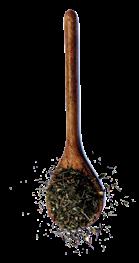
LONG: Nicaragua Learn how to make tortillas and handmade chocolate in lush, volcanic Nicaragua with this exciting Travel Local foodie tour. Also on the itinerary are coffee tours, cooking classes and local market visits. (travellocal.com).




































Daniel Miller had promised his wife, Saimaa, he’d never leave her. But could he stay alive until help arrived?
One Breath Away
BY HELEN SIGNYWHEN SAIMAA MILLER FIRST SET EYES ON her future husband, Daniel, she was attracted to his stoicism. A friend of her builder in Bondi outside of Sydney, Australia, he’d joined them for drinks the day his dog had died. He is the sort of man I’d like to be with, she thought. A few months later, she walked out of her Bondi naturopathy practice and he was standing outside, waiting for her. She knew at that moment he would be her partner for life.
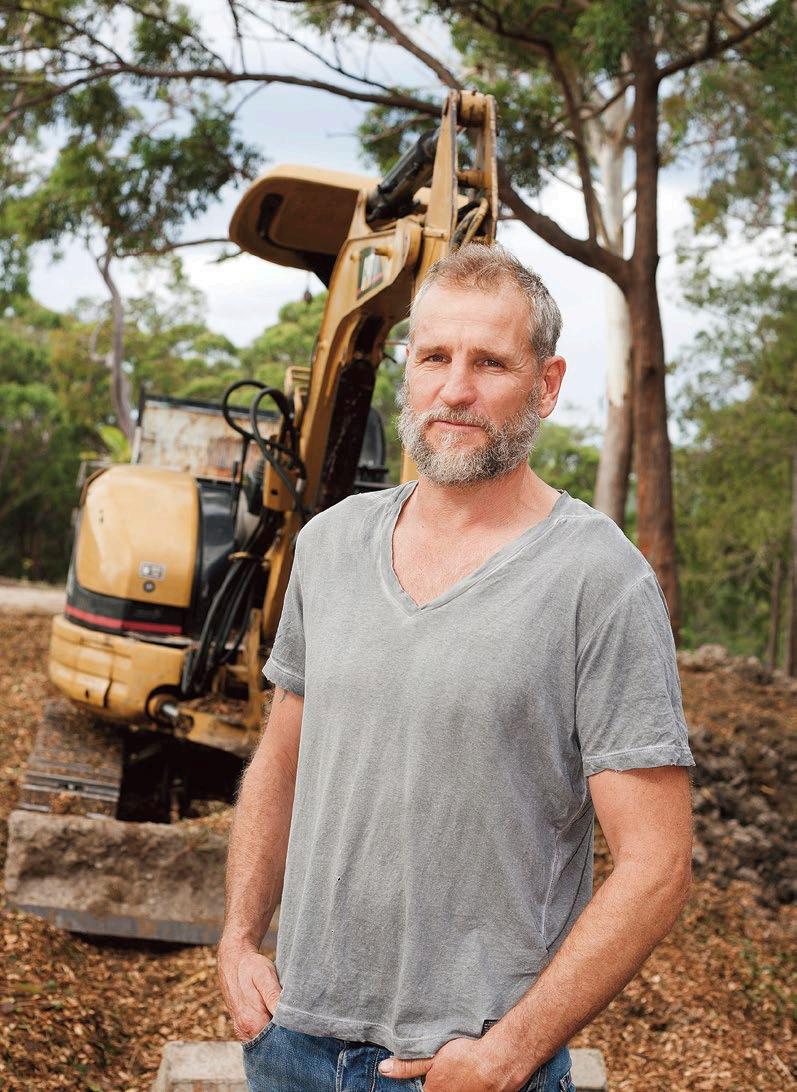
They soon moved in together and before long, in 2007, had found the perfect property in Charlotte Bay, on the New South Wales mid-north coast. Daniel, a qualified builder and landscaper, could develop the land into a yoga retreat and one day they could imagine their children running around its grassy paddocks.
“Don’t you die before me,” Saimaa would often joke. Her mother had passed away when she was just 13, and it was unimaginable that she could be left alone again.
“I promise,” Daniel replied.
Several years later and the dream had come true. Their children, Kalan and Leilani, were nine and four, and the family had made the property their permanent home, with Saimaa commuting three hours each week to see her clients at her Bondi clinic.
That’s where she was that day in February last year. With the children at day care and the school swimming carnival, Daniel, 45, thought he’d finish the landscaping around a dam about 150ft from the house. He’d been meaning to tidy up an old rock garden against the dam wall.
Using his three-ton mini-excavator, Daniel started to shift some of the larger boulders and plants. It hadn’t rained for a long time and the water in the dam on the other side of the wall was very low. He steered the excavator to the edge of the dam and lowered the bucket to drag out a load of mud.
Just then, the excavator started to slide with the weight. Used to working with heavy machinery, Daniel wasn’t alarmed when the excavator slipped in its tracks. He quickly lowered the bucket to the ground to act as a counterweight and stabilise the excavator. As he did this, the wall gave way and the excavator slid towards the water.
In sheer panic, Daniel pushed himself away from the machine to try to get clear of its weight. Man and machine crashed into the muddy floor of the dam, the excavator tipped onto its side and the roll bar landed on his back just below his shoulder blades. He was pinned down under the water.
“I’ve got to get out of here,” Daniel screamed to himself, pulling his body forward with all his might to try to get his head above water. He wriggled and squirmed until the roll bar was across his lower back, but he couldn’t get it past his buttocks.
Jamming his hands into the mud, Daniel arched his back and pushed as hard as he could until his head was above water. He then grabbed a full breath of glorious air. I can’t die first, was all he could think.
DANIEL WAS fortunate to have landed facing the dam wall, with his chest on a step where the water was only 20 inches deep. Towards the centre of the dam, his legs were floating in deeper water.
Still, he couldn’t move and 20 inches of liquid was plenty deep enough to drown in.
Daniel’s arm was wedged under his chest in a push-up position, similar to an upward dog in yoga. If he pushed himself up with all his strength, he could just get his chin out of the water.
He had to calm himself. A surfer for many years, he knew the only way to survive in the water was to slow down and think rationally. He pushed away the panic and began to think.
The excavator was still running, spewing hydraulic oil and diesel into the water. Eventually the oil would flood the engine and the noise would stop. Then who would notice?
to look for him; they would just send Kalan to after-school care, and the alarm wouldn’t be raised until after 6pm. It was the same with Leilani’s preschool. It was now just past 11:30am. That means I have to stay alive for six or more hours, he thought.
Mel might come home around 3pm. Could he hold on till then?
The weight of the roll bar didn’t seem to be evenly distributed along Daniel’s back and he didn’t feel like he was carrying the full weight of the excavator. That might mean he could dig himself out. As he propped up his body with one hand, he used the other to dig underneath his pelvis and legs, pushing the mud to the side.
AS PAINFUL AS IT WAS TO KEEP PUSHING HIMSELF HIGH ENOUGH TO BREATHE, THERE WAS NOTHING ELSE HE COULD DO
No one else was on the property. Saimaa was nearly 200 miles away in Sydney, and Mel, the next-door neighbour, about 2,000ft away, would be at the swimming carnival. He cursed himself for cancelling the guy who was supposed to come and mow the grass that day. Maybe he would turn up anyway? Were there any courier deliveries due? he wondered.
Most likely, the first people to miss him would be his son’s teachers when he didn’t show for school pick-up. They wouldn’t come to the property
It was a near-fatal mistake. The machine sank further as he dug, and Daniel realised with horror that now he could only manage to raise his eyes and nose above the waterline. If he used all his strength he could lift himself far enough up to clear his mouth, but he couldn’t do that for more than a few minutes at a time—it was too painful. He had to conserve energy. Daniel knew he could be here for a long, long time.
His options were simple. He could either fight or die. If he died, the carers at his daughter’s day care
would bring her home. They’d see the excavator overturned in the dam— perhaps his boots would be floating on the surface. He couldn’t let that happen. As excruciating as it was to keep pushing himself high enough to breathe, there was nothing else he could do.
Daniel wasn’t new to endurance. He’d done years of open ocean paddling. The trick was to chunk the pain into manageable blocks. To last in this position for six hours was unimaginable. But he could do it for 60 seconds. So he started to count.

He set his hands in one position, counted to 60 and waved one hand back and forth in the water to pass time and keep calm. At 55 seconds he’d allow himself the luxury of knowing there were only five seconds to go. Then he’d shift his weight into a different position and start again. It was like he was giving himself a break every minute.
As the engine finally sputtered and cut out it became very peaceful in the dam. With his ears submerged, all Daniel could hear was the rapid ticking of the machine. The sun shone on his head, his lips were at the waterline and he could see the oil and fluids floating on the surface. When debris came too close to his nose he’d
blow a bubble to gently push it away.
The counting worked. For more than an hour, Daniel watched a grasshopper walk up a blade of grass and down the other side. Letting his thoughts wander, he played out different scenarios of how someone might find him. He thought about the sump pump, less than 300ft away, that could drain the dam and save him. He willed different people to come, even trying telepathically to convince someone to pop in for a visit. Above all, he thought, Saimaa must not hear he was dead.
Saimaa had often nagged him about taking up yoga. He’d always insisted that after ten minutes he was bored. Now, his arched back was screaming and his arms were
PHOTO: CHANNEL NINEthrobbing. How long has someone stayed in an upward dog position before? he wondered. It was best not to think about the pain.
As the time dragged on and the excavator continued to slowly sink, Daniel felt a slow rising panic, made worse when he remembered that rain was forecast that day. Just 20 millimetres would be enough to kill him. He could fight for hours, but there were some things over which he had no control.
But there’s no use dwelling on them , he told himself. If he could stay calm and make good decisions, he would have a reasonable chance of staying alive.
At times emotions would well up and he’d laugh hysterically. Was he really going to die in the mud at the bottom of his own dam? But then he’d calm himself, breathe through his nose and get back to counting.
The engine continued to softly tick.
BY WHAT must have been around 2.30pm, staying alive had become almost robotic. Breathe, count, stay calm. Daniel’s ears were full of water and oil, and he could only just hear the engine ticking. He had no idea where the neighbours were, but he was getting tired. He would have to start calling for help. He’d give it another few blocks of 60 seconds and then have a go.
At the appointed time, Daniel
summoned all the strength he had left to push himself high enough out of the water to clear his mouth. He yelled at the top of his lungs for ten minutes. “Help, help, help!”
Shouting was exhausting. He stopped, full of adrenalin, bursting with anger. He struggled to free his pelvis, furious no-one could hear him.
Then, out of the corner of his eye, he caught a movement. He turned his head and, sure enough, he could make out his neighbour Mel’s blue sedan approaching along the driveway. He imagined her parking her car, getting out and looking around. He pushed himself up and yelled again. There she was, running around the corner with her phone in her hand.
That was when he knew. Thank God. You’re going to live, man.
Mel rushed down to the edge of the dam. “What do I do?” she cried.
Daniel pushed his mouth out again. “Ring Reg, get the neighbours!” he shouted, then resumed his position.
The nearest emergency services were 30 minutes away in Forster but Reg, another neighbour, was close by. Within minutes he arrived and jumped into the dam to hold Daniel’s head. Another neighbour who’d been alerted by Mel arrived and ran to fetch a snorkel from the house, but it was impossible for Daniel to breathe through it.
Mel used her phone to search for “What to do when someone is
trapped in a dam.” At the top of the list was the instruction that no one else should enter the dam—it was too unstable. Reg got out as other neighbours arrived.
On a nearby property, real estate agent Charles Degotardi’s pager went off. As captain of the local Rural Fire Service, he rang the station and was told someone in the area was trapped under an excavator in a dam, just up the road from the property he was now inspecting. He’s probably already dead, Charles thought.
There was no time to fetch the fire truck, so he phoned his senior deputy and drove around the corner to the Miller property. He was the first emergency services officer to arrive. He couldn’t believe the scene that greeted him. A bunch of people were gathered at the dam, all staring at Daniel’s nose and eyes sticking out of the brown water.
The local fire truck arrived within seven minutes. The absolute priority was to lower the water in the dam, so Charles and his colleagues grabbed the portable pump and set up the hoses over the side of the dam. As the pump kicked into action, they maneuvered the truck to the side of the dam and inserted a larger-volume pump as well.
Within a few minutes, the water level had dropped below Daniel’s nose and ears, and he could hear what was being said. Everyone was concerned about the excavator
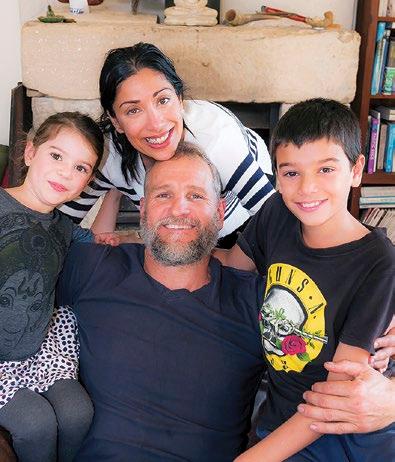
Back home with his family, Daniel says that his options were simple: he could either fight or die
moving and crushing him further. It had fallen onto a boulder, which was keeping it from sliding to the bottom of the dam. But with only a few centimetres to go, it was clear the three-ton excavator was about to slip off the large rock.
Police and ambulance began to arrive, followed by Fire and Rescue from Forster. Daniel watched them as they approached the edge of the dam one by one—the look of total disbelief on their faces that he was still alive.
As the water dropped, it became clear how incredibly lucky Daniel had been. Had the boulder not been there, he would have been crushed. As it was, he was pinned in soft mud,
PHOTO BY ARUNASyet miraculously, the full weight of the machine was not on him.
In a rescue operation that lasted more than an hour and a half, emergency services fixed a cable onto the boom of the excavator to stabilise the machine, and then winched it to lift the weight off Daniel.
By the time the water reached five centimetres above his pelvis the pumps were beginning to clog up with mud, but there was enough visibility to start digging Daniel out. They cleared the mud from underneath his legs then hauled him out by his shoulders.
Daniel was hypothermic, completely caked in mud and his lungs and ears were full of oil and diesel. But he was euphoric. He was alive.
SAIMAA WAS in Bondi seeing clients when she noticed a missed call from her neighbour Mel. I’ll call back later, she thought. Then another came from a second neighbour, Julie Henry. Something must be wrong.
“Something’s happened to Daniel,” Julie told Saimaa, who could tell by her voice that it was serious.
When she learned what had happened, Saimaa remained calm. Daniel had promised he wouldn’t die first. She knew he would be OK.
Saimaa called her mother-in-law and then spoke again with Julie Henry and her husband John. It was as if the whole community were working as one. The kids were picked up and taken to Mel’s, while Saimaa jumped in her car to meet her husband at their local hospital.
Daniel spent three days in the trauma ward. He had swelling in his back and an infection from the fluids he’d inhaled, but he was otherwise unharmed. His back pain lasted several weeks. Saimaa got her wish and he started yoga to help release the knots, and before long he was back to work and surfing.
Looking back, the Millers see that day as a positive experience. They were overwhelmed by the dedication of their local community and the emergency services.
“There is so much negativity in the world at the moment, but this was a story of believing in life and wanting to live,” says Saimaa. “It’s about people helping each other. It’s about mateship.”
GRAMMATICALLY FUNNY
Question: Why do words, phrases and punctuation keep ending up in court? Answer: To be sentenced.















A Spring Clean Could Boost Your Balance
Giving your home an annual clear-out could bring about more rewards than a cleaner living space…
BY ANDY WEBB
Andy Webb is a personal finance journalist and runs the awardwinning money blog Be Clever With Your Cash
IF YOU’RE A TRADITIONALIST, you’ll be thinking spring is the perfect time to deep clean your home. A top-tobottom tidy can be therapeutic, as can getting rid of anything you no longer need or use. But stop. Don’t just throw this stuff away.
You see, though it might be junk to you, it could be exactly what someone else is after. Selling online is easier than ever, and if you don’t fancy the likes of eBay there are plenty of places you can sell to directly. Even broken items could get snapped up for parts.
Alternatively you might uncover long forgotten items that are as good as new, meaning you don’t need to shell out for something similar. And if there’s something unopened and unused you could give it as a gift rather than buy something new. You could even see if friends would like to swap items, particularly clothes, with you—a great way to get a new look without spending money.
So as you take your duster and hoover to every corner and cupboard, take a moment to ask yourself the following questions. You might just be able to turn that clutter into cash.
1. Is it broken?
First things first, and sticking to the whole intention of a spring clean, there’s no point hoarding things that don’t work. Unless you are a dab hand with a soldering iron or a
sewing needle, ask if you’re ever likely to fix it yourself. If not, you’ve a few options.
See if you can pay to get it repaired, which might be cheaper than buying a replacement. If that isn’t on the cards, don’t immediately throw it away—you might be able to sell it. It’s been known for people to buy all sorts, whether for parts or projects. Apparently even cardboard toilet rolls are big sellers to be used for arts and crafts.
2. Do you need it and will you use it?
Assuming it’s not broken, audit everything to see if you actually need it. You might have a surplus of shoes, or more books than you’re ever going to re-read. If you identify your favourites that you don’t want to part with it’ll make it easier to pare down the rest.
Even if you think you do need to keep hold of something, will you actually use it?
From clothes in your wardrobe through to gadgets in the kitchen, if you’ve something that hasn’t been worn or used in a year it could be about time to say goodbye.
3. What could it be worth?
This is an important question as you don’t want to let something go for less than it’s worth. Do a little online research to see what things have previously sold for so you know how much to charge.
Any rare items, collections or antiques you have should be taken to experts or specialists who can assess a fair price.
At the same time, if it looks like you’d only get pennies for something, then the time it takes to sell might not be worth it. Instead try to recycle broken items at the tip, or donate working things to charity.

My Mum’s Money
Checking in on savings
WITH INTEREST RATES SO LOW it’s no surprise that cash ISAs (Individual Savings Accounts) aren’t as popular as they used to be. Fewer accounts are being opened each year, and less money saved in them as people take advantage of higher interest elsewhere.


bond. If you’re a higher rate taxpayer you can earn £500 tax-free.
But there are many, including my mum, who still have some cash stashed away in one of these accounts, and it’s around this time of year when she checks in on those savings. That’s because the new financial year, which begins April 6, coincides with the end of the fixedterm deal she has on her ISA.
She knows that when the fixed deal ends the rate will change to a standard variable rate of interest, which is likely to be low. Really low. So she’ll shop around to find the best rate going. And since basic rate taxpayers can earn £1,000 in interest tax-free on any savings account, it could well be in a current account or
If there’s not much difference between accounts, my mum has said she’ll probably keep the money in an ISA. But to move the money to the new ISA she won’t be withdrawing it. Instead she’ll find an ISA which accepts transfers in, and follow a transfer process. Do it this way and you won’t be restricted by the £20,000 annual ISA allowance.
Since fixed-rates tend to be better, my mum is likely to plump for this option again, though you should avoid this if you think you’re going to need to access your cash as you’ll usually pay a penalty. MY
The Salary Calculator
thesalarycalculator.co.uk
If you’re earning a salary or collecting your pension you’ll be paying income tax, and from April 6th the tax brackets will be increasing. In England, Wales and Northern Ireland you’ll pay zero tax on your first £11,850 earned, then 20% on income up to £46,350. Then it’s 40% on earnings up to £150,000.

Those numbers are all well and good, but they don’t tell you exactly how much tax you’ll pay. So I like to use a website called The Salary Calculator. You type in how much you’re going to earn, and you’ll see exactly how much you’ll pay in tax and also national insurance if you’re under State Pension age. To get even more accurate results you can add in extra factors too, such as your tax code, whether you live in Scotland and other deductions.
Loyalty Doesn’t Pay
£987: The annual cost of not switching energy, mobile, broadband, home insurance, mortgage and savings account. (Citizens Advice)
£24.99: The monthly cost of BT Broadband for new customers. (Feb 2018)
£42.99: The monthly cost of BT Broadband for existing customers. (Feb 2018)
5.5 million: The number of people who switched energy in 2017 to save money.
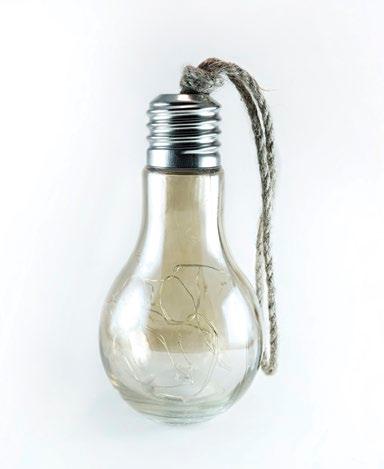
Easy-to-prepare meals and accompanying drinks
Springtime Salad
BY RACHEL WALKER
Rachel Walker is a food writer for numerous national publications. Visit rachel-walker.co.uk for more details
BRITISH ASPARAGUS IS NOW IN THE SUPERMARKETS and what better way to make the most of this short but glorious season than with this twist on a salad niçoise? Traditional recipes include green beans, but the bright, springtime taste of asparagus really lifts the dish. The trick is not to overcook the stems—they should still have some bite—and the same goes for tuna steak, which is best when it’s still hot pink in the centre.
Serves 4
• 12 new potatoes
• 4 eggs
• 2tbsp olive oil
• 400-500g fresh tuna
• 400g asparagus with the woody ends removed
• 120g black olives (pitted)
• 120g babyleaf herb salad
For the dressing:
• 1 shallot, finely chopped
• 1 tsp mustard (honey Dijon)
• 1 lime, juiced
• 4tbsp olive oil
• crusty bread, to serve
1. Boil the potatoes for 8–12 mins until they become tender. Remove them from the pan with a slotted spoon, cool under a stream of cold running water, and then set them aside.
2. Meanwhile, carefully lower the eggs into the pan of boiling water, and put on a timer for 6 or 7 minutes,
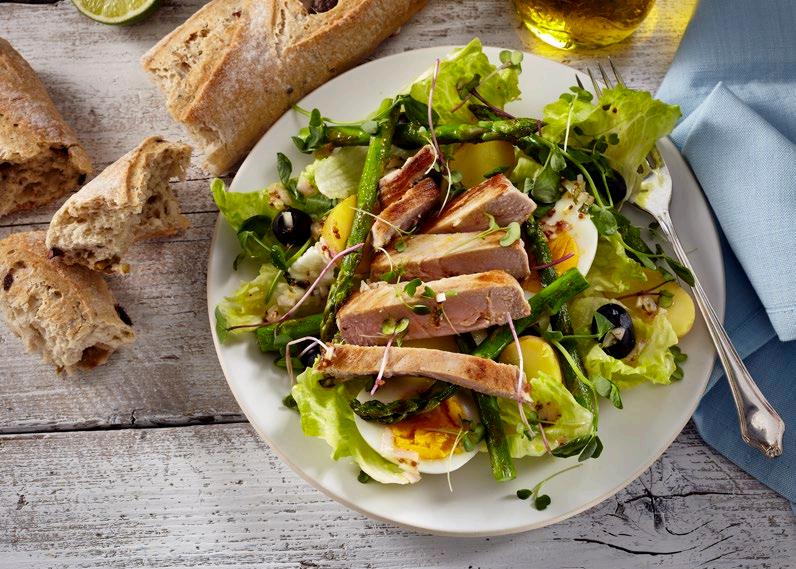
depending on whether you prefer a runny or hard yolk. Carefully remove the eggs from the pan using the slotted spoon, cool them under a stream of cold running water, peel and set aside.
minutes on either side. Place the tuna steaks on a board to rest.
5. Halve the potatoes and eggs, and put them in a mixing bowl along with the asparagus, olives and
BY TIM & ZOË HILL3. Drizzle the olive oil to taste over the tuna steaks and the asparagus, season with salt and toss to make sure they’re coated. Heat a griddle or frying pan until very hot. Pan fry the asparagus for 5 minutes, turning it so it takes on even colour.
4. Add the tuna to the pan, and sear for 2

TIP…
For convenience you can use tinned or smoked tuna (available from specialists like H Forman and Sons or The Fish Society) instead of fresh fish
Mix together the dressing ingredients and pour the mixture over the salad, then toss everything gently to make sure that it’s all evenly coated.
Pile the salad on a platter, and then cut the tuna steaks into slices and arrange it neatly on top. Serve your salad with crusty bread.
Brits Love Bubbles
“WRITE OFF PROSECCO AT YOUR PERIL!” warned experts in The Drinks Business magazine. “It’s the juggernaut that just keeps rolling.”
It’s no secret that the northern Italian sparkling wine has boomed in popularity—between 201314 British consumption doubled, making Britain the biggest market outside Italy. Our eagerness to switch Champagne for Prosecco had food trend forecasters on the edge of their seats, looking for the next big bubbles—Cava, Pignoletto, Lambrusco?
The fact is, nothing is close to knocking Prosecco off its perch. Our thirst for young, fresh, fruity fizz shows no side of abating. Instead of reining back, supermarket ranges are diversifying. This spring

POPULAR PROSECCOS
has seen Sainsbury’s launch an SO Organic Prosecco (1), while the success of Aldi’s Organic Prosecco (2) saw the supermarket promote it to part of their permanent core range. No surprise—the award-winning wine is a crowd-pleasing aperitif, with honeyed and applefresh notes.
Majestic have also added a new Prosecco, Villa Vincenta , to their range which is frothy and finessed, with notes of pear and honeysuckle. It represents fantastic value— particularly with the £4 price drop per bottle when buying a half-case. Perhaps the arrival of springtime is excuse enough to buy in bulk, stock-up for summertime, and celebrate the onset of warmer, fizzfriendly weather, by cracking open a bottle (or two) at Easter lunch.
1 SO Organic Prosecco, Sainsbury’s, £10, 11.5%
2 Organic Prosecco, Aldi, £7.99, 11.5%
3 Villa Vincenta Prosecco, Majestic, £11.99 (Mix Six £7.99), 11%




BOOK

Pudding of the Month
Prosecco Jellies
• 500g frozen summer berries
• 4 leaves gelatine to set (sets approx. 500ml of liquid)
• 125ml elderflower cordial
• 375ml (1/2 bottle) Prosecco
1. Divide the frozen summer berries between jelly moulds and refrigerate, to chill moulds and gently thaw out the fruit.
2. Meanwhile, soak the gelatine in water until soft. Squeeze out, place in a saucepan and pour over the elderflower cordial.
3. Heat gently, stirring continually until the gelatine dissolves, and then set aside to cool.
4. Stir the Prosecco into the cooled elderflower mixture, pour into moulds and refrigerate to set.
5. Run the moulds under a warm tap to help turn out jellies.
TIP: Adapt according to gelatine pack instructions and amounts.
Eat Up, by Ruby Tandoh (Serpent’s Tail), £12.99. A compelling memoir and common-sense food manifesto.
BARGAIN

Home meadow dinner plate, £4.25, Sainsbury’s. A beautiful spring update to transform the dinner table.
BLOW OUT

Pink Pansy Plate, £17.95, John Lewis.
Emma Bridgewater’s latest brings beautiful florals to the table.

Homes and gardens writer and stylist Cassie specialises in interior trends and new season shopping

Muted Pastels
WANT TO ADD
SOME COLOUR to your décor but don’t really know where you should start? Opt for subtle shades of sky blue, dusky pink and soft yellow for a calming combination. Support Burmese artisans and choose the Inya white rattan bowl, £42 (kalinko.com)


3
1

2
Draw attention upwards by hanging the Madeline pink LED pendant light, £150 (debenhams.com)

The Modena colour block frame in green features an on-trend marble finish, £20 (oliverbonas.com)
4
Team pastel accessories with soft grey furniture like the Malvern console table, £225 (next.co.uk)

Seasonal Update
Get one step ahead by preparing your garden for outdoor entertaining and giving your furniture a little TLC

With summer just around the corner, it’s time to get ready for the al fresco season ahead. Start by using Ronseal’s garden furniture cleaner (£9.97 for 750ml, diy.com) to remove the build-up of any moss, mould and algae from chairs, tables and benches. Treat wooden pieces using teak oil to protect the surface or give them a brand new look with a lick of paint. Try Cuprinol’s Garden Shades in Purple Pansy (£11 for 1L, wilko.com). Alternatively, splash out on a new set such as the Tiroli fourseater set (£1,499, dobbies.com); look out for extendable tables for larger families, or two-seater bistro sets for balconies or courtyards.


Voice recognition technology is all the rage, but is Apple’s latest offering a game changer?
Behind Homepod’s Hype
BY OLLY MANN
Olly is a technology expert, radio presenter and
podcasterAlexa, aka Amazon Echo (£89.99), has been the surprise hardware success of recent years. We were supposed to be splurging our cash on VR games and 3D TVs by now, but, as it turns out, we’d rather buy a speaker that can set a timer for our chicken soup and tell us when the next train departs to Paddington. Who knew?
Not Apple, it seems, who arrive late to the party with their smart speaker, Homepod (£320). They’ve justified their tardiness with a knockout design—a minimalist 360°casing that can somehow either blend into a traditional bookshelf or take pride of place in a home entertainment centre. Music sounds superb; noticeably clearer than comparable efforts from Sonos and Harmon Kardon, as Homepod analyses output in real time and automatically adjusts its settings for optimum equalisation.

The six inbuilt mics do a great job at listening for commands. Even when I’ve been standing on the other side of the room, with the telly on in the background, it’s never failed to hear me saying “Hey Siri” to get its attention. Then you can request any of the 40 million songs available on Apple Music (subscription, £9.99 per month).
But there’s the rub. It only really works within Apple’s proprietary universe. Setup is gobsmackingly easy, but only if you’ve got an iPhone or iPad. If you’re a customer of Spotify—a

superior service, in my view—you’ll have to transfer your playlists using an app like Songshift (free, pro version £3.99) to avoid shelling out twice.
Such constraints are most evident in the radio offering. You can request Apple’s own Beats1 pop station, of course, and their genre-based “radio stations” (which are really just fancy playlists)—but if you want to hear Chris Evans or The Today Programme over your cornflakes, forget it. Bizarrely, the only UK station Homepod offers is LBC—for all others, you need to open an app such as Radioplayer (free) on your iPhone, then beam it to Homepod via Airplay. Note, there’s no technological reason for this inconvenience:
Apple would simply prefer that you listen to Beats1. For a premium product, that’s poor.
Navigating podcasts is equally frustrating, as the most recent episode always plays first. So, “Hey Siri, play me Desert Island Discs” will only bring up a previous interview with director Christopher Nolan—but “play me the Sue Perkins episode of Desert Island Discs” will get you… um… that same previous interview with director Christopher Nolan.
Hopefully these limitations will be ironed out in future models. For now, if you’re an Apple devotee, and mainly listen to music, this is a visually and acoustically delightful device.


Georgina is a fashion and beauty editor for numerous travel titles and a blogger at withgeorgia.com
Banish Blemishes
SHOWER-PROOF, SWEAT-PROOF AND LIFEPROOF, the All Nighter Full-Coverage Concealer (£20, urbandecay.co.uk) from Urban Decay is the new handbag essential. The liquid concealer comes in 14 shades, all of which are highly pigmented, meaning that blemishes are easily covered. What’s fantastic about this product is that you can easily use it as both a concealer and a foundation, meaning you can replace chunky foundation bottles with this much more compact product. To use it both ways simply alter the way it’s applied. For direct coverage of blemishes tap a small amount of the product on to the area and continue tapping, using either your finger or a small brush, until it’s absorbed into your skin. For a flawless foundation effect, wet a sponge or beauty blender, squeeze out the excess and sweep the product across your skin. It’s a perfect way to go from a day to an evening look with just one product.

SATISFY THE ITCH
■ The sensation of itchiness, otherwise known as pruritus, is one of the most common dermatological complaints, affecting a third of the world’s population. To the rescue is Bioderma’s Atoderm SOS Spray (£14.50 for 200ml, Feelunique.com).

EYE FOR DETAIL
■ Alcohol, lack of sleep and dehydration are all linked to unsightly dark under-eye circles. Etherderm’s latest Lift and Repair Eye Contour Cream (£52, Feelunique.com) encourages blood flow to vessels under the eyes and reduces blue tones.

FRESH FASHION For Her

■ Add a spring to your step with these floral sneakers. (£49, monsoon.co.uk)
■ Introduce a little zest into your wardrobe with these cropped jeans. (£45, whitestuff. com)


■ Time to rock some fresh accessories. (£39.50, oliverbonas. com)
For Him

■ Feeling brave? Don a yellow jacket for a super-fresh look. (£65, debenhams.com)
■ Protect yourself from April showers with this pastel overcoat. (£150, houseoffraser.co.uk)


■ Off-white is a perfect way lighten up your wardrobe. (£32.50, whitestuff.com)
Historical and contemporary thrillers lead the fiction pack while the Sixties swings again in our pick of non-fiction paperbacks
April Fiction
BY JAMES WALTON
James writes and presents the BBC Radio
4 literary quiz
The Write Stuff
Pandora’s Boy
by Lindsey Davis (Hodder & Stoughton, £18.99)Lindsey Davis’s Ancient Roman whodunits have been such a well-loved part of the books scene for the past 30 years that it’s sometimes easy to forget what a strange mix they are. On the one hand, they’re unobtrusively packed with arresting details of first-century Roman life. On the other, they’re written in a cheerfully modern voice which is not only compulsively readable, but also reminds us that Ancient Romans didn’t think they were Ancient, but (like us) proudly considered themselves the most excitingly up-todate people the world had ever seen.

These days, the narrator and central character is Flavia Albia—adopted daughter of Davis’s original detective Falco, and, if anything, even more modern-sounding than her dad. (“There was more bling than at a boxer’s retirement benefit,” she remarks of one gathering here.) As ever, the plotting is beautifully done, complete with a Poirot-style denouement at the Temple of Salus. But the main crime story is just one of the pleasures on offer in this funny, gripping, informative and wildly enjoyable—if still quite bonkers—novel.
NAME THE AUTHOR
(Answer on p128)
Can you guess the writer from these clues (the fewer you need the better)?
1. The titles of his books are often
alliterative—and/or often feature a family member of some kind.
2. He was Britain’s biggest selling author of 2017.
3. He’s also an actor and comedian.

All the Beautiful Lies
by Peter Swanson (Faber, £12.99)
Although still some way from Lindsey-Davis status, Peter Swanson is a writer with a growing reputation for thrillers from the more thoughtful and literary end of the spectrum. His fourth novel begins with recent college graduate Harry returning to Maine where his father has fallen to his death from a clifftop in what duly prove to be suspicious circumstances. But while the police investigate, the book largely leaves them to it, concentrating instead on Harry’s uneasy relationship with his glamorous stepmother, who seems increasingly sinister once a series of flashbacks begin to fill in her rackety teenage past.
As other characters and their backstories are added, there’s no doubting the quality of Swanson’s writing—or his ability to create both psychological depth and a subtle sense of accidentally, and sometimes awkwardly, overlapping lives. Even so, I’d have some sympathy for any fans of more flatout thrillers who might wonder if all this is just a bit too subtle, with Swanson rather overdoing the slowburn approach. Admittedly, the unsettling atmosphere does eventually solidify into something properly twisty and thrilling—but maybe not before time.
PAPERBACKS
n A Life in the Day by Hunter Davies (Simon & Schuster, £8.99) The veteran journalist looks back on his days at The Sunday Times in its Sixties pomp, including his friendship with the Beatles—among many others.
n The Stars Are Fire by Anita Shreve (Abacus, £7.99) Another shrewd and absorbing novel about family life from the everreliable Shreve, this time set in post-war Washington.
n Long Road from Jarrow by Stuart Maconie (Ebury, £8.99)
The broadcaster—and warm, witty writer—retraces the steps of the 1936 protest march to London, comparing Britain then and now.
n Keep You Safe by Melissa Hill (HQ, £7.99) Bestselling Irish novelist thought-provokingly takes on the tricky issue of parents who refuse to vaccinate their children.
n Jane Austen at Home by Lucy Worsley (Hodder, £9.99) An illuminating and heartfelt examination of Austen’s life through the places she lived in, by the TV historian (pictured).

Anthony Ray Hinton was wrongly convicted of murder and spent 30 years on death row, where he learned an inspirational lesson RD’S RECOMMENDED READ
Life Beats Hate
IN JULY 1986, 29-YEAROLD ANTHONY RAY
HINTON WAS ARRESTED for the shooting of a restaurant owner in Alabama, and subsequently charged with the similar murders of two more. At the time of the shooting, in fact, he’d been working in a locked warehouse 15 miles away, with plenty of witnesses. But then the police found an old gun at his mother’s house that they decided was the murder weapon—and in court the only ballistics expert his state-assigned lawyer could afford was blind in one eye and unable to operate a microscope. Eventually, it did
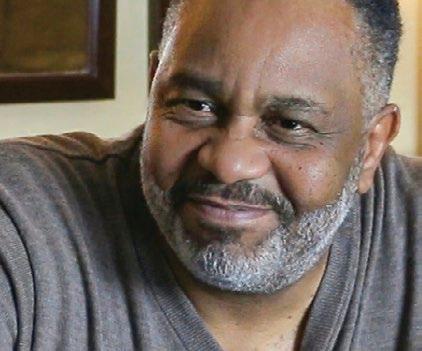
turn out that the gun evidence was false, but only after Hinton had spent almost 30 years in solitary confinement on death row.
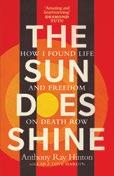
The Sun Does Shine: How I Found Life and Freedom on Death Row by Anthony Ray Hinton, with Lara Love Hardin, published by Rider Books at £16.99.
In this quite extraordinary book, he tells the whole horrifying story— and, although he comes across as extremely likeable (no mean feat in the circumstances) he never sugarcoats either his experiences or his reactions to them.
Perhaps not surprisingly, after the undisguised racism of his trial, Hinton spent his first few years in prison consumed with hatred—until
he realised that “hatred was a choice”, and one he didn’t want to make any more. Not, of course, that this made the process of clearing his name over nearly three decades any less agonising, or life on death row any less nightmarish.
The joy when he’s finally set free in 2015 is tempered by the knowledge that virtually all his adult life has been taken from him. “I would be a father, maybe even a grandfather by now,” he reflects.
But here’s the moment Hinton made that choice to reject hatred in favour of compassion—after hearing a man sobbing uncontrollably in a nearby cell…
Hey!’ I walked up to my cell door and yelled towards the crying man. ‘Are you all right over there?’
‘No,’ he finally answered.
‘Is there something wrong? Do you need me to call for an officer or something?’
I stood at the bars. I didn’t know what to say or do. It was weird to hear my own voice on the row. I wondered if the man was as surprised as I was to hear me speak. I guess he didn’t want to talk about it. I started to walk back to my bed, but then I thought about what he’d been saying when he was sobbing. ‘Please help me. I can’t take it any more.’
NAVIGATING FREEDOM
On his release, Hinton was picked up by his friend Lester, who’d dutifully visited him in prison every week while he was serving time…
“I climbed into Lester’s car and buckled my seat belt. It was the first time I had been in the front seat of a vehicle in 30 years.
He pulled out onto the street and drove toward the highway.
‘Take a right in 200 feet.’
I jumped in my seat. It was a woman’s voice, and I whipped my head around to look in the back seat. I didn’t see anybody. Where was she?
‘Turn right,’ the voice said again.
‘Where is she?’ I whispered to Lester.
‘Where is who?’
‘The white woman in the car telling you which way to go?’
Lester looked at me blankly for a second and then started to laugh. He laughed for at least two miles.
‘It’s GPS—the car’s navigation system. There’s no white woman hiding in the car, Ray, I can promise you.’
I obviously had a lot to learn.”
I walked back to the door. ‘Hey, man. Whatever it is, it’s going to be okay.’
I waited. It had to be another five minutes before he spoke.
my Bible. It had been under there for too long. This man had lost his mom, but I still had mine, and she wouldn’t care for my Bible to be collecting filth. Even here, I could still be me.
I can’t describe exactly what it is to have your heart break open, but in that moment, my heart broke
‘I just… I just got word… that my mom died.’
I could hear him trying to hold back the tears as he talked.
I can’t describe exactly what it is to have your heart break open, but in that moment, my heart broke wide open and I wasn’t a convicted killer on death row; I was Anthony Ray Hinton from Praco. I was my mama’s son.
‘I’m sorry, man. I really am.’
He didn’t say anything back, and then I heard a guy yell from down below me, ‘Sorry for your loss.’ And then another from the left side of me yelled, ‘Sorry, man. Rest in peace.’
I had a choice to reach out or to stay in the dark alone. I felt around through the dust and dirt under the bed until my fingers brushed against

AND THE NAME OF THE AUTHOR IS…
I walked back up to the cell door.
‘Listen!’ I yelled. ‘God may sit high, but he looks low. He’s looking down here in the pit. You’ve got to believe it.’ I had to believe it too.
I heard an ‘Amen!’ from somewhere on the row.
‘It’s a hard loss to bear. But your mom’s looking down on you too.’
‘I know. Thanks.’
I asked him to tell me about his mom and listened for the next two hours as he told story after story. His mom seemed a lot like my mom. Tough, but full of love.
He finished telling a story about her making a dress for his sister out of a tablecloth and two silk pillowcases just so she could go to a school dance. ‘It was beautiful,’ he said. ‘My sister looked better than any other girl at that dance because my mom worked hard. She always found a way, man. She always found a way.’
David Walliams, whose books include Awful Auntie and Grandpa’s GreatEscape ’’
He started crying again, but softer than he had at the beginning of the night.
Books
THAT CHANGED MY LIFE
Jess Phillips is the Labour MP for Birmingham Yardley and chair of the Women’s Parliamentary Labour Party. Her book, Everywoman,is published by Windmill.
The Secret Diary of Adrian Mole
BY SUE TOWNSENDI’ve read this at least once a year since I was ten. To begin with I identified entirely with Adrian; we both had holisticallyminded working-class families who were funny and hated Margaret Thatcher. Some might argue that I turned into Pandora Braithwaite, the love of Adrian’s life, because she became a Labour MP but, as I get older, I sympathise more with his mum. She was a bit of an absent mother but joined an organisation to champion the rights of women.
How To Be a Woman
BY CAITLIN MORAN

finish a cup of tea, let alone a book. But this was different and I inhaled every word. I recognised myself in Caitlin; growing up in the 1990s, boys being horrible, becoming a young mum. I’d always been a feminist but this made me want to get up and shout about stuff in a way that no other feminist literature had before.
Good Night Stories for Rebel Girls
BY ELENA FAVILLI AND FRANCESCA CAVALLO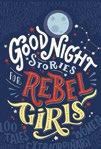
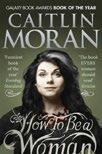
I guess I’m a bit of a sucker for women writers from the Midlands. When this came out in 2011, I was looking after my two young sons and could barely
I don’t often get to put my kids to bed but when I do, I really want to sit and talk with them. This is my younger son’s favourite book and, through our shared enjoyment of the stories of amazing women, he and I have wonderful conversations about bravery, adventure, intellectual study, politics and much more. We take it in turns to read one entry each every night we’re together. It’s the most precious time I spend with him.












ENJOY ON GO








Receive a welcome bonus of 500 coins when you join! Search ‘Reader’s Digest UK bingo’












TIME FOR NEW BEGINNINGS
step spring your in

Spring is a great time to meet new people — new beginnings are in the air and there are so many chances to get out and about, go to new places and try new things. Other people are thinking along the same lines – so the chances of meeting that special someone are pretty good.
Whether you’re looking for a long-term relationship, a fun-filled adventure, or just a companion with whom to share the day-today, Reader’s Digest Dating provides a safe and secure environment in which to meet like-minded people.
So, why not join up for free today? You never know, things just might fall perfectly into place. n
FOR MORE INFORMATION
readersdigestdating.co.uk
Reader’s Digest Dating is a safe and secure way to meet a like-minded companion. Specifically designed for singles over 40 who love life and want someone to share it with. It’s free to join and you can sign up in three simple steps.


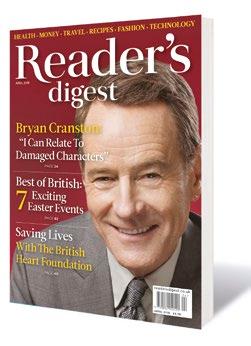
YES I want to subscribe to Reader’s Digest Magazine for just £3 for 3 issues (a saving of £8.37 on the shop price of £11.37 based on the cover price of £3.79 per issue). I understand that if I do not wish to continue receiving Reader’s Digest after my first 3 issues I can simply cancel my subscription by contacting customer services. If I do want to continue to subscribe after my first 3 issues I need do nothing and my subscription will automatically be renewed at the low rate of £7.50 for every 3 issues until I decide otherwise.
You Couldn’t Make It Up
Win £30 for your true, funny stories! Go to readersdigest. co.uk/contact-us or facebook.com/readersdigestuk
A LITTLE BOY IN MY CLASS had been unwell over the Easter weekend and so he hadn’t been able to go to church with his family.
His mother told me this story when he returned to school. When they got home on the Sunday, his sister was carrying a palm branch. Her son asked them where the palms came from so she’d explained that when Jesus walked by, people held palm branches over his head.
“Typical,” came her son’s reply. “The one time I’m too unwell to go to church, Jesus shows up.”
BETH WEBB, ClwydMY LOCAL SUPERMARKET had run out of carrier bags and began issuing 20p “bags for life” instead. This evidently upset the young chap at the front of the queue.
Pointing to the store’s logo printed on the bag he moaned that instead of paying 20p for the privilege of advertising their store they should be paying him.
Eventually he stormed off, leaving the rest us shaking our heads in

disbelief—emblazoned on the back of his tracksuit in letters six inches high was the word “ADIDAS”.
BRIAN ALDEN, BristolMANY YEARS AGO when my grandmother was 89, my husband and I decided to take her for a drive up through the Aberdare Valley in South Wales.
We were passing a particularly high mountain when I saw some
hang-gliders whirling around above us. I opened the car window and pointed upwards for my grandmother to see them.
She looked aghast and said, “Oh! What do they feed on?”
GILLIAN WILLIAMS, BridgendMY SON IS CURRENTLY going through a James Bond phase. Recently when we were out in town he spent the day feverishly racing around, dodging and eliminating imaginary bad guys.
Hungry for lunch I called, “Would you like to get pizza, sweetheart?”
He fired back, “Mum, don’t call me sweetheart when I’m on a mission!”
GRAZYNA SÖDERBOM, CoventryHAVING SUFFERED WITH insomnia for many years, I sought the advice of a sleep clinic and was given a hometesting kit to use overnight.
I duly applied all the sensors to my head, body and legs, wired them all into the recorder strapped to my chest, stuck the breathing tubes up my nose and, looking like Robocop, tried my best to get some shut-eye.
I returned the next day and waited for the results to come through but was told there was nothing conclusive to tell me as I “hadn’t slept for long enough.”
I suddenly felt very weary and my restless legs couldn’t get me out of there quick enough!
STUART GUTHRIE, London
MY BROTHER-IN-LAW, KEITH, has weight problems. Recently he was showing us his new diet book which featured lots of fish dishes. One he’d cooked the night before sounded rather bland to me and I told him so.
“Oh it was,” he retorted. “So I added double cream.”
JOANNE AITCH, WirralAN ELDERLY FRIEND recommended that I ask the chemist for euthanasia when I told them I had the flu.
Her friend nodded in agreement until I explained that I hoped they meant the herb echinacea! I’m glad they don’t write prescriptions.
JOANNE CAMPBELL, County AntrimMY YOUNGEST DAUGHTER was recently treated to a theatre trip with her best friend.
She sat in the back seat behind her friend’s dad who was driving. After several minutes spent studying the back of his head she turned to her friend and said, “My dad hasn’t got hair, he just has a head.”
JANE BIRKS, via emailMY NEIGHBOUR INFORMED me that he doesn’t waste his time shredding important documents like bank statements before putting them in the bin.
His advice? “Simply place a few dog poos in the bin bags along with your old bank statements.”
ELLE WEBBER, Cheshire
Word Power
This month we premiere an eclectic medley of musical terms—some classical, some modern and some slangy. If you’re missing a few beats, waltz over to the next page for answers.
BY EMILY COX & HENRY RATHVON1. clam n. —A: silent measure.
B: wrong note. C: set of maracas.
2. legato adv. —A: smoothly. B: quickly. C: loudly.
3. woodshed v.—A: serenade. B: drum loudly. C: practice an instrument.
4. busk v. —A: sing baritone. B: work as an accompanist. C: play in exchange for donations.
5. ska n. —A: hip-hop club.
B: microphone stand. C: style of Jamaican music.
6. nonet n. —A: ditty for kids.
B: composition for nine voices. C: unrehearsed performance.
7. pipes n. —A: singing voice.
B: tuba mouthpieces. C: emcees.
8. da capo adv. —A: from the top.
B: up-tempo. C: raised a half step.
9. beatboxer n. —A: band competition. B: vocal percussionist. C: instrument case.
10. barrelhouse n. —A: bass trombone. B: rhythmic style of jazz .
C: drumroll.
11. tonic n. —A: first tone of a scale.
B: counterpoint. C: harmony.
12. noodle v. —A: change key.
B: croon. C: improvise casually.
13. hook n.—A: stolen lyric.
B: saxophone line. C: catchy musical phrase.
14. skiffle n. —A: swing step.
B: music played and performd on rudimentary instruments. C: a particularly fast tempo.
15. earworm n. —A: bassoon.
B: tune that repeats in one’s head.
C: power chord.
Answers
1. clam—[B] wrong note. Emmett’s violin solo was going wonderfully— until he hit a clam.
2. legato—[A] smoothly. Lullabies should always be sung legato.
3. woodshed—[C] practice an instrument. If Lydia wants to make it to Carnegie Hall, she needs to woodshed a lot more often.
4. busk—[C] play for donations. I’m between gigs right now, unless you count busking in the park.
5. ska—[C] Jamaican music. Blake’s ska band is holding open auditions for horn players this weekend.
6. nonet—[B] composition for nine voices. Our singing group only perform nonets!
7. pipes—[A] singing voice. Brandon killed karaoke last night—who knew he had such great pipes?
8. da capo [A] from the top. The bandleader enjoyed bellowing to his musicians, “Take it from the top!”
9. beatboxer—[B] vocal percussionist. Marina is such an amazing
beatboxer that you’d swear there was a drummer in the room.
10. barrelhouse—[B] rhythmic style of jazz . Cynthia played an old barrelhouse tune on the piano.
11. tonic—[A] first tone of a scale. “This concerto is in C major, so the tonic is C,” the professor explained to his students.
12. noodle—[C] improvise casually. I was just noodling around on my guitar when I wrote this riff.
13. hook—[C] catchy musical phrase. The Beatles had an undeniable knack for melodic hooks .
14. skiffle—[B] music played on rudimentary instruments. Our family skiffle band features Mum on the kazoo, Dad on washboard, and Uncle John on slide whistle.
WORD OF THE DAY*
GINGLYFORM
Something hinge-shaped. Alternative suggestions:
“Where very posh ginger cows go to graze for the winter season.”
“The lesser known scientific name for a gingerbread man pastry cutter.”
15. earworm
[B] a tune that incessantly repeats in one’s head. That TV jingle has become my latest earworm , and it’s driving me crazy!
VOCABULARY RATINGS
9 & below: roadie
10–12: soloist
13–15: maestro














● Up to TEN TIMES more light on your page than a traditional 60w lament bulb
● Recommended by over 400 quali ed opticians
● Delivered fully assembled
● 5 year guarantee

By the time you reach 60 your eyes need 3 TIMES as much light to see as clearly as they did when you were 20. Introducing the Serious Readers HD Light.
As you age, less light reaches the retina and it’s this that transmits the visual image to the brain. So whether you wear glasses or not, reading for any length of time can become a struggle without the right amount and type of light.
Conventional reading lights just aren’t powerful enough and provide a poor quality of light. Our top of the range High De nition Light has been specially designed to closely mirror the same spectrum of light waves as daylight. It’s this that gives it its superb clarity and colour rendition transforming your ability to read in comfort once more.
Try risk free for 30 days

For advice or to request a brochure Call Free 0800 085 1088 or visit seriousreaders.com/5052 Special Offer
Purchase a Serious Light and get a FREE Serious Compact Light worth £150. Quote Promotion Code 5052 when ordering by phone or online.

Brainteasers
Challenge yourself by solving these puzzles, then check your answers on p155
METEOR SHOWERS BRING SPRING FLOWERS
Space dust has landed on earth, carrying with it seeds for exotic new alien flowers. One of them still lacks a name. If the xenobotanists follow the same rules they used to create the other terms, what should they call the last flower?
ASPERFILIUM NEPTUGORII
ASPERCHRYST JUPICALTAE
COSMODENDRA URANOGORII
BELSACHRYST MARBRISTO
BELSAFILIUM URANOCALTAE
MATCH GAME
There are five squares in the figure to the right: the large external one and four smaller internal ones. What’s the lowest number of matchsticks you could remove to leave two squares, with no leftover matchsticks that don’t form part of a square?
The numbers in the second grid have a specific relationship to those in the first one. What numbers would you place in the third grid in order to continue the pattern?
1-2-3 GO
In the diagram below, fill in the missing junctions to draw a single, continuous loop that follows each line segment once and only once. As you move along, every corner and every junction you pass is the beginning of a new segment. The loop must trace segments in numerical order; that is, “1, 2, 3, 1, 2, 3...” Each junction can be filled in one of three ways:
Here’s an example of a completed loop:
£50 PRIZE QUESTION
METEOR SHOWERS BRING SPRING FLOWERS
Cosmofilium jupibristo. The first half of the top term tells the colour of the flower’s centre; the last half is the petal colour. The first half of the bottom term tells the shape of the flower’s centre; the last half is the shape of the petals.
MATCH GAME
Two. The remaining internal square could be placed as shown or in any of the other three positions.
NUMBER GENERATOR
Consider the three numbers in each row to be a single three-digit number. Doubling that number generates the three-digit number that goes into the corresponding row of the next grid.
Answer published in the May issue
It’s possible to divide this square into four equally shaped parts of nine smaller squares, each containing two different numbers and two different shapes. Can you do it?
2
The first correct answer we pick in March wins £50!* Email excerpts@ readersdigest.co.uk
ANSWER TO MARCH’S PRIZE QUESTION
AND THE £50 GOES TO… Uri Steinberg, Manchester
Laugh!
Win £30 for every reader’s joke we publish! Go to readersdigest. co.uk/contact-us or facebook.com/readersdigestuk
FACEBOOK. WHERE A FRIEND is just an enemy you haven’t argued about the right thing with yet.
COMEDIAN KEITH BERGMANI’M WRITING A NOVEL about a serial killer who kills on either the second, third, fifth, seventh, 11th, 13th, 17th, 19th, 23rd, 29th or 31st of each month.
It’s called prime suspect.
COMEDIAN STEVE HALLIGANLIFE’S A BEACH
MY GIRLFRIEND REALLY changed after she became a vegan.
It’s like I’ve never seen herbivore.
SEEN ONLINE
A MAN GOES INTO a barber’s for a shave. While the barber is lathering him, the man mentions the problems he has getting a close shave around the cheeks.
“I have just the thing,” says the barber taking a small wooden ball
...is how many years Marcio Mizael Matolias, known locally as “King Marcio”, has lived in a sandcastle on one of Brazil’s upscale beaches. He told reporters, “People pay exorbitant rents to live in front of the sea, I don’t have bills and I have a good life here.”

from a nearby drawer. “Just place this between your cheek and gum.”
The client places the ball in his mouth and, lo and behold, the barber proceeds with the closest shave the man has ever experienced.
After a few strokes, the client asks in garbled speech, “And what if I swallow the ball?”
“No problem,” says the barber. “Just bring it back tomorrow like everyone else does.”
GRAHAME JONES, London
TWO PSYCHICS PASS each other on the street.
One says to the other, “You’re doing fine, how am I?”
SEEN ON FACEBOOK
APPARENTLY YOU CAN’T safely use the words “beef stew” as your computer password.
Experts say it’s not stroganoff.
SEEN ON REDDIT
MY FRIEND BOUGHT a dog from his local blacksmith last week.
As soon as they got home it made a bolt for the door.
TRACY DAVIDSON, Warwickshire
WHY DO COMMUNISTS only drink cups of coffee?
Because all proper tea is theft.
SEEN ONLINE
UNCLE BEN HAS DIED. No more Mr Rice Guy. COMEDIAN TIM VINE
HAVING A HOOT
Photographer Tanja Brandt captures the unusual friendship between two of her pets (via sadanduseless.com).




HORROR FILMS WITH jump scares are like if a comedian went into the audience, tickled everyone and said, “Technically you laughed so technically I’m funny!”
COMEDIAN JEREMY KAPLOWITZ
WHAT WOULD YOU DO IF you cracked an egg for breakfast and a mouse came out and then time froze, and God came down and said to forget what you saw or else?
I’d tell everyone but I’d make it seem like a joke.
COMEDIAN JAMES ETCHISON
I THINK ANCESTRY.COM is missing out by only advertising to families. Their ads should say, “Do you have a friend called Keith who claims that he’s 100 per cent Italian? Well,
thanks to ancestry.com you can take Keith down a peg or two and prove what a weak little Swede he is.”
COMEDIAN GEOFFREY ASMUS
I BOUGHT A WOODEN whistle but it wooden whistle.
So I bought a steel whistle. But it steel wooden whistle.
Then I bought a lead whistle. But it steel wooden lead me whistle.
SEEN ON TWITTER
WHY IS PETER PAN always flying?
Because he Neverlands.
SEEN ONLINE
MY HUSBAND ALWAYS gets upset when I steal his cooking utensils. But it’s a whisk I’m willing to take.
SEEN ON PINTEREST
DRIVING ME CRAZY
The people of Twitter share stories of the worst cars they’ve ever owned:
@JazzHands77: “The cassette in the tape deck would speed up when the car sped up and slow down when the car slowed down.”
@_AshyJean: “None of the windows worked so I had to order my food at drive thrus by sticking my head out of the sun roof.”
@MGotez58: “My ‘84 Chevette would leak when it rained. Instead of fixing it, my dad drilled holes in the floor so the water could drain.”
CROSSWORD ANSWERS
60-Second Stand-Up
We chatted to stand-up storyteller,
WHAT’S YOUR FAVOURITE OF YOUR OWN JOKES?
It’s basically a huge rant about how much I hate slow-cookers. I can’t believe it’s 2018 and people are still cooking in cauldrons.
WHAT’S YOUR MOST MEMORABLE HECKLE EXPERIENCE?
In January I was telling a story and I got the year wrong. A man shouted, “IT’S 2018”, and I’ll never forget the absolute fury in his voice. He must make diaries for a living or something.
WHAT’S THE BEST PART OF YOUR CURRENT SET?
I don’t want to give it away but there’s a bit where I trick the audience. You see some people in the crowd feeling genuinely betrayed. They’re laughing and clapping but some of them are also furious, and it’s really fun to get that different sort of reaction.
WHO INSPIRES YOUR COMEDY?
When I was a boy my dad used to say, “One day, when you’re old enough, you and I will watch Billy Connolly,” so I had him teased to me for years. When I finally watched him I was blown away by the way he had the crowd hanging on his every word.

HAVE YOU FOUND SOME PARTS OF THE COUNTRY TO BE FUNNIER THAN OTHERS?
For any comedian, your home town gigs are your best gigs. Unless you’re in some kind of witness protection programme, that is…
IF YOU WERE A FLY ON THE WALL, WHOSE WALL WOULD YOU BE ON?
I would come back to when my house was built in the 1970s. I don’t know what on earth they were thinking, it’s like a Bond villain’s lair.
Get tickets to the Just Happy to Get Out of the House Tour at chrisramseycomedy.com
Beat the Cartoonist!
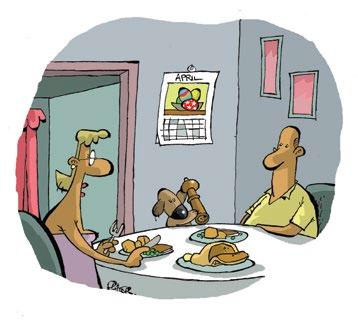
Think of a witty caption for this cartoon—the three best suggestions, along with the cartoonist’s original, will be posted on our website in midApril. If your entry gets the most votes, you’ll win £100.
Submit to captions@readersdigest.co.uk or online at readersdigest.co.uk/caption by April 9. We’ll announce the winner in our June issue.
February’s Winner

Your entries had our cartoonist’s characters fighting like cats and dogs. But despite your best efforts, our cartoonist has finally caught a break and ended his losing streak as his caption, “Do we have an exit strategy?”, was a favourite with our voters, recieving an incredible 100 per cent of the vote. Let’s not let him get too complacent—get your captions in for our April cartoon to give him a run for his money.
IN THE MAY ISSUE

Beat the Burglars
The inside secrets to burglary-proofing your home
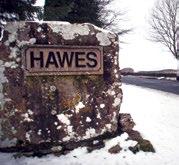
The Village That Refused to Die
How one village kept its community alive
Plus
• Best of British: Farmer’s Markets
• I Remember: Andrew Lloyd Webber
You’ve got a story to tell. With Lulu’s publishing tools, you can take the next step and turn your story into a book. Sharing your story has never been easier with Lulu's easy to use publishing, print and selling tools.
Indie publish your story today! Visit lulu.com to get started.
To sweeten the deal, Lulu is offering a voucher for 10% off any print product! Just use the code RDAPRIL at Lulu.com to find your next inspirational story or order some copies of your own masterpiece!
Voucher code RDAPRIL 10% Off order of print products. One use per customer. Cannot be combined with other offers. Expires 31 December 2018.













At Oak Tree, we think everyone should be free to enjoy a rich and ful lling life. With our top-quality adjustable chairs and beds, we have already helped thousands to do exactly that.

*Half price o er valid on all second items. Half price item must be of the same value or less than your chosen item and must be ordered at the same time. O er ends 30th April 2018.
** Trade-in o er cannot be used to purchase any stock items.
